This is Essential Politics, our daily look at California political and government news. Here’s what we’re watching right now:
- California Atty. Gen. Xavier Becerra said Wednesday that he intends to open a satellite attorney general’s office in Washington, D.C., as he prepares to fight the Trump administration.
- The results from California’s latest cap-and-trade auction are in, and revenue from the sale of pollution credits was weak.
- A bill that would set up a state-funded legal aid system for immigrants will be amended by its author to allow those with criminal records to apply for assistance.
Be sure to follow us on Twitter for more, or subscribe to our free daily newsletter and the California Politics Podcast
- Share via
Former President George W. Bush says his recent remarks have been misconstrued as criticism of Trump
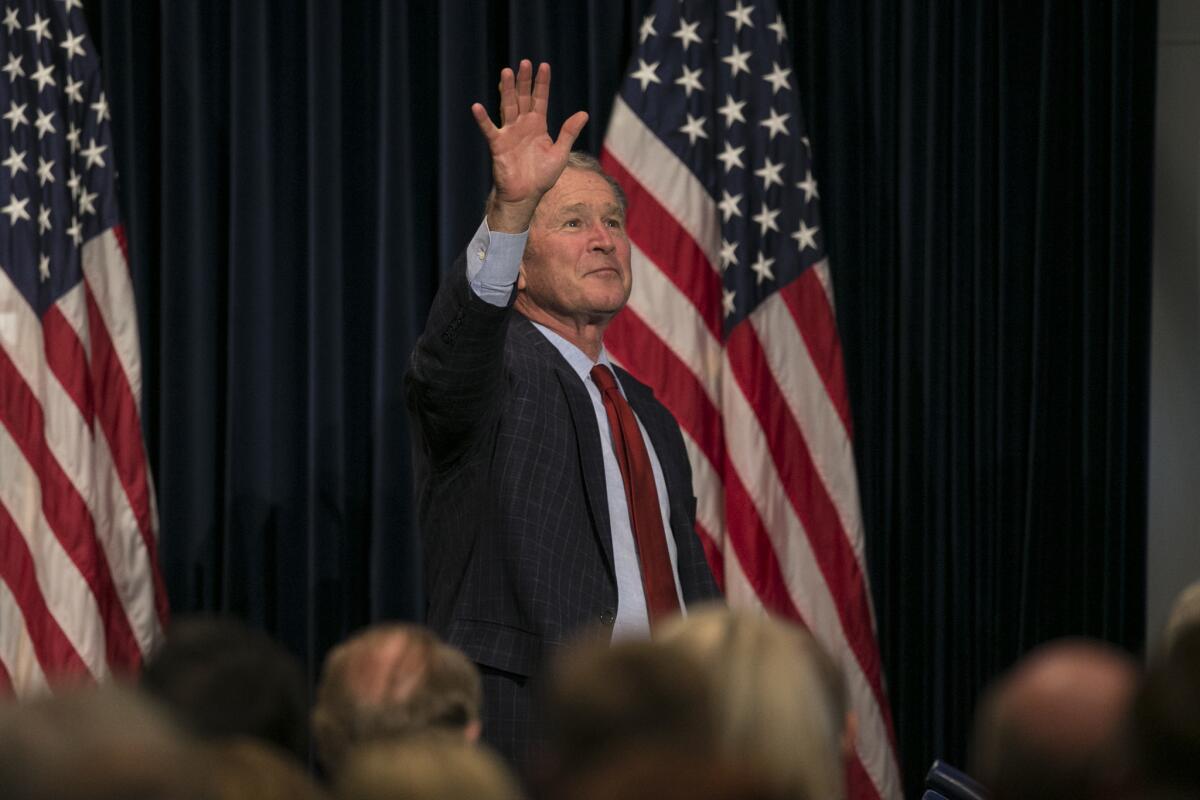
Former President George W. Bush on Wednesday pushed back at the notion that his recent remarks about the media were criticisms of President Trump.
“I’m asked the question, ‘Do I believe in free press?’ and the answer is absolutely, I believe in free press … because the press holds people to account,” he said. “Power is very addictive and it’s corrosive if it becomes central to your life and therefore there needs to be an independent group of people who hold you to account. And so I answered that question and of course the headlines were, ‘Bush criticizes Trump.’ And so therefore I needed to say, ‘There should be a free and independent press, but it ought to be accurate.’”
Bush made the remarks at the Reagan Presidential Library in Simi Valley during an hourlong question-and-answer session promoting “Portraits of Courage,” his new book that features his paintings of veterans. While doing media interviews about the book in recent days, he has raised eyebrows by making comments about the media, immigrants and allegations of Russian interference in the November presidential election that were widely viewed as criticisms of the new president.
He said that he decided once he left the office not to second-guess his successor, former President Obama, and that the same holds true for Trump. Doing so would undermine the office, Bush said, adding that he wants all of his successors to succeed because it is good for the nation.
“I don’t want to make the president’s job worse, no matter what political party it is. It’s a hard job,” Bush said. “Sometimes my remarks can be construed as criticism. They’re certainly not meant to be, and after I finish this book tour you probably won’t hear from me for a while.”
But he was willing to offer advice to those who follow him.
“Know what you don’t know and find people who do know what you don’t know and listen to them,” he said. “My advice is that the job is different once you get in. It looks one way and then you get in the Oval Office and it looks different. Trust me.”
Bush also made an implicit criticism of Obama’s foreign policy when asked whether the world is more dangerous than it was four years ago.
“This may be taken as criticism of one of my successors and I don’t really mean it to be. There is a lesson however when the United States decides not to take the lead and withdraw,” he said. “Vacuums can be created when U.S. presence recedes and that vacuum is generally filed with people who don’t share the ideology, the same sense of human rights and human dignity and freedom that we do.”

Aside from a handful of serious moments, Bush was jovial and self-effacing as he described how he became an oil painter after leaving the White House. Seeking ways to fill his time, he said he read an essay by Winston Churchill about painting.
“I basically said, ‘What the hell, this guy can paint, I can paint,’” Bush said.
He hired an instructor and started painting a cube and a watermelon before moving on to portraits. Former First Lady Laura Bush was not pleased with his depiction of her, so when he painted his mother, former First Lady Barbara Bush, he decided to depict her from behind.
Barbara Bush and former President George H.W. Bush are doing well despite their recent hospitalizations, the younger Bush said.
“They’re both great given their limitations. Dad can’t walk, he’s confined to a wheelchair and yet his spirit is joyful,” Bush said. “… Mom’s doing fine. She’s shrinking, and as she does, her voice gets louder. But she’s a, she’s a piece of work is what she is.”
Bush has been reclusive since leaving office, but said he wrote the book and is publicizing it to raise money for veterans and to draw attention to the “invisible wounds” many of them suffer.
“I think when you read [their stories] you’ll be moved by stories of courage, injury, recovery willingness to help others,” he said. “… I’ve got a platform – it’s not as big as it once was — and I intend to use it to help our veterans for the rest of my life, and this is one way to do so.”
- Share via
California legislative leaders deluged with gifts, including foreign trips, sports tickets and liquor
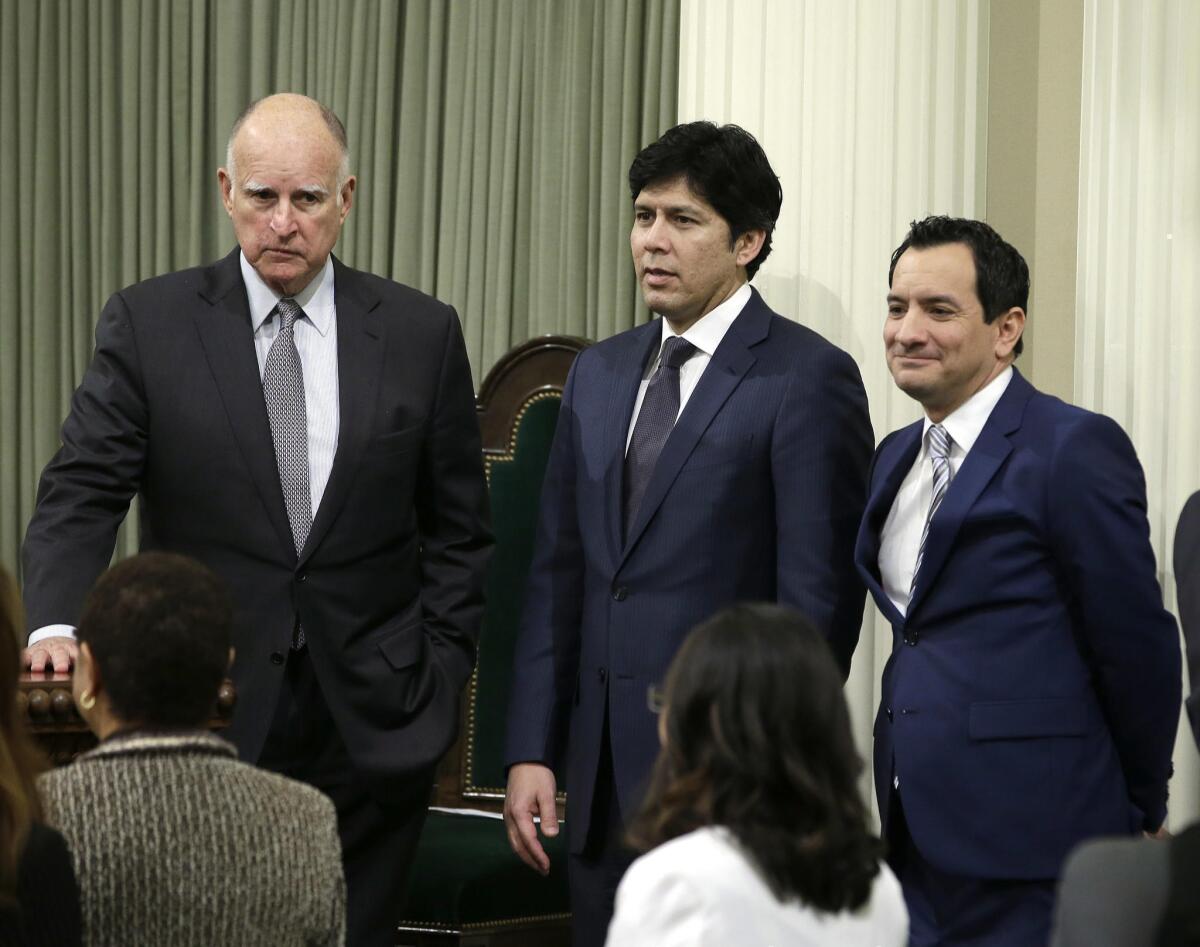
The California Legislature’s four top leaders accepted $60,000 in gifts last year, including sports tickets, expensive meals, golf games and travel to foreign countries, according the annual reports they were required to file Wednesday.
Senate leader Kevin de León (D-Los Angeles) accepted 60 gifts worth $24,381, the largest amount of the four lawmakers, including travel expenses to Morocco, El Salvador, Mexico and Puerto Rico.
He received $3,100 in expenses at the Pebble Beach golf resort from the Assn. of California Life and Health Insurance Cos. and the Governor’s Cup Foundation in exchange for speeches. He also accepted free tickets to SeaWorld, the Monterey Bay Aquarium and a soccer game at the Rose Bowl. The gifts were topped off with a $50 cigar from the Sacramento County Labor Council.
Assembly Republican leader Chad Mayes of Yucca Valley reported accepting gifts worth $19,955, including dinners, a game ticket from the San Francisco 49ers and $880 in golf games, half of it provided by the state prison guards union.
Mayes’ biggest gift was $11,077 in travel expenses for a study trip to Germany and the Czech Republic paid for by the California Foundation on the Environment and the Economy, a San Francisco think tank financed by interests including PG&E, Shell, the Alliance of Automobile Manufacturers, the State Building and Construction Trades Council, Tesoro and Chevron Corp.
Assembly Speaker Anthony Rendon (D-Paramount) accepted 63 gifts valued at $12,949. The biggest was $5,680 in travel expenses to China paid for by the Chinese People’s Assn. for Friendship with Foreign Countries.
Rendon also received about $1,000 in art from Assembly staffers and a $68 bottle of scotch.
Senate Republican leader Jean Fuller of Bakersfield reported 29 gifts worth $2,942, including $763 in travel expenses from the California Independent Petroleum Assn. to speak at a conference in Newport Beach.
- Share via
‘You need to speak out’: Former President George W. Bush says he has been urged to raise his voice
- Share via
A Sacramento Kings ticket and a trip to Yale were among $4,500 in gifts Gov. Jerry Brown accepted last year
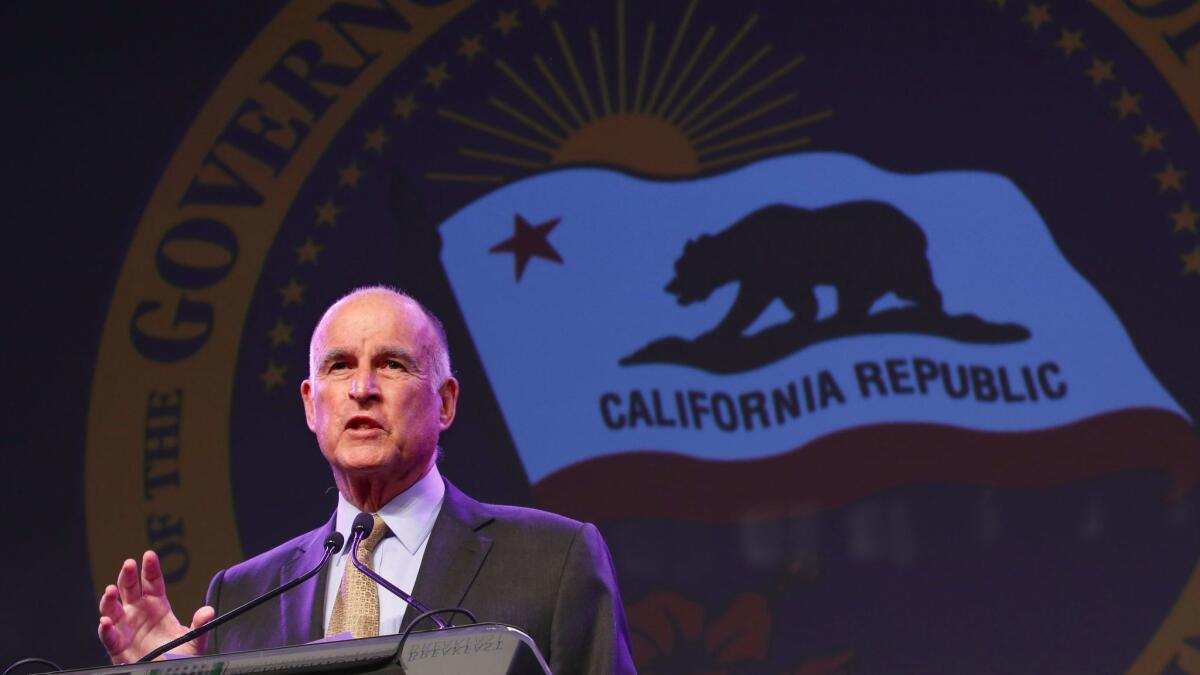
Gov. Jerry Brown accepted 27 gifts worth about $4,500 last year, including dinners and travel expenses, a cellphone, bottles of wine and a ticket to a basketball game from the Sacramento Kings, according to his annual filing of an economic interest form.
The amount is down significantly from 2015, when Brown accepted gifts valued at $22,136, including money from the California State Protocol Foundation to attend a climate change conference in Paris.
Last year’s biggest gift was $1,883 in travel expenses from his alma mater, Yale Law School, for a speech he gave at the New Haven, Conn., institution during reunion week. The event included him receiving the school’s prestigious Award of Merit.
Other travel expenses were provided by groups for speeches he gave in Santa Rosa and Mount Shasta. Brown also reported receiving dinners valued at $100 each from the U.S. State Department and United Nations.
He also received $191 worth of wine from Sen. Bill Dodd (D-Napa). The $299 cellphone was given to him by Yueting Jia, the founder of internet firm LeEco of San Jose. That would have run afoul of legislation vetoed in 2014 by Brown that would have reduced the value of gifts that could be accepted by an elected official from a single source in a year from $440 to $200.
It also would have banned gifts from lobbyists and lobbying firms to the governor and legislators, and barred officials from accepting many kinds of gifts, including tickets to professional sports contests, entertainment events and amusement parks, as well as free golf games and entertainment.
Brown also reported selling some large investments last year. He sold stock worth between $100,000 and $1 million in Health Fusion Inc., a medical office software company. He sold stock with the same value range in Edgewater Park Plaza, a development firm.
- Share via
California’s secretary of state and attorney general criticize federal decision to shift course on Texas voter ID law
- Share via
State Senate Republicans begin discussing transition of leadership, but some are reluctant to take on the job
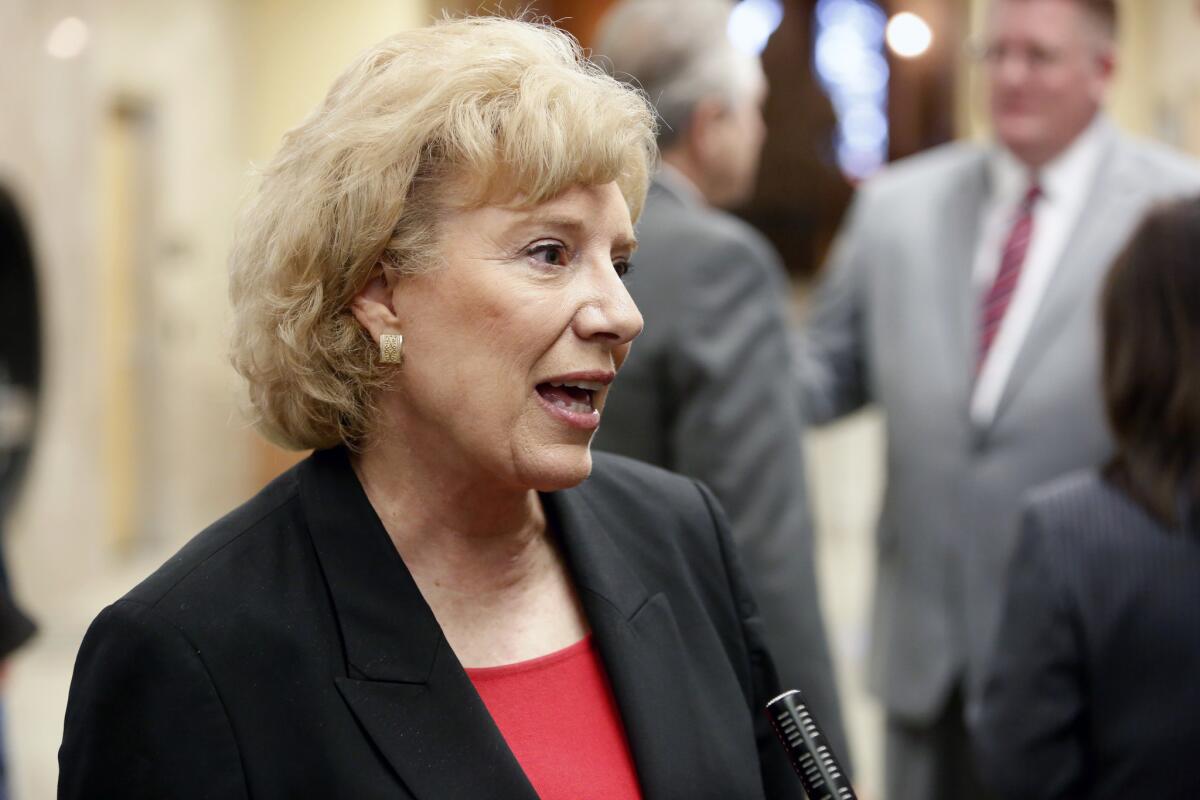
Senate Republican Leader Jean Fuller of Bakersfield has begun talking to colleagues about eventually stepping down and passing the torch to another member given that she is termed out of office next year, but so far nobody has publicly agreed to take over the job, officials say.
An attempt by the 13-member Senate Republican Caucus to discuss a possible transition Tuesday was interrupted by a fire alarm drill, so the subject was put off at least until the next weekly caucus meeting, March 7.
“[Fuller] has been calling all of us to say, ‘Hey, are you interested,’” Sen. John Moorlach (R-Costa Mesa) said. “The question is, who is willing to take it and when do we do it?”
Fuller declined to comment on the issue, saying “It is the custom and practice to respect the members of the caucus and the discussions that we have.”
Sen. Patricia Bates (R-Laguna Niguel) has been approached about the job by colleagues because term limits will not force her out of office until 2022, but she declined comment on Wednesday.
“Sen. Bates said that it would not be appropriate for her to comment at this time,” said Ronald Ongtoaboc, her spokesman.
Sen. Ted Gaines (R-Rocklin) is among those not interested in becoming the leader, a representative said. Moorlach is in the same boat.
“Who wants that job? I’ve got other things to do. It’s a busy job,” Moorlach said. “I was a business major, not a poli-sci major.”
The job is made more challenging by the fact that Democrats hold two-thirds majorities in both houses, meaning Republicans are no longer in a position to alone block major actions including tax increases.
- Share via
Only a few drips of cash expected from cap-and-trade auction
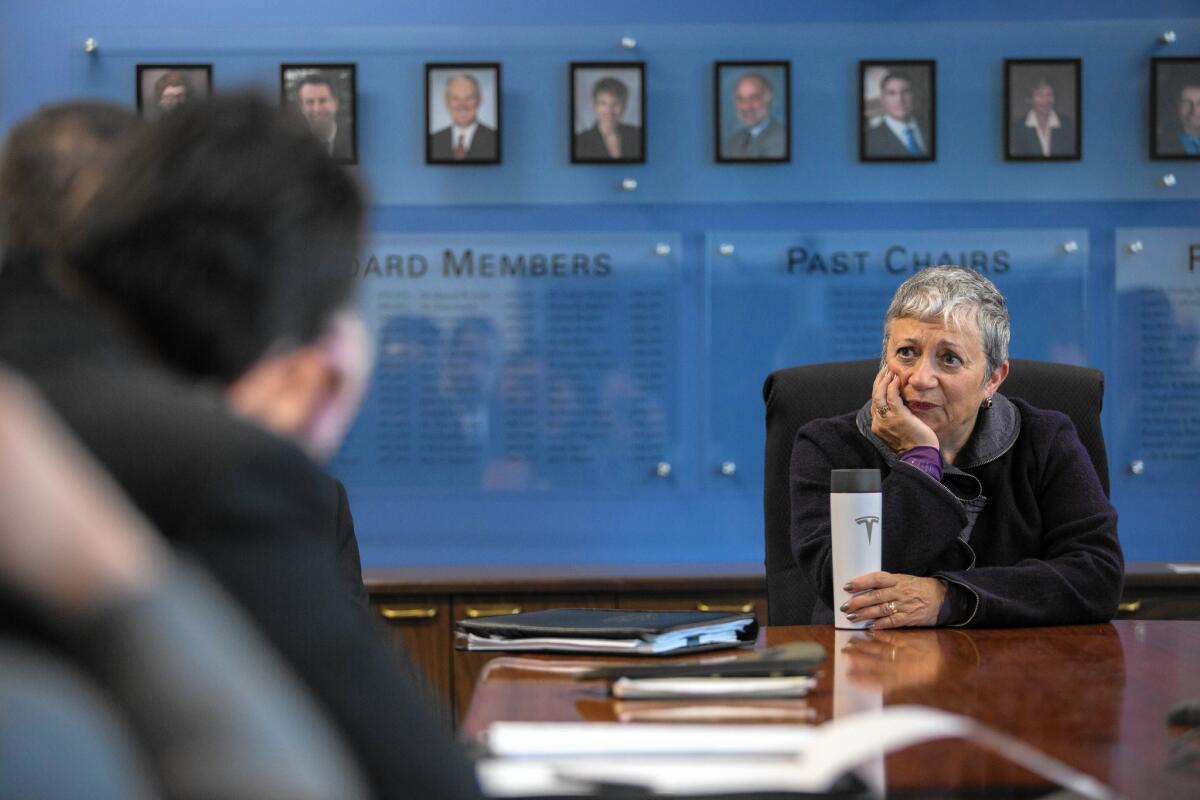
California’s cap-and-trade program limped through another weak auction of pollution permits last month, according to results provided by state regulators Wednesday.
Demand for the permits, which are required to release greenhouse gas emissions into the atmosphere, has fluctuated over the last year amid questions about the program’s long-term viability.
A state appeals court is expected to rule soon on whether cap and trade represents an unconstitutional tax, and lawmakers are debating whether they should ensure the program continues past 2020.
Final details on the latest auction have not been released, but the summary of results posted Wednesday indicates that revenue likely will be only about $8 million. Less than 20% of the permits offered through the auction were claimed.
That’s a drop from the two previous auctions, which saw higher demand, and roughly equivalent to the May 2016 auction.
Regulators insist that generating revenue is not the goal of the cap-and-trade program. But among lawmakers, the money has been in high demand to fund transit projects and other initiatives. Gov. Jerry Brown also is counting on the program to help finance the bullet train from Los Angeles to San Francisco.
Senate leader Kevin de León (D-Los Angeles) said he’s looking forward to working more on cap and trade and questioned whether it was delivering on its goals.
“The program is not producing stable revenues for important priorities like increased transit and other clean transportation investments,” he said in a statement. “According to California Environmental Protection Agency, it may not even be achieving pollution reduction in disadvantaged communities, when that should be our utmost priority.”
Chris Busch, who tracks the cap-and-trade market for environmental firm Energy Innovation, said the results announced Wednesday were surprising.
“It’s going to take some more unpacking to really understand them,” he said.
Busch expects demand to pick up in the coming months and years because more permits will be needed to cover the state’s economic activity.
- Share via
Immigrants with criminal records would be eligible to apply for services under changes to legal defense bill
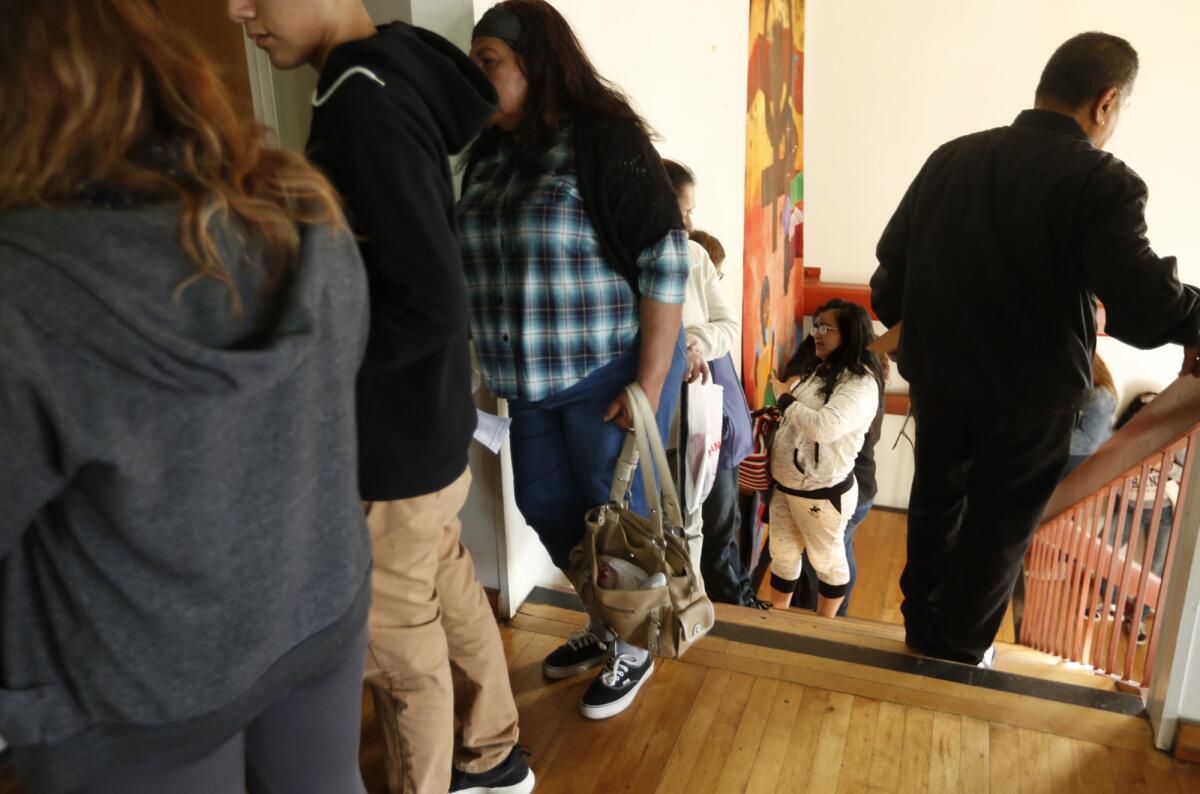
A state senator plans to amend a bill that would create a legal defense program for immigrants, making all people facing deportation in California eligible to apply for services regardless of criminal background.
Immigrant advocates and legal aid agencies have lauded the compromise, which they said would counter anti-immigrant rhetoric from the Trump administration associating illegal immigration with violent crime.
But it remains to be seen how moderate Democrats and Republicans, who have argued against using taxpayer funds to defend dangerous offenders, will accept the move.
The bill, introduced by state Sen. Ben Hueso (D-San Diego), would require the California Department of Social Services to contract with local nonprofits to provide lawyers for immigrants caught in deportation or removal proceedings. It also would create a trust to accept private and philanthropic donations to cover legal aid.
From its inception, lawmakers have debated over who should benefit from the state-funded initiative as California faces a budget deficit and potential cuts to federal funding.
Hueso initially sought to provide counsel to all immigrants. But before the bill’s first hearing in January, he amended it to exclude services for all those convicted of a violent felony under the state penal code.
Hueso’s office is now considering an amendment that would make all immigrants eligible for screening. But it would prohibit representation of clients convicted of a violent crime unless they have “a meritorious claim for relief from deportation,” meaning the person has a high likelihood of not being removed from the U.S. based on the facts of the case.
The change is being weighed because immigrants in some cases have been convicted of crimes they did not commit.
At a hearing Wednesday before the state Senate Judiciary Committee, representatives from several legal service groups said they were rescinding their opposition to the legislation based on the coming amendments.
Everyone in the U.S. is entitled to due process, or fair treatment under the law, regardless of legal status, lawyers told the committee. And “the consequences in removal proceedings are just as dire... in some instances more so than in a criminal context,” said Raha Jorjani, an immigration lawyer with the Alameda County public defender’s office.
- Share via
To curb opioid epidemic, California bill would tax painkillers to fund treatment

As concerns mount over prescription drug abuse, a California legislator wants to impose a tax on addictive opioid medications and use the funds to expand prevention and rehabilitation services.
Assemblyman Kevin McCarty (D-Sacramento) has introduced a bill that would impose a one-cent-per-milligram surcharge on prescription opioids sold in California. The tax would be imposed on wholesalers who import the medication into the state, not at the point of sale, and it would require a two-thirds approval vote in the Legislature.
“California’s opioid epidemic has cost state taxpayers millions and the lives of too many of our sons and daughters,” McCarty said in a statement. “We must do more to help these individuals find hope and sobriety. This plan will provide counties with critical resources needed to curb the deadly cycle of opioid and heroin addiction in California.”
McCarty’s office estimates the surcharge would raise tens of millions for county drug treatment programs.
The measure, AB 1512, is not the only proposal offered by lawmakers this year to combat the growing problem of prescription drug abuse, which is closely linked to an explosion of heroin use.
State Sen. Anthony Portantino (D-La Cañada Flintridge) is carrying a bill that would prohibit prescriptions of the painkiller oxycodone for anyone under 21, in an effort to quash opiate addiction among young people.
- Share via
California Atty. Gen. Xavier Becerra to set up a Washington office as he prepares to fight Trump administration
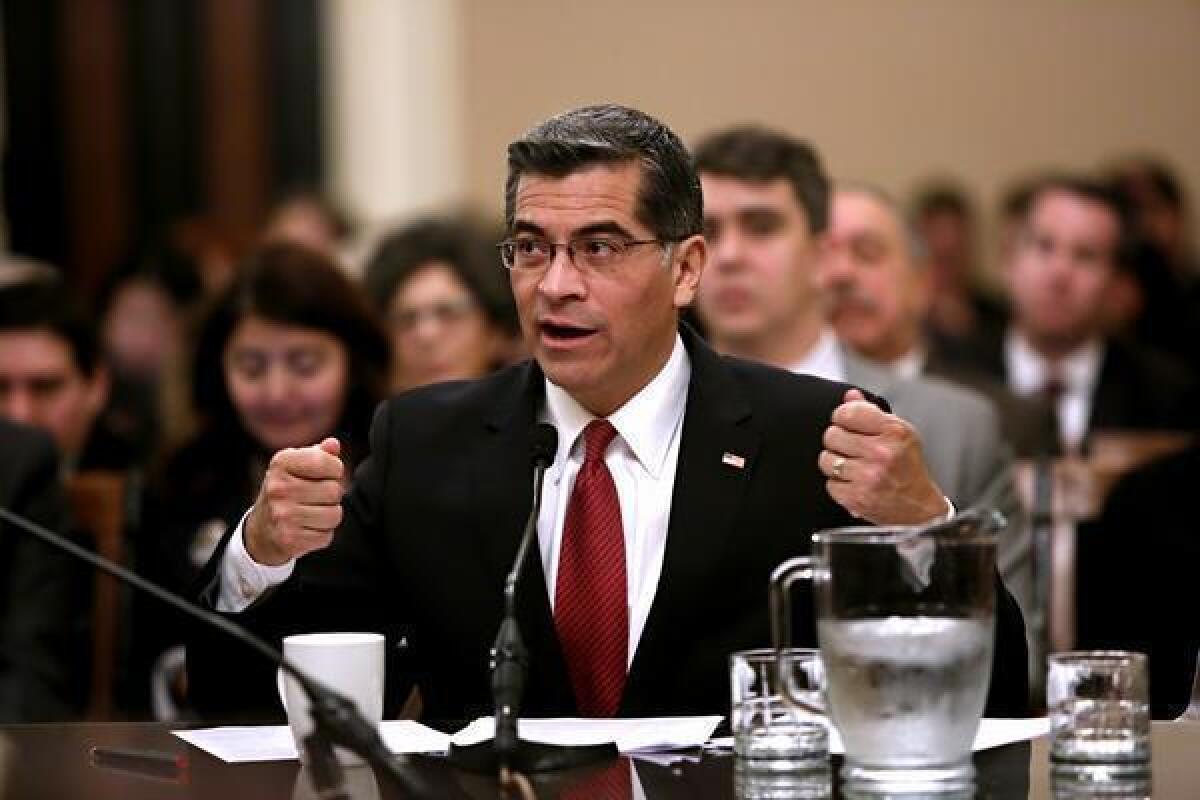
California Atty. Gen. Xavier Becerra said Wednesday that he is setting up an office in Washington, an unusual move for a state attorney general. Opening the new office is reflective of the fact that much of his attention will be devoted to Trump administration actions that might conflict with California policies, Becerra said.
Becerra, who has already filed three amicus briefings in lawsuits challenging Trump immigration orders, said the office will help him collaborate with members of California’s congressional delegation on policies that affect the Golden State.
“Decisions that are going to affect California are going to be played out in Washington, D.C., and I think it’s important for my office to have a presence here,” Becerra said.
The state attorney general said he has hired Alejandro Perez, a former legislative affairs director for the Obama administration, to run the Washington office. It will be located in existing office space maintained by the California governor’s office.
Becerra’s predecessor, Kamala Harris, did not operate an office of the state Department of Justice in the nation’s capital, officials said.
Meanwhile, in their first face-to-face meeting since he became California’s attorney general, Becerra has told U.S. Atty. Gen. Jeff Sessions that the federal immigration crackdown can hurt public safety by making the immigrant community less willing to report crimes and cooperate with law enforcement.
Becerra said Wednesday that he was one of nearly 50 state and territorial attorneys general who met the day before with Sessions in a hotel ballroom during the winter meeting of the National Assn. of Attorneys General in Washington.
“I mentioned that in order for us to do our public safety [work], that you can’t really do it from Washington, D.C., and to continue to go after the folks who are committing crimes -- you’ve got to give people in the community a sense that law enforcement, locally or federally, is there to work with them,” Becerra said.
“I asked him if he would consider the fact that when people are panicked and are not willing to approach any law enforcement because of what they are hearing about the immigration actions that it makes it more difficult to protect public safety for everyone,” Becerra added.
Sessions responded that he has heard that argument before and that federal law enforcement does need to be careful not to undermine local law enforcement, Becerra recalled.
“He went on to say that they are going to do what they need to do to try to enforce immigration law to get people off the streets,” Becerra said of Sessions.
Becerra was also part of a large delegation of state attorneys general who went to the White House on Tuesday to meet briefly with President Trump, but said he and the president did not exchange words.
The attorney general noted he did not participate in a photograph of the attorneys general with the president, but declined to say why.
Updated 4:24 pm: This post was updated with information that the new attorney general’s office will be located in building space already maintained by the governor in Washington, D.C.
- Share via
Former President George W. Bush to speak in Simi Valley tonight after recent criticism of Trump

Former President George W. Bush’s speech Wednesday evening at the Ronald Reagan Presidential Library in Simi Valley is billed as a discussion of his new book featuring his paintings honoring members of the military and veterans he became close to after leaving office. But all ears will be listening for whether the former president speaks out about President Trump.
Though Bush painstakingly avoided criticizing former President Barack Obama, his Democratic successor, after leaving office in 2009, he has raised eyebrows in recent days with remarks viewed as barbs aimed at Trump, a fellow Republican.
While promoting his book, “Portraits of Courage: A Commander in Chief’s Tribute to America’s Warriors,” Bush has spoken out about the importance of the media, immigrants and investigating allegations of Russian interference in the November presidential election.
“I think we all need answers” about the claims of Russian influence, Bush said Monday on NBC’s “Today” show.
Days after Trump’s administration banned several media outlets including the Los Angeles Times from a briefing, Bush also called the free press “indispensable to democracy.”
“We need an independent media to hold people like me to account,” Bush said, adding that when he was president, he tried to impress the importance of a free press upon Russian President Vladimir Putin.
Bush, 70, also told People magazine that he was displeased by the current political tone in the country.
“I don’t like the racism and I don’t like the name-calling and I don’t like the people feeling alienated,” he said in the magazine, which goes on sale Friday. “Nobody likes that.”
Bush was immediately slammed by conservative outlets.
“Bush undercuts Trump a month into presidency after staying silent on Obama for 8 years,” read a Monday headline in the Washington Times.
The fraternity of living American presidents is small, leading to relationships that can cross party lines.
Bush and his wife Laura attended Trump’s inauguration in January, though his representatives said that neither voted for the GOP nominee. Bush’s brother Jeb, the former Florida governor, ran for the GOP presidential nomination against Trump and tangled with the billionaire, who labeled him “low-energy.”
Bush’s relationship with Obama is unclear, but pictures earlier this year of him and former First Lady Michelle Obama warmly embracing at the opening of the Smithsonian’s National Museum of African American History and Culture were widely circulated on social media. His father, former President George H.W. Bush, has a famously warm relationship with former President Bill Clinton, who unseated the elder Bush in 1992.
George W. Bush has largely eschewed the public limelight since leaving office, instead picking up the hobby of painting.
But he has made exceptions for promoting causes that are important to him, notably veterans. Tickets for Bush’s speech about “Portraits of Courage” are sold out.
Proceeds from the book, which contains 66 portraits and a mural Bush painted of soldiers who served in the U.S. armed forces during the conflicts in Iraq and Afghanistan, will benefit groups that help veterans.
- Share via
California’s statewide politicians pan Trump’s speech in real time, but Gov. Jerry Brown stays silent
Top Democratic officeholders in California gave unsurprisingly negative reviews of President Trump’s first speech to Congress.
Here’s a sampling of the live-tweeted comebacks from statewide officeholders:
Absent from the insta-commentary was the Democrat at the very top of California’s political hierarchy: Gov. Jerry Brown. His Twitter feed had no immediate mention of the president’s speech.
- Share via
California legislators react to Trump’s prime-time speech with a predictable split by party
California lawmakers were quick to react through social media to President Trump’s speech to a joint session of Congress.
Assembly Speaker Anthony Rendon (D-Paramount) and Senate President pro Tem Kevin de León (D-Los Angeles) wrote a number of tweets critical of both Trump’s tone and his policy proposals.
De León took issue, in particular, with the president’s comments on changes to the nation’s immigration system that would end what he called the “current system of lower-skilled immigration.”
Republicans praised the speech. Assemblywoman Melissa Melendez (R-Lake Elsinore) applauded promises on education, healthcare and illegal immigration.
Assemblyman Joaquin Arambula (D-Fresno), an emergency medicine physician, disagreed with the president’s pledge to repeal the Affordable Care Act.
Others retweeted various items related to the speech, from news organization fact-checking efforts to excerpts provided by the White House.
- Share via
California Atty. Gen. Xavier Becerra misses photo op with President Trump
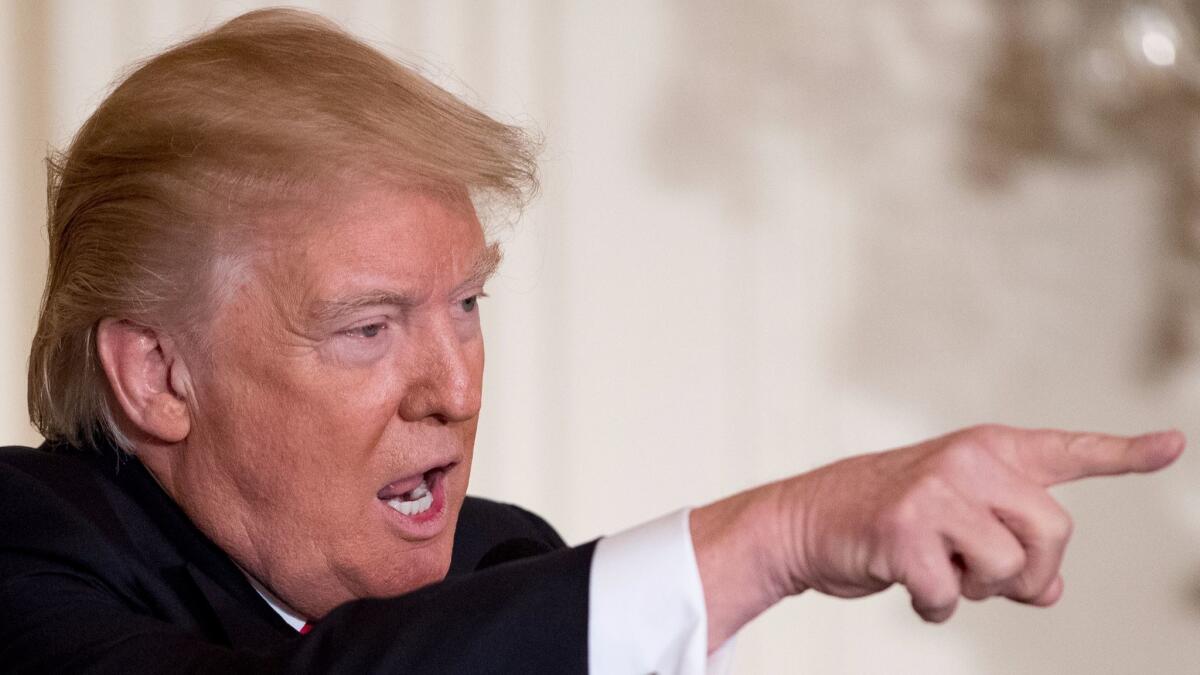
After weeks of criticizing President Trump over his travel ban, California Atty. Gen. Xavier Becerra was noticeably absent Tuesday when two dozen state attorneys general posed for a photo with Trump at the White House.
Becerra was in Washington with 47 counterparts from other states for the winter meeting of the National Assn. of Attorneys General, where the elected officials were set to discuss healthcare fraud, abuse and waste.
Trump stood on a riser with some 24 attorneys general for the photo in the East Room, according to a pool report.
Representatives for Becerra did not return emails and phone calls seeking information on whether he was invited or decided to skip the event.
“Some great people, some great people,” Trump said during the photo session.
Florida Atty. Gen. Pam Bondi, who was standing to his left, responded: “Thank you, Mr. President.”
- Share via
The ‘Bernie vote’ is split in the race to replace Xavier Becerra in Congress
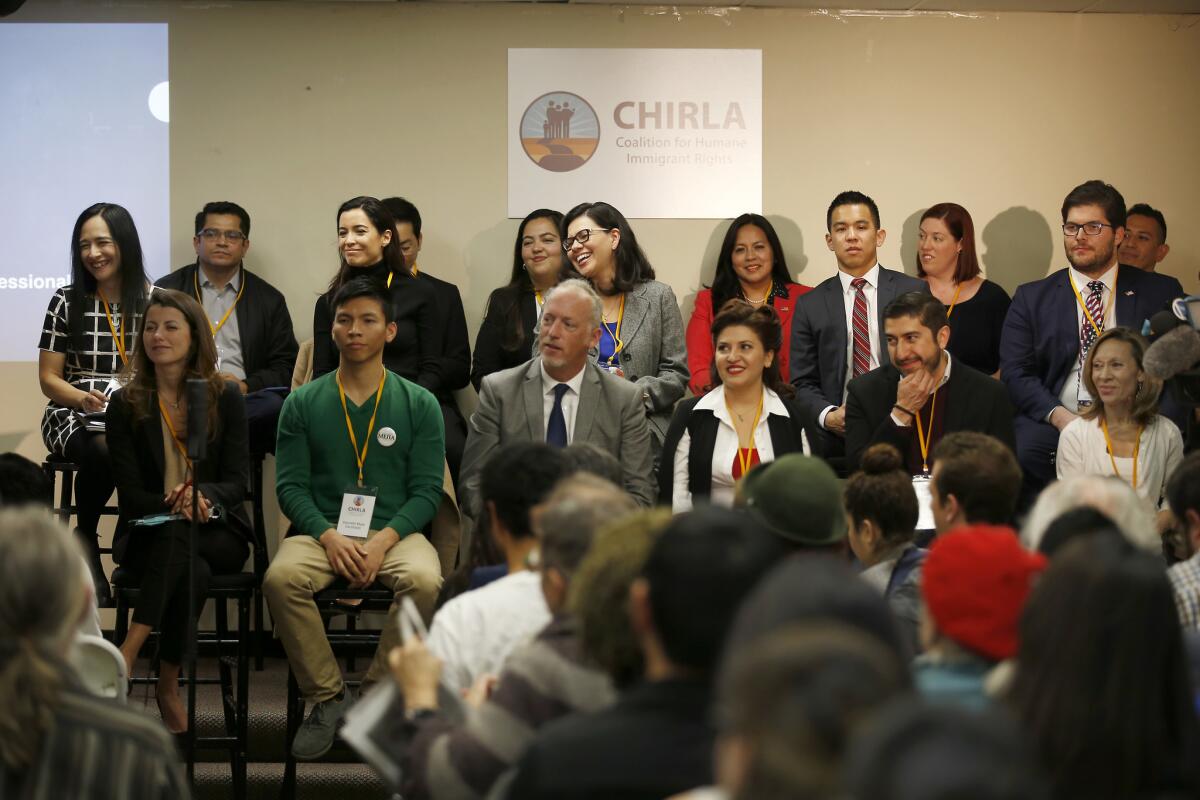
Supporters of Vermont Sen. Bernie Sanders don’t have many clues yet on whom to back in the dizzying array of candidates vying for the 34th Congressional District.
Sanders himself has been coy about the race: When asked whether he would endorse Arturo Carmona, a former deputy political director for his campaign, he said: “We’ll see.”
Three prominent Sanders endorsers have publicly announced their support for Wendy Carrillo, another early Sanders backer.
Lucy Flores, a former Nevada legislator Sanders endorsed for Congress last year; Rania Batrice, former deputy campaign manager for Sanders’ presidential bid; and Linda Sarsour, a Muslim American activist and co-chair of the Women’s March on Washington, announced Tuesday that they support Carrillo, who recently spent time at the Standing Rock protest against the Dakota Access Pipeline.
Although Flores has been campaigning for and supporting Carrillo on social media for months, her endorsement was highlighted as part of an effort to emphasize Carrillo’s support within the Sanders political network.
“Wendy is a woman of the revolution, and I am so proud to support her as she continues her activism and tireless work on behalf of the people,” Batrice said in a statement released by Carrillo’s campaign.
Our Revolution, the political group Sanders helped start that now operates independently, decided recently not to endorse in the April 4 primary, in which 23 candidates are running.
The group has endorsed six candidates nationwide so far in 2017, including Gil Cedillo for Los Angeles City Council.
Shannon Jackson, executive director of Our Revolution, said its board carefully weighed the decision not to endorse.
“We listened to our supporters, and the base is split,” Jackson said. “We don’t want to go against the people who are there on the ground, doing the work.”
------------
UPDATES
5:28 p.m.: This post was updated to include context about Our Revolution’s other endorsements.
- Share via
Artist known for nude Trump portrait proposes initiative to add gender identity protections to California Constitution
A Los Angeles artist has proposed a new ballot initiative to add protections for gender identity to the California Constitution.
Illma Gore submitted paperwork to the state attorney general on Monday proposing a ballot initiative to add a new section to the state Constitution declaring “free exercise and enjoyment of gender identity without discrimination or preference are guaranteed.”
The initiative is dubbed the Gender Identity Liberty and Freedom Act.
The language mirrors an existing section protecting religious beliefs that reads: “free exercise and enjoyment of religion without discrimination or preference” in the Constitution.

Gore, the artist behind the measure, became something of an Internet sensation after she was banned from Facebook for sharing a painting she made depicting a nude Donald Trump. She also said she was punched by a Trump supporter last year.
The attorney general is tasked with crafting a brief title and summary of each measure that will end up on the state ballot.
There is a 30-day public comment period on Gore’s proposal. The state Department of Finance and the Legislative Analyst’s Office also have 50 days to prepare a fiscal impact analysis of the proposal.
After a title and summary are issued, Gore has 180 days to gather 585,407 valid signatures to qualify the proposed initiative for the ballot.
Gore said volunteers are starting to prepare for the signature-gathering process.
“California is one of the leaders of the country in diversity and LGBT rights. I don’t think we will have a problem gathering signatures here,” she said in an email.
She said the goal of the measure is to “protect gender identity as a form of free speech under the Constitution.”
The initiative would essentially make LGBT rights the same as religious rights in the Constitution, said Jessica Levinson, a Loyola Law School professor who specializes in election law.
“It is trying to stave off or prevent individual laws that, for instance, deal with a landlord who doesn’t want to rent to a transgender person, or an employer who doesn’t want to provide the same level of benefits, or maybe a pediatrician who doesn’t want to serve a gay couple,” she said.
- Share via
Meet the anti-poverty crusader who now has a top role in crafting the California state budget
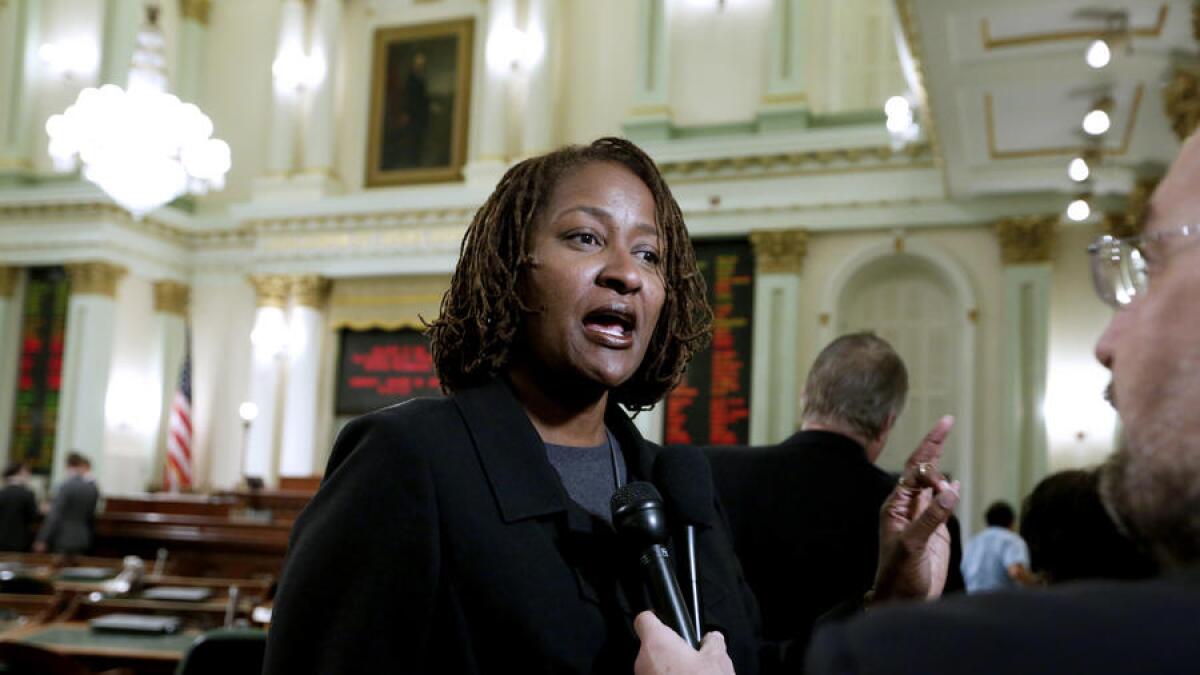
Two years ago, Holly J. Mitchell stood on the state Senate floor and, in a crisp, deliberate voice, laced into the budget that her fellow Democrats were poised to approve.
The plan “picks winners and losers,” the state senator from Los Angeles said. “It appears to me that poor people in California and their children continue to be on the losing end of that equation.”
Mitchell had never been shy in urging her colleagues to do more for the poor. But this time, she went even further — withholding her support when the bill came to a vote, a flagrant violation of an unwritten legislative rule among the Capitol’s ruling Democrats that could best be described as “thou shalt not defect on a budget vote.”
The plan passed anyway, and Mitchell could’ve been shunned and made a pariah. But since that rebellion, her influence has only grown. Last year, her signature cause — repeal of a decades-old rule capping aid to certain mothers on welfare — became law. And this year, she was awarded the job she’s long coveted: chair of the Senate budget committee.
- Share via
Three Californians whose relatives were killed by immigrants in the U.S. illegally will be Trump’s speech guests
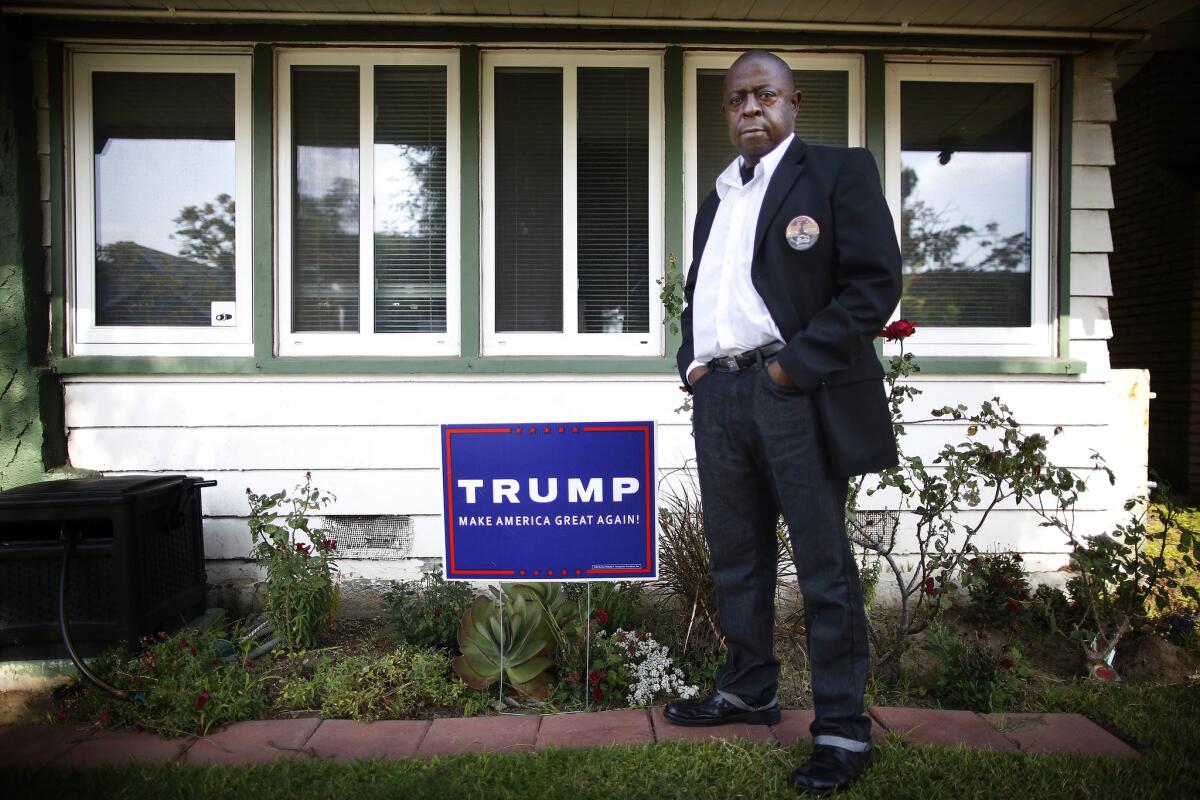
Three Californians whose relatives were killed by people in the U.S. illegally will be among President Trump’s guests as he addresses a joint session of Congress on Tuesday night.
Their presence indicates that illegal immigration -- on which Trump staked his campaign -- will likely be a major part of his speech to the Senate and House .
- Share via
State lawmaker proposes bill to help determine how many untested rape kits exist in California
Tens of thousands of rape kits are sitting untested in evidence locker rooms across the country. But no one knows exactly how many, and police and sheriff’s departments rarely track the reasons why the exams go unanalyzed.
A bill authored by Assemblyman David Chiu (D-San Francisco) would require local law enforcement agencies in California to report information on their rape kit evidence to the state Department of Justice through a database within 120 days of the collection of a sample.
Chiu said the improved recording would help policymakers assess which departments need resources to tackle their backlogs, and provide greater transparency around an intrusive procedure that lasts hours.
“We know the value and the power of DNA evidence,” he said. “But for thousands of survivors and victims in California, they don’t know why the DNA evidence has not been tested.”
The legislation moved out of the Assembly Public Safety Committee on Tuesday on a 7-0 vote.
Speaking before the committee, Cory Salzillo, legislative director with the California State Sheriffs’ Assn., said his organization opposed the bill due to its fiscal and workload implications.
“It creates another unfunded mandate,” he said, while state law already requires law enforcement agencies to notify victims when their samples will not be examined.
But supporters said the state needed better reporting mechanisms as it attempts to measure and potentially reduce a backlog that the state Justice Department has estimated to reach upward of 400,000 untested rape kits.
Alameda County Dist. Atty. Nancy O’Malley said police agencies log all of the kits in their property collection databases. The additional work the bill would require would amount only to a “few extra keystrokes,” she said.
- Share via
Jimmy Gomez consolidates support from major labor unions with endorsement from L.A. County Federation of Labor
- Share via
Lawmakers support creating task force to study impaired driving by marijuana users

The California Highway Patrol would form a task force to develop methods for identifying when drivers are impaired by marijuana or prescription drugs, under legislation that moved forward on Tuesday.
The study would also look at technology for measuring impairment by the chemical THC, under legislation proposed by the California Police Chiefs Assn. and introduced by Assemblyman Tom Lackey (R-Palmdale).
“The bill, AB 6, is a reasonable approach forward to address our fight against drugged driving,” said Lackey, a retired CHP sergeant. “The urgency of this should be very clear to all of us.”
The task force would include law enforcement officials, a prosecutor, physician, drug researcher, defense attorney and representatives of the marijuana industry.
The Assembly Public Safety Committee unanimously recommended the bill after hearing emotional testimony from Antelope Valley teacher Karen Smith about how her husband was killed by a car driven by a young man who had allegedly used marijuana. She said she had to push hard to get blood tests analyzed.
“What has happened here is a disgrace, and no other family should have to go through it,” she told the panel.
Proposition 64, which California voters approved in November to legalize the recreational use of marijuana, provides funds for studies on the impact of cannabis on driving and to develop training and procedures for identifying drugged driving.
- Share via
Republican lawmakers blast removal of state senator from the floor, call for full investigation
Senate President Pro Tem Kevin de León on Monday pledged a nonpartisan review into actions taken last week by Democratic leaders to remove Sen. Janet Nguyen from the house floor, saying he was troubled and unsettled by the tense events that unfolded.
“Members, last Thursday was not one of the finest moments of the Senate,” he said. “As the leader of this body, I take full responsibility for what transpired and in making sure that it never happens again.”
Republican lawmakers commended the statement. But they blasted what they described as the majority party’s infringement of free speech. They demanded a formal apology for Nguyen and called for the resignation of De León’s chief of staff, who they said made inappropriate comments about the incident to the media.
Nguyen (R-Garden Grove), a Vietnamese refugee, on Thursday was escorted from the Senate floor by sergeants-at-arms after she tried to offer what she said was a different historical perspective on the late Tom Hayden and his opposition to the Vietnam War.
Reading a letter to Secretary of the Senate Daniel Alvarez, Sen. Jean Fuller (R-Bakersfield), leader of the Senate Republican Caucus, called for a complete and transparent investigation.
Fuller said Nguyen spoke from the heart when she said Hayden’s being honored triggered outrage among the constituents in her district’s Vietnamese community, where memories of the war were still raw.
“Brutality of the Vietnamese Communist party continues to haunt the collective memory of the Vietnamese American community,” Fuller said. The letter was submitted to the Senate journal through a unanimous vote.
Before the start of session, lawmakers from both sides of the aisle shook hands with Nguyen as she entered the chamber for her first time back since her ouster last week. Some Republican lawmakers embraced her and whispered words of approval and encouragement.
“Thursday’s events were shocking and distressing,” she later said. “But what happened today on the floor reaffirmed my faith in America’s deep belief in the democratic process.”
- Share via
Gun rights activists win round in free-speech court case against state of California

A federal judge issued a preliminary injunction Monday against the state for continuing to demand the removal of a blog post that listed the home addresses of legislators who voted for California’s newest gun control measures.
The lawsuit is funded by the Firearms Policy Coalition on behalf of one of the group’s members, who is listed in the lawsuit under the pseudonym “Publius” and writes a blog called The Real Write Winger.
Last year, the blog published the names, home addresses and home phone numbers of 40 legislators who voted for a package of gun control measures in June, saying the lawmakers “decided to make you a criminal if you don’t abide by their dictates. So below is the current tyrant registry.”
The Web hosting company WordPress took the post down after it received a letter from Deputy Legislative Counsel Kathryn Londenberg saying the information put elected officials at “grave risk,” and citing state law barring the release of such information.
Chief U.S. District Judge Lawrence J. O’Neill in Fresno issued an order Monday granting the plaintiffs’ motion for a preliminary injunction in the 1st Amendment civil rights lawsuit, saying the plaintiffs are “likely to succeed” on their claims that the state law violates the 1st Amendment.
“We are delighted that Judge O’Neill saw the statute and the State’s enforcement of it for exactly what it was: an unconstitutional restriction on free speech,” said coalition president Brandon Combs.
- Share via
Sen. Kamala Harris and other black senators to talk tonight about diversity, economics and black leaders
- Share via
House Intelligence Committee Chairman Devin Nunes warns against ‘witch hunt’ over Trump-Russia ties
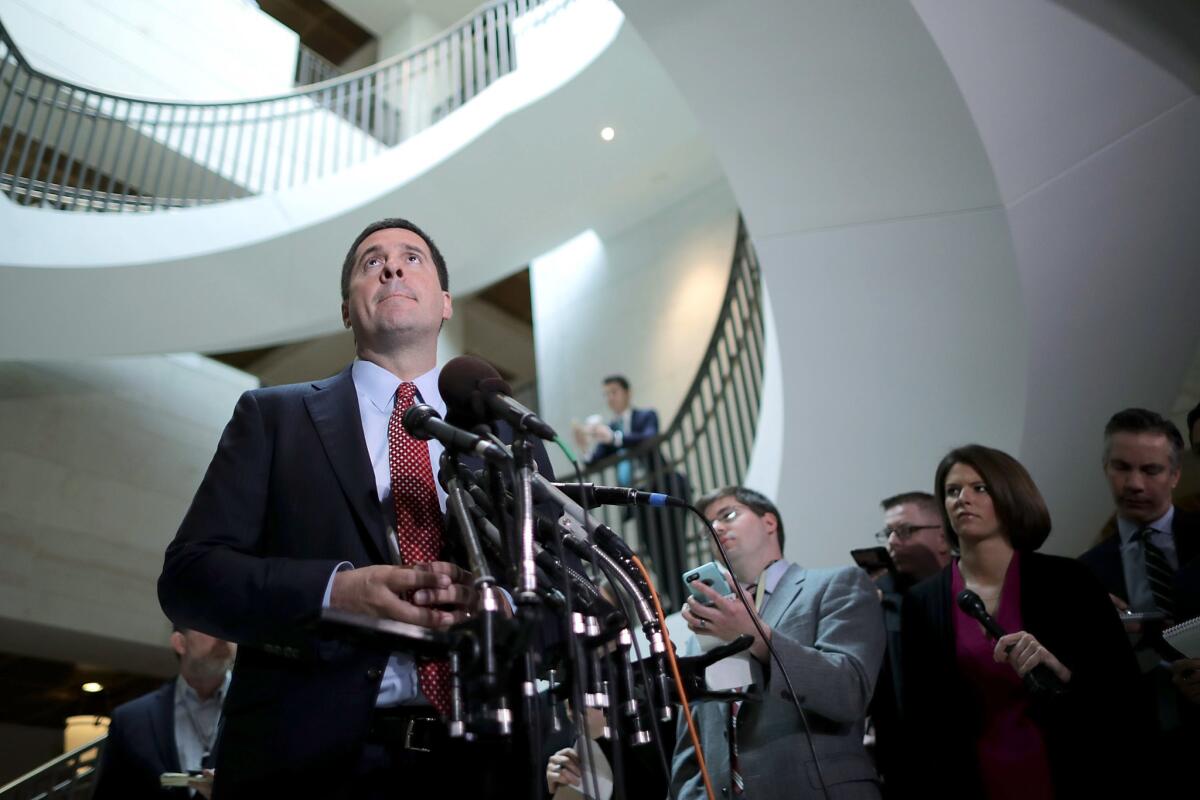
House Intelligence Committee Chairman Rep. Devin Nunes said on Monday he had seen no evidence from the intelligence community that there was contact between Russia and the Trump campaign.
“I want to be very careful; we can’t just go on a witch hunt against Americans because they appear in a news story,” said Nunes (R-Tulare). “We still don’t have any evidence of them talking to Russia.”
He said the committee had been briefed on the “highlights” of what the intelligence community had found but was still collecting evidence.
The committee’s ranking Democrat, Adam B. Schiff (D-Burbank), quickly responded, saying the committee’s investigation is in its “infancy” and it’s too soon to reach conclusions about the evidence.
“We haven’t obtained any of the evidence yet, so it’s premature for us to be saying we’ve reached any conclusion about the issue of collusion,” Schiff said. “The most that we’ve had are private conversations, the chair and I, with intelligence officials. That’s not a substitute for an investigation.”
The House and Senate intelligence committees are conducting separate investigations into Russia’s reported attempts to influence voters in 2016 in an effort to curtail Hillary Clinton’s chances and boost Donald Trump’s. A leaked U.S. intelligence report on the attempts did not look at whether the effort succeeded.
The House committee has expanded a previous ongoing investigation of Russia cyberhacking to include a look at efforts to interfere in the 2016 election, Nunes told reporters Monday. Though it is still in its early stages — the leaders of the committee are still discussing the investigation’s scope — Nunes said he expected the findings to be made public.
Schiff and Nunes spoke separately to reporters Monday. Schiff said the two agreed privately that they would jointly address reporters about the investigation going forward.
Nunes, who served as a member of Trump’s transition team, said he continued to be concerned about leaks of classified and sensitive information from the White House and intelligence communities. The leaks — one of which resulted in a report about the FBI investigating Trump campaign officials — will be part of the committee’s investigation.
“A government can’t function with massive leaks at the highest level,” Nunes said.
- Share via
California state leaders are officially asking for records on recent immigration enforcement moves
Amid national debate over whether the Trump administration is following through on its campaign promise of mass deportations, state Senate leader Kevin de León and Assembly Speaker Anthony Rendon on Monday filed a federal records request to U.S. Immigration and Customs Enforcement.
The Democratic leaders, who have been vocal opponents of Trump’s anti-immigrant rhetoric, want to see documents related to ICE’s implementation of the president’s January immigration executive order and Homeland Security Secretary John F. Kelly’s February memo on immigration enforcement and sanctuary cities.
They also asked for records on the planning and execution of February immigration raids, which ICE has said were not part of a new crackdown.
In the letter, De León (D-Los Angeles) and Rendon (D-Paramount) said there should be transparency about the agency’s policies on immigration enforcement at or near government entities and community buildings, including churches, schools and hospitals.
They also asked about the agency’s policies on access to lawyers for people who have been detained and treatment of people registered for immigration programs such as Deferred Action for Childhood Arrivals.
ICE has released little information, they said, resulting in “increased confusion and fear in many communities.”
California is believed to be home to huge portion of the millions of immigrants living in the country illegally, and many families have a mixture of immigration statuses.
“All of these parents and children are potentially at risk of separation at the hands of ICE,” the request says. “To set the community’s fear to rest, much greater clarity is needed about what ICE’s enforcement policies, procedures and priorities will be going forward.”
- Share via
California’s campaign finance and lobbying violations are down, but total fines are up
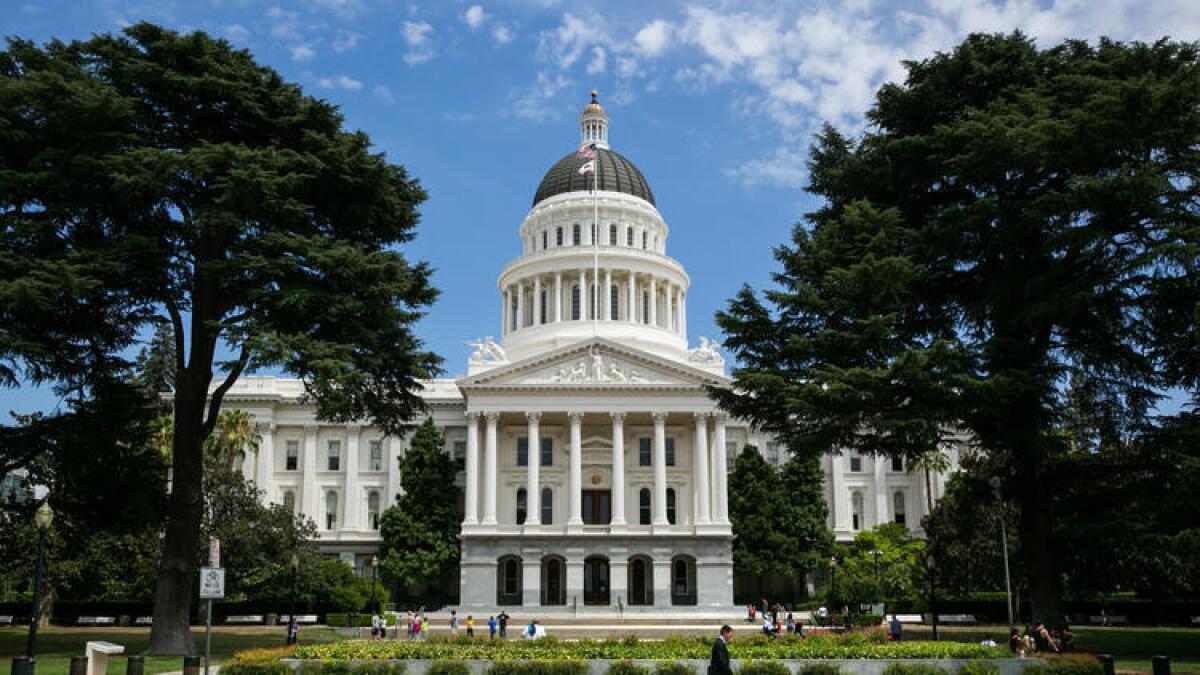
California’s campaign finance watchdog found fewer lobbyists and campaigns to sanction in 2016, while collecting more in fines as it focused on bigger cases.
The Fair Political Practices Commission reported Monday that last year’s violations were at a three-year low. But the agency collected $200,000 more in fines than it did in 2015, raking in $900,000 because it pursued bigger cases.
The agency issued fines in 311 cases last year, down from the record 333 such cases the year before, and 332 cases in 2014.
The agency also sent out 489 warning letters last year for technical or minor violations, but didn’t fine those violations. It sent out hundreds more warning letters in 2014.
Big cases last year included one in which state Sen. Tony Mendoza (D-Artesia) and supporters agreed to pay $57,000 for making campaign contributions over state limits, improperly controlling multiple committees and filing inaccurate campaign statements.
A case against Oakland business AB&I Foundry discovered that 37 campaign contributions it made were laundered, hiding the true source of the money, and the company was fined $100,000.
The numbers reflect an agency “focusing on strict enforcement of serious violations,” chairwoman Jodi Remke wrote in the agency’s annual report.
- Share via
L.A. County Young Democrats endorse Sara Hernandez in congressional race
Sara Hernandez received the endorsement of the Los Angeles County Young Democrats over the weekend. On Twitter, Hernandez said the local club “represents the changing face of progressive politics,” and called their endorsement “an honor.”
The endorsement comes days after the local club co-hosted a forum featuring Hernandez and five other candidates for the 34th Congressional District seat.
- Share via
Trump provides excitement for California Republicans, but at home there’s less to cheer about
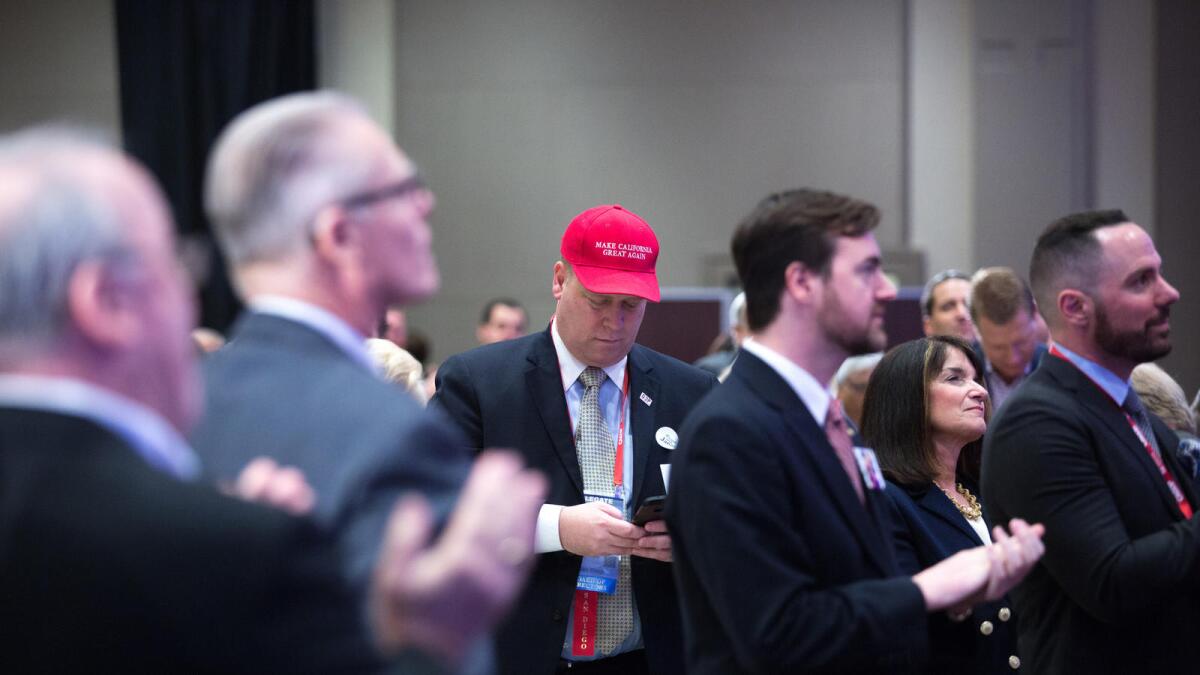
California Republicans were in a festive mood at their weekend convention in Sacramento.
They toasted their airy new downtown headquarters with views of the Capitol and decorated with pictures of Ronald Reagan and other memorabilia from the party’s storied history in the state. They reelected leadership that had turned a practically bankrupt party into one that raised $19 million last year. And they celebrated having helped elect a Republican president for the first time in more than a decade.
“Isn’t it nice to win?” Rep. Devin Nunes of Tulare asked hundreds of delegates and guests during a dinner speech Saturday night.
But for all the cheer, the state GOP still faces a hard reality. It has not elected a statewide politician in more than a decade, its numbers are dwindling, Democrats have a supermajority in both houses of the Legislature and, after three consecutive election cycles where Republicans ceded the top posts in government to Democrats, it has no major prospects to run for governor or Senate next year.
- Share via
Election officials question financial reports of Darrell Issa’s opponent
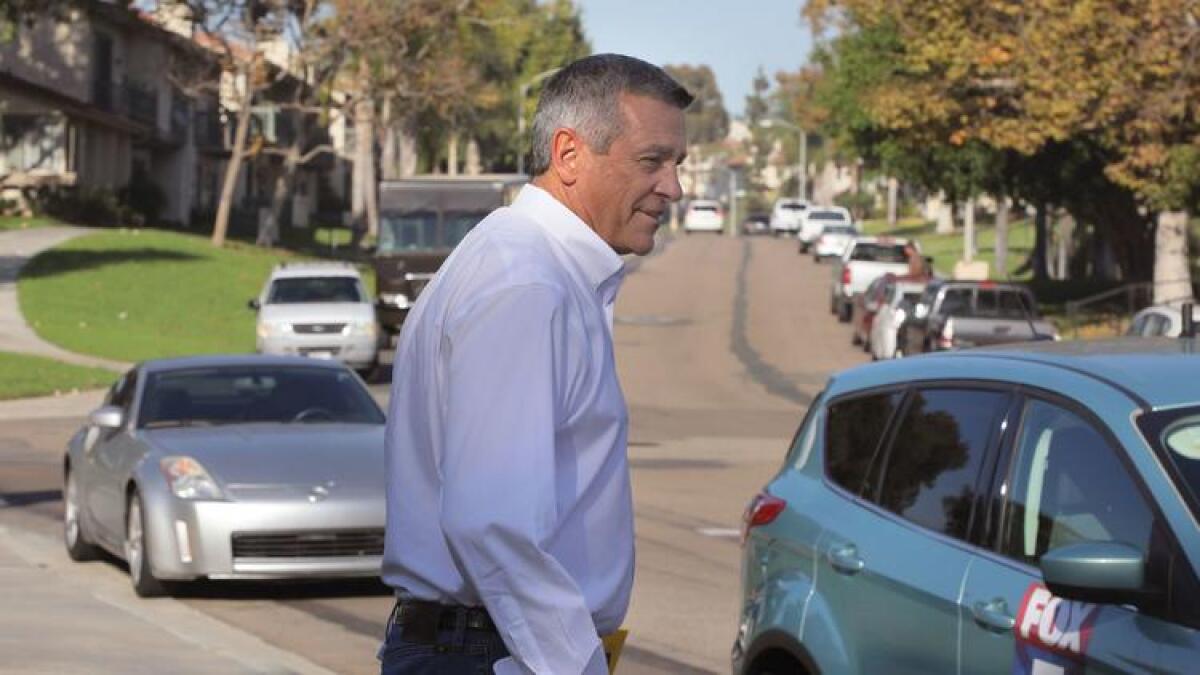
As Democrat Doug Applegate begins raising money for a second challenge to Republican Rep. Darrell Issa, federal elections officials are questioning his campaign’s financial reporting, and filings show a nearly $400,000 drop in cash on hand that the campaign has yet to explain.
Applegate, a retired Marine colonel from San Clemente, lost a close race in November as a first-time candidate against Issa, of Vista. Applegate soon after announced he would run again in 2018.
Applegate’s campaign has missed deadlines for five requests for additional information from the Federal Election Commission since July, records show. Election officials’ concerns include mathematical errors, misidentification of contributors, failure to adequately describe expenditures and discrepancies in accounting for loans Applegate made to the campaign.
- Share via
Resolutions backing Trump agenda sail through on last day of California GOP convention, but internal politics bubble up
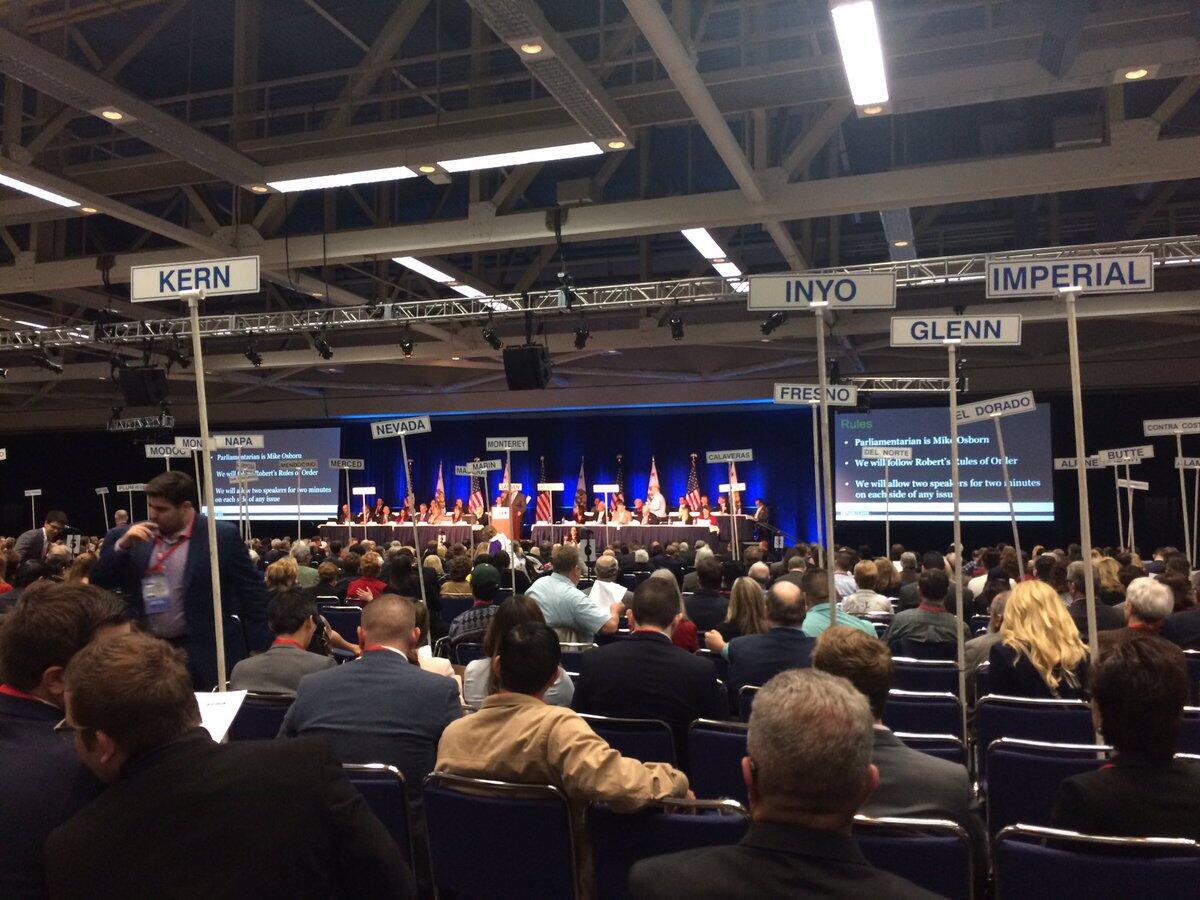
There was no debate before delegates easily passed a slate of resolutions supporting key tenets of the Trump administration’s agenda Sunday, the last day of the California Republican convention.
The four resolutions, all supported by the Tea Party California Caucus, were to support Trump’s travel ban, repeal and replace Obamacare, and to oppose a gas tax hike proposed in Gov. Jerry Brown’s budget and Democrats’ efforts to create sanctuary cities.
But although those measures, controversial with many other Californians, sailed through with an easy voice vote, internal politics of another sort took center stage for a brief moment.
The question was whether or not a newly formed group, the California Impact Republicans, should be chartered as an affiliate of the state party. The group was started by former members of the California Republican Assembly, part of the most conservative wing of the state GOP.
Although Ronald Reagan once described the California Republican Assembly as the “conscience of the Republican Party,” it has been declining in numbers and influence for some time.
Baron Night, a CRA board member from Buena Park, rose to oppose the new group’s charter.
“If you can’t trust a person or an organization, there is no relationship,” Night began, before listing four officers of the Impact Republicans and saying they hadn’t complied with party rules.
After being warned by Brulte about avoiding personal attacks, Night said the committee “didn’t do enough research” into the backgrounds of the officers, all of whom are former CRA officers.
After about 10 minutes of procedural confusion and debate, a loud voice vote showed clear division among the ranks of the party delegates, with so many opposing the group’s charter that Brulte called for a second vote.
“In the opinion of the chair, the ayes have it,” Brulte said after another clearly divided voice vote.
- Share via
California Republican Party convention delegates elect Jim Brulte to third term as chairman
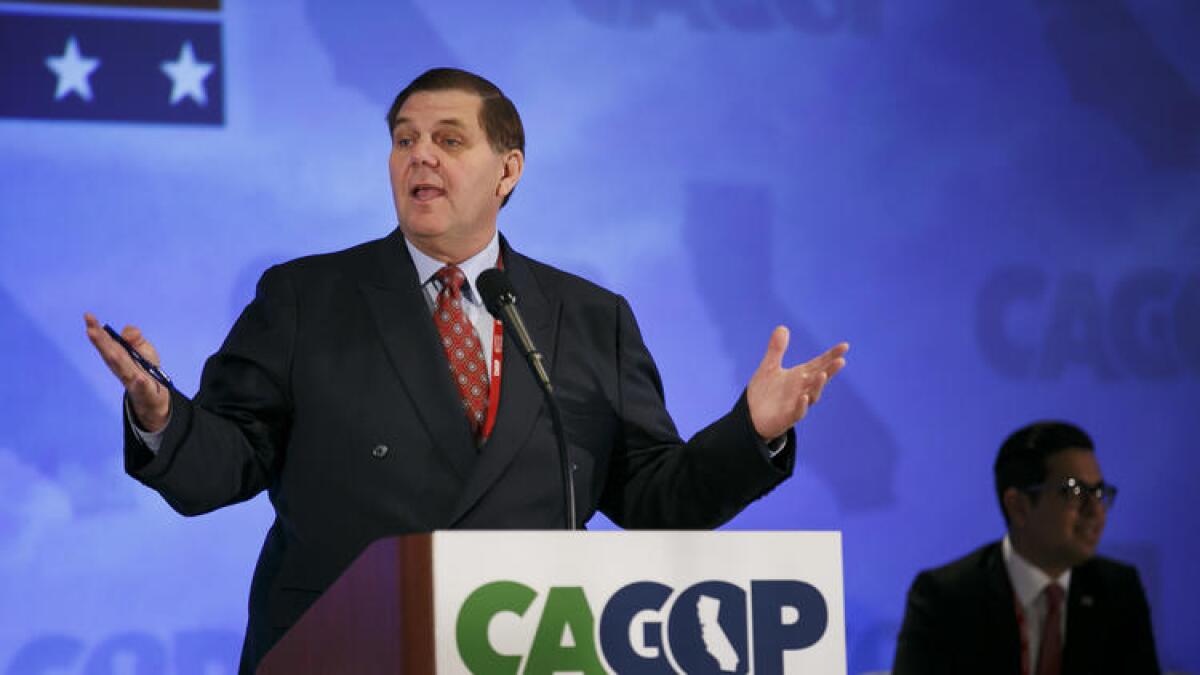
The California Republican Party on Sunday voted to keep Chairman Jim Brulte in the job for a third term to steer the party toward what is expected to be a crucial election for the GOP in 2018.
Brutle, a former state Senate Republican leader from Rancho Cucamonga, took over as chairman in 2013 and is credited for putting the state party on a firm financial footing and launching a rebuilding process.
At the party convention last year, Republican delegates voted to extend the term limits for the GOP chair. The change was written in a way to make it apply only to Brulte, so it will not affect future party chiefs.
Prior to that, party rules limited state Republican chairs to two two-year terms.
Delegates also reelected the rest of the party’s current leadership team: Stanislaus County Supervisor Kristin Olsen, a former Assembly Republican leader, as vice chair; former Nevada County Republican Party chair Deborah Wilder as secretary; and former Downey mayor Mario Guerra as treasurer.
- Share via
Rep. Devin Nunes tells California Republicans to push five ballot initiatives, though each could face tall hurdles
Rep. Devin Nunes on Saturday night urged California Republicans to regain relevancy by pushing ballot initiatives that could be a tough sell with the state’s voters, ones that would create battles potentially costing tens of millions of dollars to wage.
The ideas he floated in his speech to the state GOP convention include increased offshore oil drilling, elimination of the state income tax, shifting the Legislature into one body or part-time status, moving bonds earmarked for high-speed rail to water storage and changing how public employee union dues are collected.
Nunes, a Central Valley representative who chairs the powerful House Intelligence Committee, said the state’s Republicans needed to be as bold as President Trump was during his campaign.
“Isn’t it nice to win?” Nunes told hundreds of supporters attending the convention’s dinner event. “This guy put it all on the line. He was willing to lose. We have to be willing to lose.”
Most of the proposals have either proven unappealing to California voters in the polls, have lost at the ballot box already, or would require enormous structural changes to the state’s government and finances.
For example, a ballot initiative to transfer high-speed rail money to water storage failed to garner sufficient donors to earn a spot on the fall 2016 ballot.
More than 6 in 10 likely California voters opposed increased offshore oil drilling in a July 2016 poll by the nonpartisan Public Policy Institute of California.
In 2012, a ballot measure that would have banned automatic public employee union dues from being used for political purposes, Proposition 32, failed by a 56%-43% margin.
Nunes’ suggestion of eliminating California’s personal income tax stands in stark contrast to data from the state Department of Finance estimating it will comprise 68% of all general fund revenues in the fiscal year that begins this summer.
Nunes, speaking to reporters after his speech, said the money could be replaced by changing the state’s sales tax.
“It’s been a few years since I worked on it, but we looked at doing, basically, a broader type of sales tax,” he said. “You would just basically get rid of the income tax and just basically have a consumption type system.”
He said such a move would not be regressive.
“It’s a very transparent way to do it, 150 countries around the world do it that way, there’s no reason why the state of California couldn’t do it,” Nunes said.
A state commission studied a similar tax plan in 2009, but the proposal was summarily rejected by state lawmakers.
Nunes told the delegates and their guests that if the ballot measures fail, Republicans should keep trying until they succeed. He later told reporters that he estimated it would cost the state GOP $10 million to $12 million each election cycle that the initiatives appear on the ballot.
“I would argue that’s the best $10 or $12 million we could spend by putting the initiatives on the ballot” and therefore putting a Republican agenda on the ballot each election, he said.
“I think it would show people in California what we actually stand for. I think right now it’s very difficult to get our message across because we’re drowned out.”
Kevin Spillane, a veteran GOP strategist, said Nunes’ proposals were not realistic.
“It sounds like smoke and mirrors rather than a practical political strategy for Republicans in California. Congressman Nunes has failed to sponsor any ballot measures in the past. It’s hard to believe he would do so in the future.”
- Share via
Transgender California GOP delegate says the Trump administration will protect the LGBTQ community
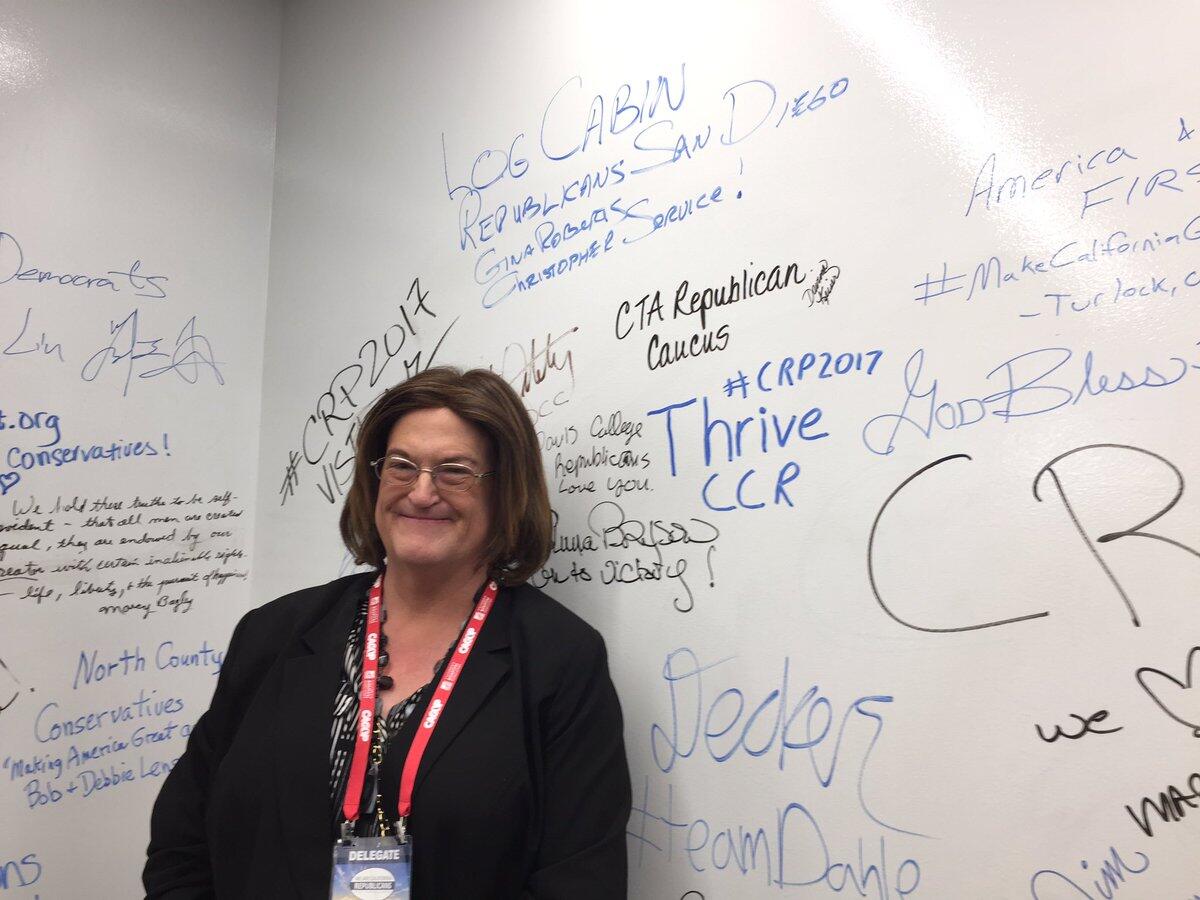
Gina Roberts, a champion target shooter and supporter of President Trump, says she wishes everyone would take a deep breath and relax about the controversy over transgender students using bathrooms.
Roberts was one of hundreds of GOP loyalists attending the California Republican Party convention in Sacramento this weekend and almost assuredly, she surmised, the party’s first transgender delegate.
At a Saturday gathering of tea party supporters, Roberts stood up and asked how they could all work together without all the “background noise,” a suggestion that appeared to be well received by other speakers there.
Beforehand, she told The Times that Trump’s critics overreacted to the administration’s decision to cease a federal mandate, implemented by President Obama, directing schools to allow transgender students to use restrooms and other facilities that match their gender identities.
Roberts called the Obama policy heavy-handed, saying threats of federal legal action put conservatives on the defensive and escalated tensions.
“I’ve been using the bathroom for 35 years for the gender I presented, and I’m not exactly a small person who isn’t noticed,” said Roberts, 62. “I’ve never had a problem.”
Roberts also criticized those who want to ban transgender students from using the bathroom that matches their gender identity, saying it was ignorant to believe they are sexual “predators” who should be feared.
“I think transgender rights need to be considered civil rights,” Roberts said. “Would you require black people to use separate bathrooms?”
Roberts said she is confident that the Trump administration will work diligently to protect the LGBTQ community from discrimination, saying Vice President Mike Pence made that exact promise.
Roberts is chair of the San Diego Log Cabin Republicans, a chapter of the nation’s largest gay GOP political organization, and a longtime engineering consultant from Valley Center. Roberts said she underwent her transition surgery just five weeks ago.
During the presidential campaign, Roberts initially supported Rand Paul and Carly Fiorina. When Trump won the nomination, she said it was an easy decision to support him because she thought Democratic presidential nominee Hillary Clinton was unfit for office.
Roberts, a board member of the San Diego County Gun Owners organization, saw Clinton as a threat to gun rights. She said she was also outraged by Clinton’s use of a private email server while she was secretary of State.
“I hated Hillary,” Roberts said. “I was in the national security field. Had I done that, I would have been in jail for 35 years.”
- Share via
Looks like the new California GOP boss will be the same as the old boss
- Share via
Rep. Darrell Issa calls on the GOP to reach out to all Americans — even his party’s critics
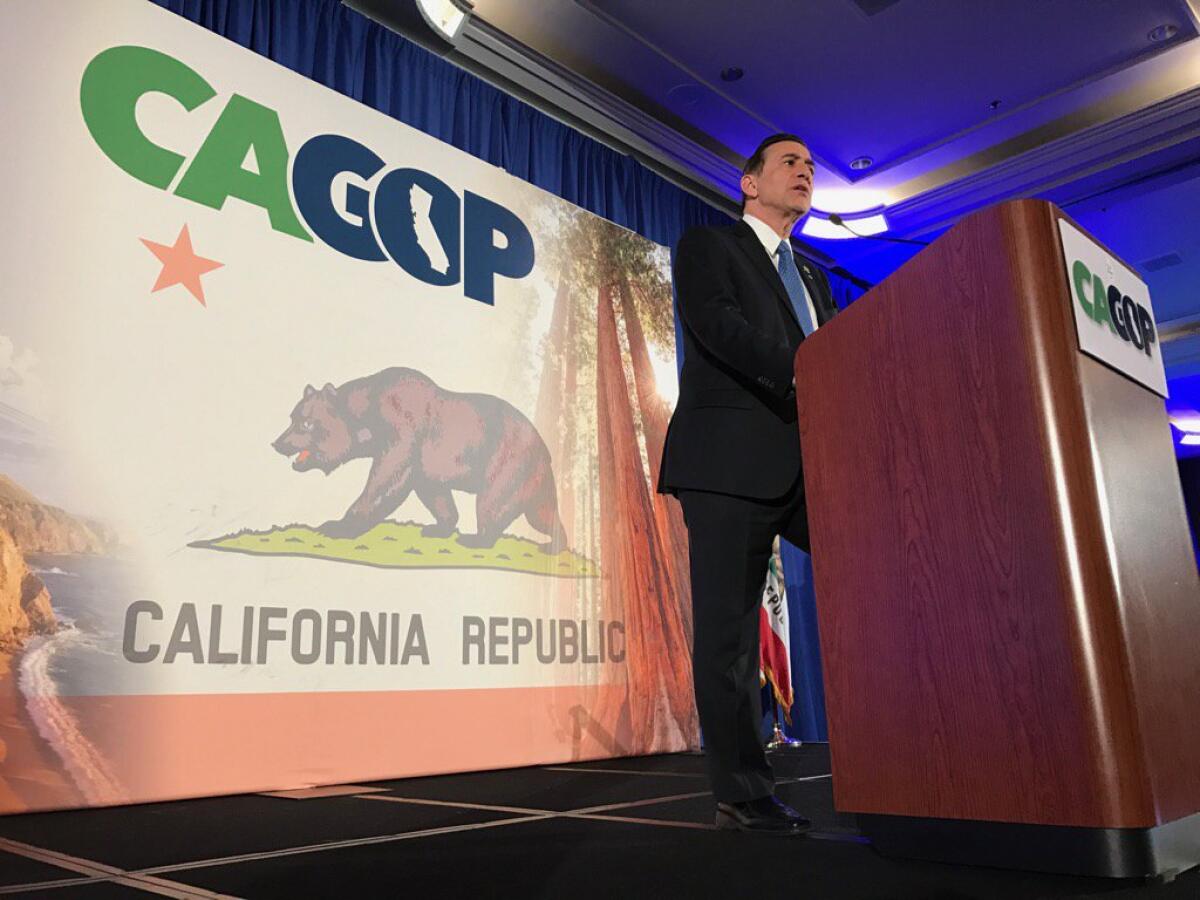
Republican Rep. Darrell Issa of Vista, who once called President Obama “one of the most corrupt presidents in modern times,” struck a more conciliatory tone Saturday and said Republicans have to do a better job listening to the concerns of all Americans, even those critical of the GOP.
Issa, speaking at the California Republican Party’s convention in Sacramento, said that after surviving a surprising tight reelection campaign in November, he too needs to follow that advice.
“We as a party have not reached out enough and not translated over these last years that we … do believe in the people, our constituents,” he told party delegates.
He added that last week he spent 90 minutes meeting with a mix of protestors and tea party supporters gathered outside his office in Vista, fielding all their questions.
“Some of the people did not have their hearts and minds changed. But some did,” he said.
Issa, whose congressional district stretches from La Jolla to Dana Point, defeated Democratic challenger Doug Applegate by fewer than 2,000 votes in November, his closest election since taking office in 2003.
During his lunchtime speech, Issa took a few shots at the former president, referring to him as “Barack Hussein Obama” at one point, and accusing him of failing to live up to promises to increase transparency in the federal government.
Most of Issa’s speech, however, focused on promise ahead for the nation now that President Trump is in the White House.
“I can tell you how Donald Trump won this election. Donald Trump believes in America’s greatness. He had the gall to say, ‘Let’s make American great again,’” Issa said.
Afterward, while talking with reporters, Issa repeated his call for a special prosecutor to investigate Russian interference in the 2016 election, which could include any communications between Russian officials and the Trump administration. Issa first called for the independent investigation Friday night when he appeared on HBO’s “Real Time with Bill Maher.”
“That’s historically the right way to deal with this,” Issa said Saturday.
Issa also said he supports a robust, bipartisan investigation by the House and Senate intelligence committees.
“Republicans and Democrats who have special access in the select intelligence committees, they do need to know what Russia was doing and how they were doing it,” Issa said. “We are dealing with an evil, smaller empire.”
Issa added that Trump’s national security advisor and secretaries of Defense and Homeland Security all believe that “Russia is evil and that we need to have checks against them.”
He predicted that Republican attempts to replace the Affordable Care Act will be an arduous process.
“This is hard and I hope Republicans don’t accept anyone’s easy answer,” Issa said.
Finally, when asked if he has any interest in possibly running for California governor or the U.S. Senate, he mostly sidestepped the question.
“I’ve got a big job right now,” he said. “I’m going to be very busy.”
- Share via
Trump’s California supporters celebrate victory and turn to 2018

Hundreds of California supporters who worked to get Donald Trump elected president gathered Saturday afternoon to celebrate their victory — and to try to turn their energies toward improving the GOP’s relevance in their home state.
“Our job is to build a structure that wins elections and wins elections right here,” said Tim Clark, Trump’s California campaign manager who is now serving as a liaison between the White House and the Department of Health and Human Services. “We’ve done our job nationally. Now we have to focus on our state in 2018.”
No Republican has won statewide office in California since 2006, and the party’s voter registration is at a historic low. But Trump had more than 300,000 volunteers and donors in the state. Tens of thousands of them called voters in battleground states.
“There was a lot of criticism from some that we as a party didn’t do enough to win our state in November. You don’t understand, we did,” Clark said, pointing to victories in Pennsylvania, Michigan, Florida, Wisconsin and North Carolina that were critical to winning the White House. “We won our states.”
Clark said many of the donors and volunteers are “fresh faces” who were not previously engaged with politics. They and the pro-Trump organizations that have sprung up around California could be integrated with state party efforts to work on the 2018 election, when every statewide office will be on the ballot and Sen. Dianne Feinstein will either run for reelection or leave her Senate seat open.
- Share via
After being removed from state Senate floor, Orange County legislator becomes folk hero of the California GOP convention

When Republican Sen. Janet Nguyen of Garden Grove was removed from the state Senate floor Thursday after she tried to make a statement about the late Tom Hayden and his opposition to the Vietnam War, many predicted it was just a matter of time before California Republicans highlighted the incident at their convention this weekend.
They were quickly proven right.
On Friday, a lunch for party leaders, Central Valley Republican Marcelino Valdez referred in a speech to an unnamed young Vietnamese refugee girl seeking freedom, an obvious reference to Nguyen.
By Saturday morning, attendees were sporting hastily printed stickers that read “I Stand with Janet Nguyen.” The phrase was a play on the hashtag #IStandWithLiz, spawned after Massachusetts Sen. Elizabeth Warren was silenced by Republicans on the floor of the U.S. Senate.
At a luncheon headlined by Rep. Darrell Issa (R-Vista), Nguyen was introduced with a video highlighting the incident and her personal story of fleeing communist Vietnam.
“We have to stand strong and protect everybody’s 1st Amendment rights, freedom of speech, freedom of religion and freedom to have a different perspective. Because in the country I come from, that’s not allowed,” Nguyen told the crowd, shortly before leading them in the Pledge of Allegiance.
- Share via
Trump cut-out goes missing at California GOP convention
- Share via
How are California GOP delegates feeling about Trump’s first weeks in office?
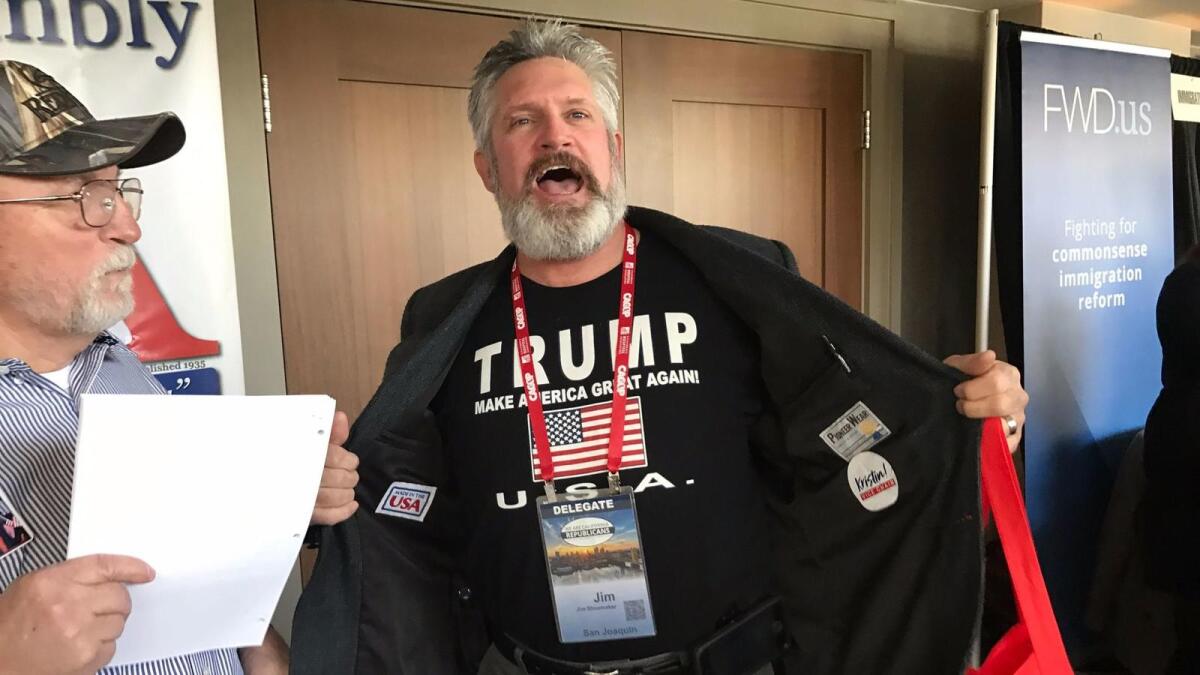
A flurry of smartphone snapshots with a cardboard Donald Trump and blazing red “Make California Great Again” hats signaled that many of the GOP delegates at the California Republican Party convention this weekend have embraced the new president and his aggressive tactics to shift the nation to the right.
But a fair number of Republicans at the event said they still harbored concerns about Trump’s divisive rhetoric, abrupt governing style and doubts about his allegiance to conservative ideals. Those voices were largely drowned out by praise from Trump loyalists and delegates, however, who said they have been impressed by the president’s policy agenda and conservative Cabinet appointments.
“I don’t know about you, but Donald Trump’s just rockin’ my socks,” state GOP Chairman Jim Brulte told the party leadership on Friday.
- Share via
Jim Brulte likely to secure third term as state GOP chairman
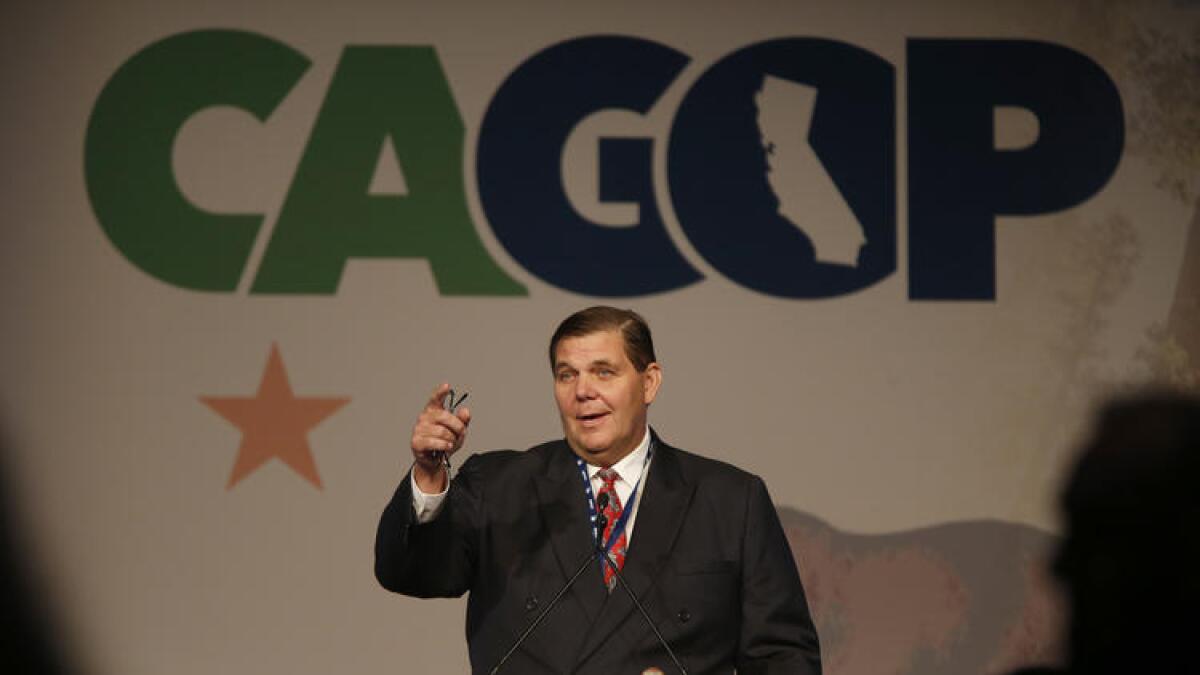
Jim Brulte’s bid for a third term as chairman of the California Republican Party appears to be a lock.
GOP delegates gathered in Sacramento for the party’s three-day convention on Sunday will cast the deciding vote, but thus far Brulte doesn’t face a challenge to extending his job as party leader for another two years.
“I think Brulte is the most phenomenal state chairman we’ve had in memory, including my own tenure,” said Republican National Committee member Shawn Steel, who served as state party chairman from 2001 to 2003. “He’s enthusiastic. He’s the best strategist in either party. He raising phenomenal amounts of money. He’s really the linchpin of our party.”
Brulte, a former state Senate Republican leader from Rancho Cucamonga, took over as chairman in 2013 at a time when the party was in disarray and in massive debt. He is largely credited with helping turn around the party’s finances and plotting a course for the depleted GOP to become relevant again in California.
Despite the GOP’s lack of success in statewide races in recent years, and decline in registered voters, Republicans praised Brulte’s continuing efforts to revive the party — including the GOP’s successes in city council races and other local government posts.
At the party convention last year, Republican delegates voted to extend the term limits for the GOP chair. The change was written in a way to make it apply only to Brulte, so it will not affect future party chiefs.
Prior to that, party rules limited state Republican chairs to two two-year terms.
Tea Party California Caucus chairman Randall Jordan, who has been critical of party leadership, considers Brulte to be a friend. But he plans to abstain when delegates vote on Sunday.
“I think the party is severely lacking when it comes to having grassroots activists in leadership positions,” said Jordan, who also serves as vice chairman of the Republican Party of San Luis Obispo County. “Unless you’re part of the machine that runs the runs the [California Republican Party], then you’re not accepted to run for leadership.”
Still, Jordan praised Brulte for “bending over backwards” to ensure that the tea party movement has a strong voice in the party.
“I think Jim plays the game, but I think Jim is also a very staunch conservative,” Jordan said. “I think he’s conflicted.”
GOP delegates on Saturday are scheduled to officially nominate candidates for chairman and other party leadership posts. The vote on those nominations will be Sunday morning.
FOR THE RECORD
12:13 p.m.: An earlier version of this article gave the name of the Tea Party California Caucus chairman as Randall Jones. He is Randall Jordan.
- Share via
At Republican state convention, conservative radio host and former Trump critic Hugh Hewitt accentuates the positive
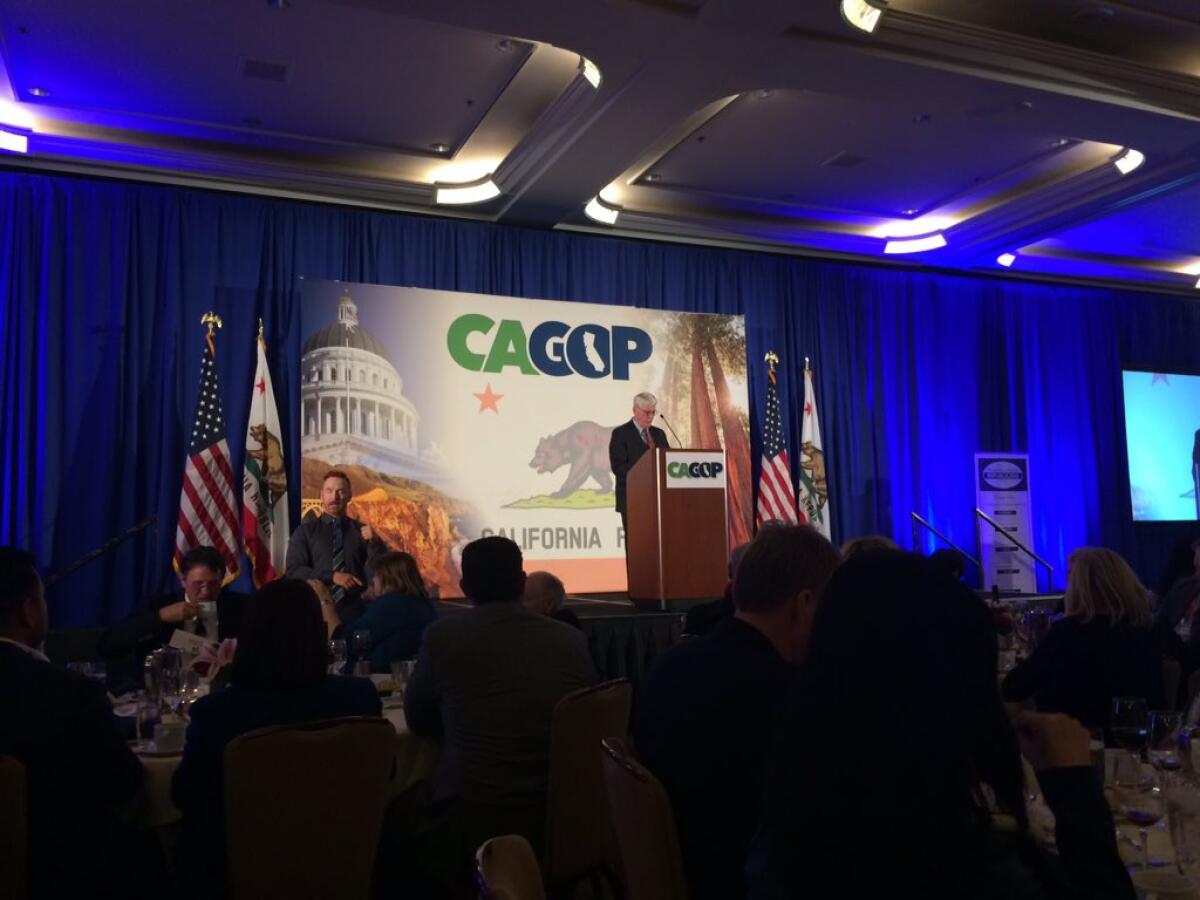
Conservative radio host Hugh Hewitt, who called on Donald Trump to step aside as the Republican presidential nominee late in the campaign, spent much of his speech praising the president’s policies and appointees that he agrees with.
Speaking at a dinner banquet on the first night of the California Republican Party’s convention, Hewitt had high praise for Trump’s Supreme Court nominee, Neil M. Gorsuch, saying, “The best three things about the Trump administration are named Gorsuch, Gorsuch, Gorsuch.”
Hewitt also focused on Trump’s pick to head the Environmental Protection Agency, Scott Pruitt, saying he gave a speech upon arriving in Washington that “would make everyone in this room stand up and cheer.” He praised the president’s stated goal to slash federal regulations.
But Hewitt also acknowledged where he — and even top national party leaders — disagree with Trump.
He described Senate Majority Leader Mitch McConnell and House Speaker Paul D. Ryan as Trump’s “most important allies,” but said they are “from different parties.”
“We have two parties in this room,” Hewitt continued, referencing the rift Trump has created among California Republicans, “and the question is whether those two parties are going to work together for the next four years.”
The radio host also pointed out some differences he had with some of Trump’s policies. He said he believes any immigrant in the country illegally “who wants to just stay and work” and has not broken any other laws should be allowed to stay, a statement in contrast with the Trump administration’s latest signals that deportation efforts could be dramatically expanded.
“I would never send a kid home under” Deferred Action for Childhood Arrivals, Hewitt added, referring to the Obama-era program that shields from deportation some young people who were brought illegally into the country as children.
If immigrants in the U.S. illegally want to vote, however, they should leave the country and apply to enter legally, Hewitt said.
- Share via
Rep. Adam Schiff hosts packed town hall in Glendale on President Trump’s travel ban
- Share via
GOP Rep. Darrell Issa tells Bill Maher a special prosecutor should investigate Russian election interference
San Diego County Republican Rep. Darrell Issa said Friday night that a special prosecutor should be tapped to investigate Russian interference in the 2016 election, a stance that mirrors the calls of congressional Democrats to sideline the U.S attorney general from such inquiries.
Appearing on HBO’s “Real Time with Bill Maher,” Issa was prodded by Maher, the program’s liberal host, on how the congressman, who used to lead the House Oversight Committee, would’ve acted if Democrats were suspected of improper ties to a foreign government in the 2012 presidential race.
“Say the Russians hacked only Mitt Romney and there was a lot of contact between the Obama administration and Russia,” said Maher. “You going to let that slide?
“No,” Issa responded.
“Oh, so you’re not going to let this slide?” Maher asked of the current controversy facing the Trump administration.
“No,” Issa responded again.
“We’re going to ask the intelligence committees of the House and Senate to investigate within the special areas they oversee,” he added.
That didn’t appear to satisfy Maher, who pressed the congressman on whether he favored recusal for Atty. Gen. Jeff Sessions, President Trump’s appointee to lead the Justice Department and an early campaign backer.
“You’re right that you cannot have somebody — a friend of mine, Jeff Sessions — who was on the campaign and who is an appointee,” Issa said. “You’re going to need to use the special prosecutor’s statute and office,” adding it would be insufficient to hand the job off to the deputy attorney general, another political appointee.
Issa then pivoted his attention to Russia, arguing that its president, Vladimir Putin, is a “bad guy” who murders his political enemies.
“We have to work with [the Russians]; we don’t have to trust them,” Issa said. “We need to investigate their activities and we need to do it because they are bad people.”
The rhetoric was notably harsher than that used by the president to describe his Russian counterpart. Trump has denied any past connections to Putin or his allies, but has often said it would be a good thing for the United States to improve its relationship with Russia.
- Share via
California Republicans to consider resolutions on ‘sanctuary cities,’ Obamacare at state convention
California Republicans meeting for their annual convention will vote Sunday on resolutions supporting President Trump’s efforts to crack down on so-called sanctuary cities, increase vetting of immigrants from certain Muslim-majority countries and repeal Obamacare.
Such matters are typically aired at committee hearings during the convention, but these resolutions, along with one opposing higher gas and vehicle taxes, were approved by the state party’s resolution committee during a conference call this week.
The immigration proposal once again places a spotlight on an issue that has increasingly vexed the state GOP: Although cracking down on illegal immigration is popular with many of the party’s base voters, such views have alienated the state’s fast-growing bloc of Latino voters.
In 2015, the state party voted to soften its stance on immigration, revising its platform to say that Republicans “hold diverse views” on “what to do with the millions of people who are currently here illegally.”
The new proposed resolution, submitted by the co-founder of the state’s Tea Party caucus, notes that many jurisdictions in California decline to cooperate with federal immigration authorities and some spend taxpayer money to defend those in the country illegally. It calls for the state party to support Trump’s efforts to enforce immigration law.
Immigration was a primary focus of Trump’s presidential campaign, as he notably promised to build an wall along the southern border of the U.S. and to make Mexico pay for it.
Within days of taking office, Trump signed an executive order promising to withhold federal money from so-called sanctuary cities that shield those in the country illegally from deportation.
The other resolutions concerning taxes, Obamacare and vetting of immigrants were also backed by the Tea Party Caucus of California. The resolution urging support for Trump’s travel ban stated that “at least 72 individuals” from the seven Muslim-majority countries affected were convicted of terrorism or terrorist plots, a figure disputed by media organizations.
The tax resolution cites an increased gas tax floated in Gov. Jerry Brown’s budget proposal, saying it would give government “more money to use for special interests.” Another resolution called on Congress to repeal and replace former President Obama’s healthcare law “within the first 100 days of the Trump administration.”
The party’s delegates will vote Sunday on whether to accept the committee’s recommendations.
- Share via
The Republicans who made Reagan president mourn the party they once knew

It was a cool and rainy day when elders of the Republican tribe recently gathered to honor one of their own.
The honoree, Stuart K. Spencer, was unmistakable in his white duck pants and a lime-green sport coat so bright it almost hurt to see. A reformed chain-smoker, he snapped merrily away on a wad of chewing gum.
The event marked Spencer’s 90th birthday, but the mood beneath the surface conviviality was unsettled and gray, like the clouds fringing the mountains outside.
If the occasion was intended as a personal celebration, it also had the feel of a wake for a time in politics long passed.
Along with former Vice President Dick Cheney and former California Gov. Pete Wilson, veterans of the Reagan years turned out in force. It was Spencer, more than anyone, who took a political long shot and washed-up B-movie actor and helped transform him into the Reagan of legend.
- Share via
Ronald Reagan is the star attraction at the new California Republican Party headquarters
- Share via
Activists chastise Democratic members of Congress for a lack of town halls in their districts
Though the majority of protests during Congress’ week back home have focused on California’s 14 Republican members, some activists are voicing frustration with Democrats who didn’t hold town halls while they were in their districts.
Some of the ire in recent weeks has focused on Sen. Dianne Feinstein (D-Calif.). Protesters have appeared outside her home and offices, pleading with her not to support President Trump’s cabinet nominees.
This weekend, protesters are focusing on the fact that she did not hold a town hall during the break as dozens of House members did.
When asked about her next town hall, Feinstein’s staff pointed to an event at the Public Policy Institute of California on Friday, during which the senator answered questions that had been submitted online in advance. The event, part of the institute’s speaker series, was streamed live on the Web. Tickets were limited but free.
Feinstein also answered audience questions for 20 minutes at the end of the event.
Several people inside the room clapped or booed at Feinstein’s responses, prompting the moderator to intervene. A crowd also gathered outside the venue demanding that Feinstein hold a more open town hall.
Feinstein’s staff wouldn’t say whether she has a town hall planned for the next lengthy recess, which begins April 10.
Activist group Indivisible East Bay has scheduled an “empty chair” town hall in Oakland on Sunday, where constituents will have a chance to tell stories and pose questions that will be forwarded to the senator.
“The senator has chosen not to hold an open town hall during this recess, but that doesn’t mean we have to be silent,” the event description says.
Feinstein said during Friday’s event that she cannot attend because she is returning to Washington on Sunday ahead of next week’s votes. She was then asked to commit to holding town halls during the next recess, with the questioner saying constituents need reassurance that what they tell the senator’s staff is being relayed to her.
“I pretty much know how people feel,” Feinstein said, pausing when the crowd began to murmur and gasp. “But perhaps I don’t know how you feel.... I should provide that opportunity, and I will.”
The Sacramento/Elk Grove chapter of The Resistance is holding a similar event Sunday for constituents of Rep. Ami Bera (D-Elk Grove), which members of the group say is making up for a town hall he canceled.
“In his absence, we are holding the town hall as scheduled, to let our congressman know that we are concerned by his lack of accountability. We are also concerned by the direction of this administration and we need to be assured that Dr. Bera is our advocate and will stand up to the undermining of American liberties and values,” organizer Dennessa Atiles said in a statement.
Spokeswoman Annie Ellison said Bera held a town hall Jan. 28 and had started to plan an event for Sunday, but it wasn’t finalized. Another town hall will be held March 11 in Sacramento, she said.
“Feb. 26 was one day that we looked at. As it turned out that date didn’t work for our venue,” she said. “I think there was a miscommunication. Nothing was canceled.”
- Share via
Rep. Steve Knight will ask attendees at his town hall next week to provide ID to prove they live in his district
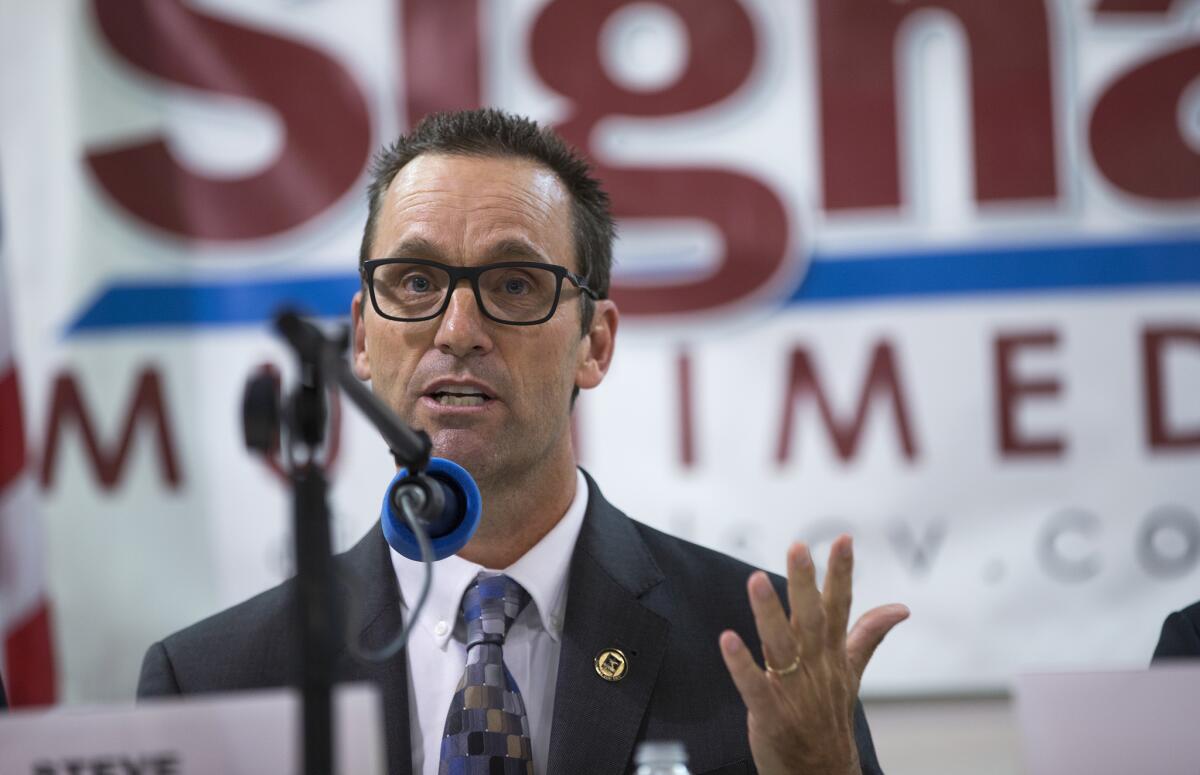
Rep. Steve Knight (R-Lancaster) will hold a town hall meeting in Palmdale next Saturday after weeks of pressure from constituents and protesters for an in-person meeting with the congressman.
Knight, whose sprawling district includes Simi Valley, Santa Clarita and the Antelope Valley, will take questions from the first 275 people who line up outside Palmdale’s Chimbole Cultural Center.
Check-in begins at 7:45 a.m., and the town hall will start at 8:30 a.m. and last an hour. Attendees will have to provide identification to prove they are residents of the district to get into the town hall, Knight’s office said.
Daniel Outlaw, a spokesman for Knight, said the office doesn’t want the concerns of constituents “crowded out” by those who live outside the district.
“Our goal is to serve the people of the 25th [Congressional District],” he said.
Hundreds of protesters descended on Knight’s offices this month to urge him not to vote to repeal the Affordable Care Act.
Knight’s office took cards from protesters and told them to call into telephone town halls. Others protesters targeted a house they believed belonged to Knight.
Recent congressional town halls around the country have been packed with attendees asking pointed questions of their representatives about the Trump administration’s healthcare and immigration policies.
“This town hall meeting is another great opportunity to make your voice heard and have your questions answered,” Knight said in a statement.
- Share via
‘I beg you, keep flexing your power’: Rep. Linda Sanchez gives Democrats’ weekly speech
House Democratic Caucus Vice-chairwoman Linda Sanchez (D-Whittier) in the caucus’ weekly speech urged Americans protesting, calling their members of Congress and turning out in droves at town halls to keep it up.
“I beg you, keep flexing your power,” she said. “The fight we are in right now is not a fight over politics. It is a fight for the future of our country. And we are in this fight together.”
The former union organizer told the story of her parents, who immigrated to the United States from Mexico and worked to put seven children through college. Sanchez and her sister, former Rep. Loretta Sanchez (D-Orange), are the only pair of sisters to serve in Congress.
“My mother and father saved and sacrificed to achieve the American dream for our family. They weren’t handed their success — they earned it,” Sanchez said. “Immigrants like my parents are working and contributing to the success of our country every day. They are starting businesses which create jobs, caring for our children and aging parents, serving in our military and they harvest and prepare the food we eat.”
The weekly address is delivered by a different member of the minority party each week and is meant as a response to the president’s weekly speech. This is the first time Sanchez, who recently became the first Latina in House leadership, has given the speech. It was released in Spanish and English.
“If you share our commitment to the success of working men and women all across our nation, stay with us in this fight,” she said. “Do not give up hope. Do not give in to anger and fear. Do not stop fighting for what you think is best for our country. If we keep up the fight — we will win.”
- Share via
Los Angeles RNC member says Democrats fighting Trump’s ‘sanctuary cities’ policy will pay ‘a terrible, terrible price’

Republican National Committee member Shawn Steel is bullish on President Trump and, despite some skepticism about his rocky start, thinks his tenure in the White House will pay dividends for the California Republican Party.
“He knows he has 100 or 200 days to make these changes. I say you embrace him because there’s a lot more beneficial things he can do for California than vice versa,” said Steele, a former state GOP chairman who was in Sacramento on Friday for the kickoff of the party’s annual convention.
Steele also believes California Democrats fighting Trump’s new policies may face serious consequences, especially in areas defending so-called sanctuary city policies.
“They’re going to pay a terrible, terrible price,” said Steel, an attorney who works in Los Angeles County.
But while Trump has Steel’s support, he said he remains a little wary about the president’s leadership style during his first weeks in office.
“That’s the beauty of having a Trump presidency,” Steel quipped. “You’ve got to look at the Drudge Report every morning: Who did he insult? What changes is he making and what the hell is he doing inside the White House?”
- Share via
Lt. Gov. Gavin Newsom asks Trump for cooperation with California on marijuana regulation
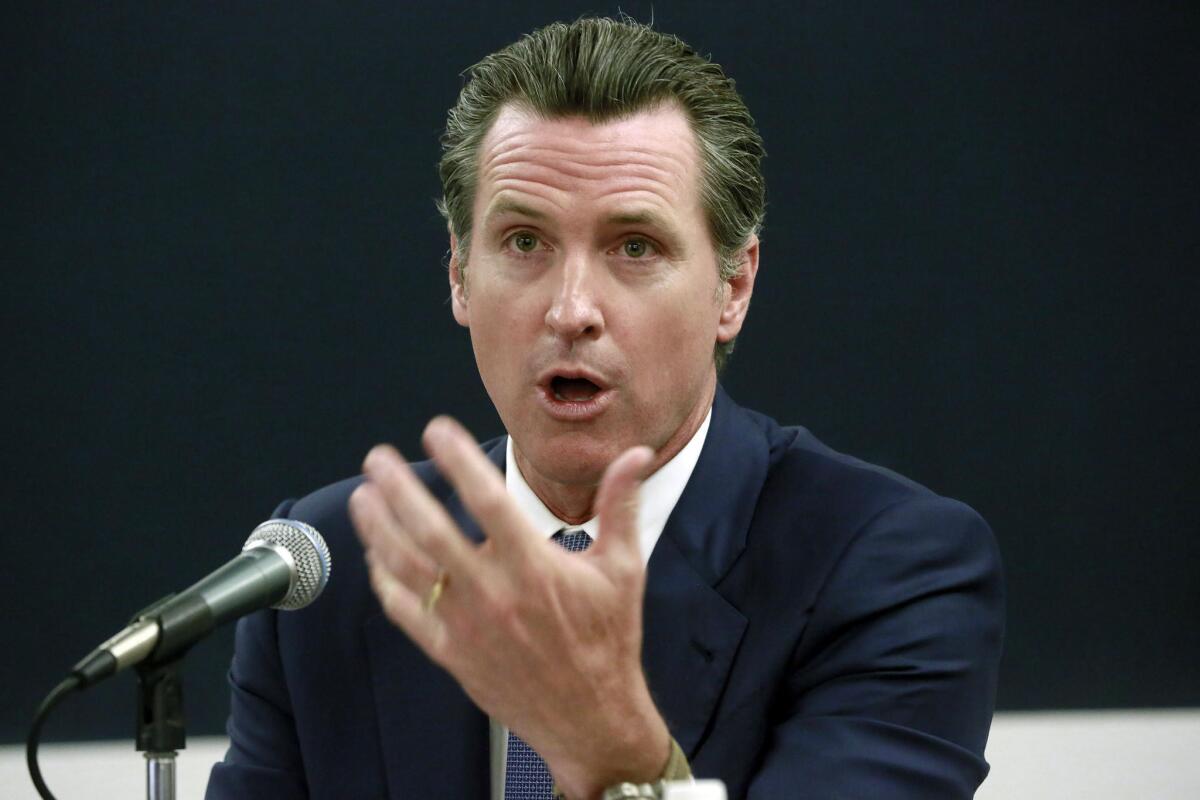
Lt. Gov. Gavin Newsom, a leading supporter of Proposition 64, sent a letter to President Trump on Friday, urging him not to carry through with threats to launch a federal enforcement effort against recreational marijuana firms that will be legalized in California.
The letter, which was copied to Atty. Gen. Jeff Sessions, came a day after White House Press Secretary Sean Spicer told reporters, “I do believe that you’ll see greater enforcement” against recreational-use marijuana.
Newsom’s letter attempts to persuade the president that a regulated market for adult-use marijuana is preferable to what has existed in the past.
“The war on marijuana has failed,” Newsom wrote. “It did not, and will not, keep marijuana out of kids’ hands.”
Proposition 64, approved by voters last November, allows state residents who are at least 21 years old to grow, transport and possess an ounce of marijuana for recreational use. The state expects to issue licenses to growers and sellers early next year.
“The government must not strip the legal and publicly supported industry of its business and hand it back to drug cartels and criminals,” Newsom wrote to Trump. “Dealers don’t card kids. I urge you and your administration to work in partnership with California and the other eight states that have legalized recreational marijuana for adult use in a way that will let us enforce our state laws that protect the public and our children, while targeting the bad actors.”
Newsom also took issue with comments by Spicer likening marijuana to opioids.
“Unlike marijuana, opioids represent an addictive and harmful substance, and I would welcome your administration’s focused efforts on tacking this particular public health crisis,” he wrote.
- Share via
Conflict or cooperation with President Trump? Gov. Jerry Brown sees an opportunity for both
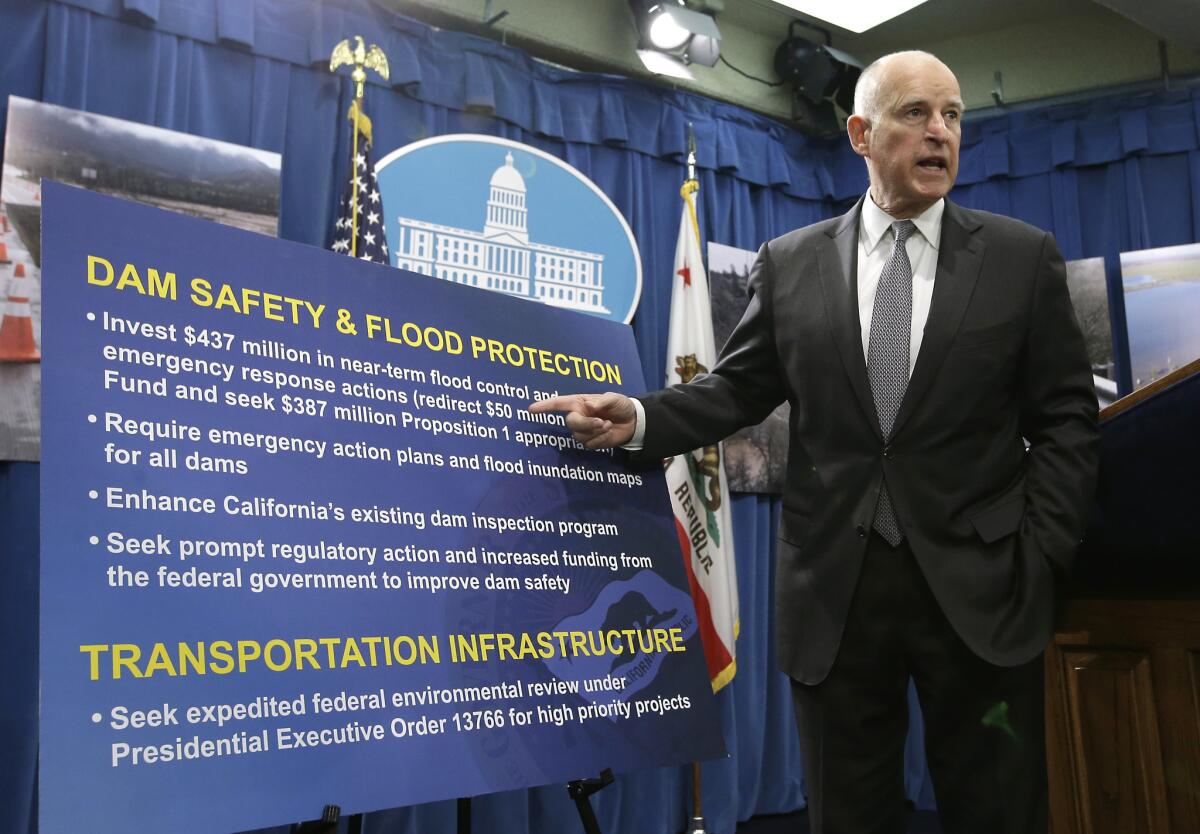
Gov. Jerry Brown’s press conference on Friday wasn’t just a chance to talk about the problems plaguing an increasingly soggy California. It was also a window into the complicated dance between the governor and and President Trump.
Brown leads one of the country’s most diverse and Democratic states, with a large population of immigrants in the U.S. illegally who have concerns about the new president. He also has sharp disagreements with Trump on climate change, which the governor views as an existential threat.
But Brown is also counting on help from Washington on other issues, such as financing the bullet train from Los Angeles to San Francisco. On Friday he asked Trump to expedite environmental reviews for repairs to the Oroville Dam spillway, as well as several other highway and public transit projects.
“I welcome the opportunity to work with you in improving America’s infrastructure,” Brown wrote.
It’s a different tone than has been struck by top Democrats in the state Legislature, who have clamored for high-profile opportunities to denounce Trump and use state law to block his agenda here.
Asked if he was concerned about adversarial relationships jeopardizing access to federal help, Brown said he was seeking the right balance.
“We have to walk a very thoughtful line here, seeking help that we need, but also calling attention to those things we object to, and fighting vigorously when required,” he said.
Brown said he would handle the relationship with Washington “in very discrete, sequential steps, based on the needs of the hour.”
Trump has talked about a potential $1-trillion plan for nationwide spending on infrastructure. With roughly one-eighth of the country’s population, Brown said California should get a proportional amount of the money.
- Share via
Gov. Jerry Brown proposes speeding up water and flood-protection projects after the winter’s big storms
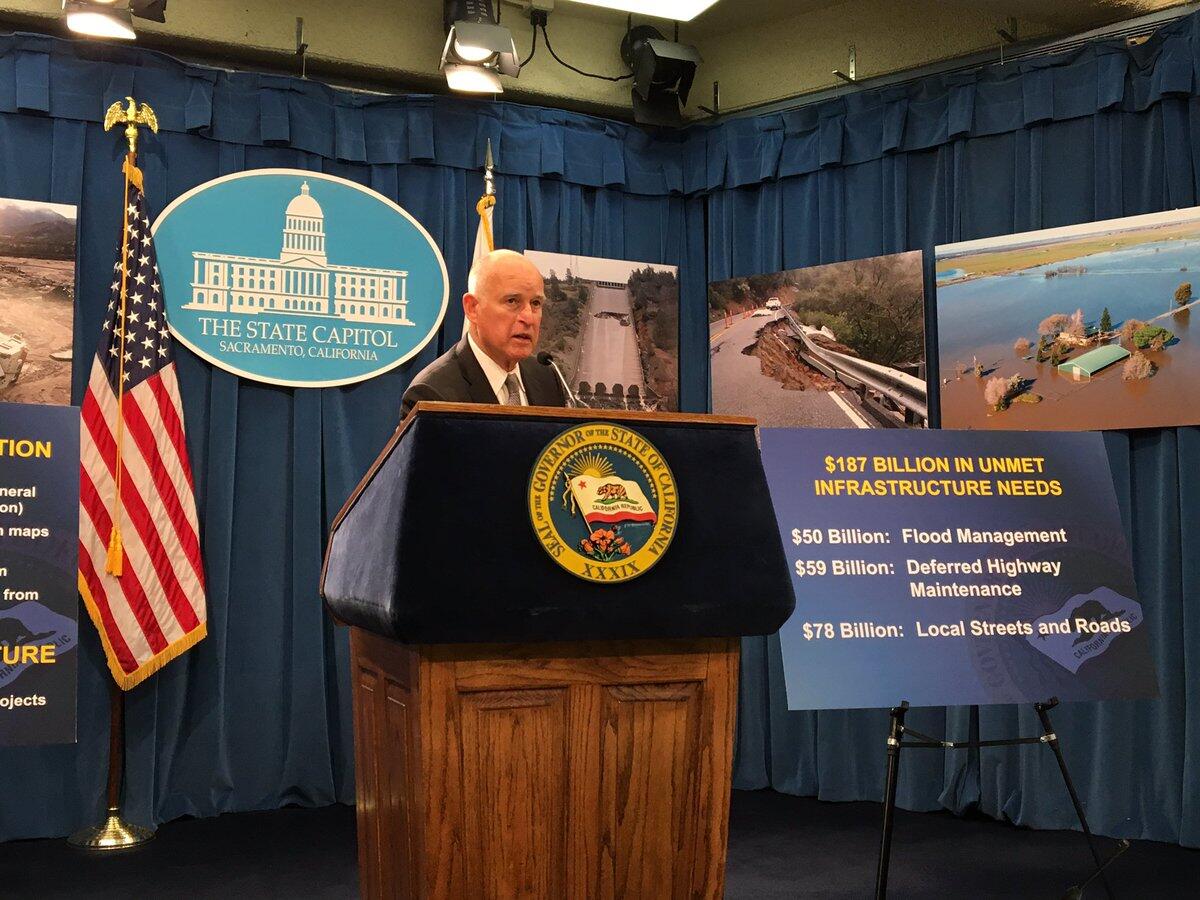
Gov. Jerry Brown on Friday unveiled a $437-million plan for shoring up some of California’s most pressing water and flood-control needs, saying the storms of January and February have made clear the state has substantial needs that have gone unmet for years.
“We have our aging infrastructure and it’s maxed out,” Brown said during a news conference at the state Capitol.
The plan, largely an acceleration of existing plans to fund infrastructure needs, requires approval of the Legislature. In addition, Brown asked President Trump for expedited environmental review of a handful of repair projects, including fixes to the spillway system at the Oroville Dam.
“These liabilities are a serious cloud, and we have to take them seriously,” Brown said.
The governor’s actions come on the heels of a winter storm season that has left thousands of Californians scrambling from fast-moving floods and two incidents — in Oroville and at Lake Don Pedro — of swollen dams forcing emergency releases of water.
The centerpiece of his proposal unveiled on Friday is the acceleration of $387 million in bond borrowing approved by voters in 2014. Those dollars would go primarily to providing new flood protection in the Central Valley and the Sacramento-San Joaquin River Delta. The specific projects have yet to be identified. Brown’s advisors say the goal is to spend the money over a two-year period, instead of previous plans to do so over five years.
Brown took pains to point out that state officials were unlikely to have known what else was needed in places such as Oroville without the real-world test provided by the winter storms.
“There will be problems, we will not live a trouble-free existence,” the governor said.
Even so, Brown admitted the new effort is only a small down payment on the state’s infrastructure to-do list. Officials pegged that long-term price tag at $187 billion, a list that includes deferred maintenance on California highways as well as repairs to local streets and roads.
- Share via
Gov. Jerry Brown proposes $437-million fix for flood control and emergency response needs
- Share via
California Republicans are looking for a comeback in 2018. Here’s the chairman’s game plan for getting there
As the California Republican Party looks ahead to a high-stakes governor’s race and midterm elections in 2018, it faces a grim reality: A Republican hasn’t been elected to statewide office here in more than a decade, and the Democrats hold a powerful supermajority in the state Legislature. The GOP’s share of registered voters in California is just 27.3%, its lowest since 1980, and it has yet to field a prominent candidate in the 2018 governor’s race.
State GOP Chairman Jim Brulte vows that the party’s fortunes will improve in the 2018 election, including one or two top-shelf candidates running for governor.
Donald Trump’s election provides an opening, Brulte said. California’s Democratic leadership is so focused on battling the new Trump administration that they are ignoring growing concerns at home over the state’s crumbling infrastructure and rising poverty, he said.
“We are looking for opportunities where Democrats are out of step with the districts they represent because they are bowing down to a liberal Washington Democrat establishment that is fundamentally out of touch with where the country is, and where California is,” Brulte said in a recent interview.
The difficulty will be convincing Californians that Republicans have the answers, especially as GOP leaders in Washington dismantle the Affordable Care Act, crack down on immigrants in the country illegally and strip away environmental protections — moves that are popular with a conservative base, but don’t play well out West.
- Share via
Protesters dodge sprinklers at Rep. Dana Rohrabacher’s Costa Mesa house
A group of activists who went to Republican Rep. Dana Rohrabacher’s home Thursday night asking for a meeting say they found a closed door and, soon after, the sprinklers turned on.
Activists with the Service Employees International Union, Courage Campaign and other groups tried to visit the California homes of half a dozen Republican members of Congress that night.
A group of about 100 Costa Mesa residents met at the Newport Public Library and held candles as they walked to Rohrabacher’s home. Costa Mesa police partially stopped traffic in front of Rohrabacher’s home, and the group held a candlelight vigil outside.
After an SEIU organizer went to knock on the front door, the sprinklers were turned on, Courage Campaign organizer Darcie Olson of Costa Mesa said.
After a while, Olson said, she walked through the sprinklers to knock on the front door. Two men answered and told her she was trespassing on private property, Olson said.
“They told me to get off his property, and I was like, ‘OK. I not going to fight with you about that,’” Olson said.
No other participants walked onto Rohrabacher’s property after that, she said.
Rohrabacher’s spokesman, Ken Grubbs, said in an email that the lawmaker was holding a barbecue with friends after a day of meeting with constituents.
“The watering ban now over, he turned on his sprinklers during the evening hours, as many Southern Californians do. When he did so, he noticed no protesters in the vicinity. If any protesters thought he turned the sprinklers on them, it would be in keeping with their self-conception of the world revolving around nobody else but them,” Grubbs said.
Olson laughed upon hearing the explanation. Photos show dozens or people outside the home, with at least one holding a bullhorn.
“Somehow that’s so appropriate that Dana would do that. There he goes again, an inappropriate response,” she said. “I don’t know why he’s fighting so hard just not to sit down with his constituents.”
Grubbs said there are more productive ways for the congressman to reach constituents.
“When people show up at his door with signs and bullhorns, he is perfectly aware that the incivility springs from Indivisible guidelines to disrupt rather than engage in dialogue. He chooses not to take their disingenuous bait. He reaches vastly more constituents and hears their concerns by far more productive means,” he said.
- Share via
California Republicans are gathering in Sacramento this weekend. Here’s what’s on the agenda
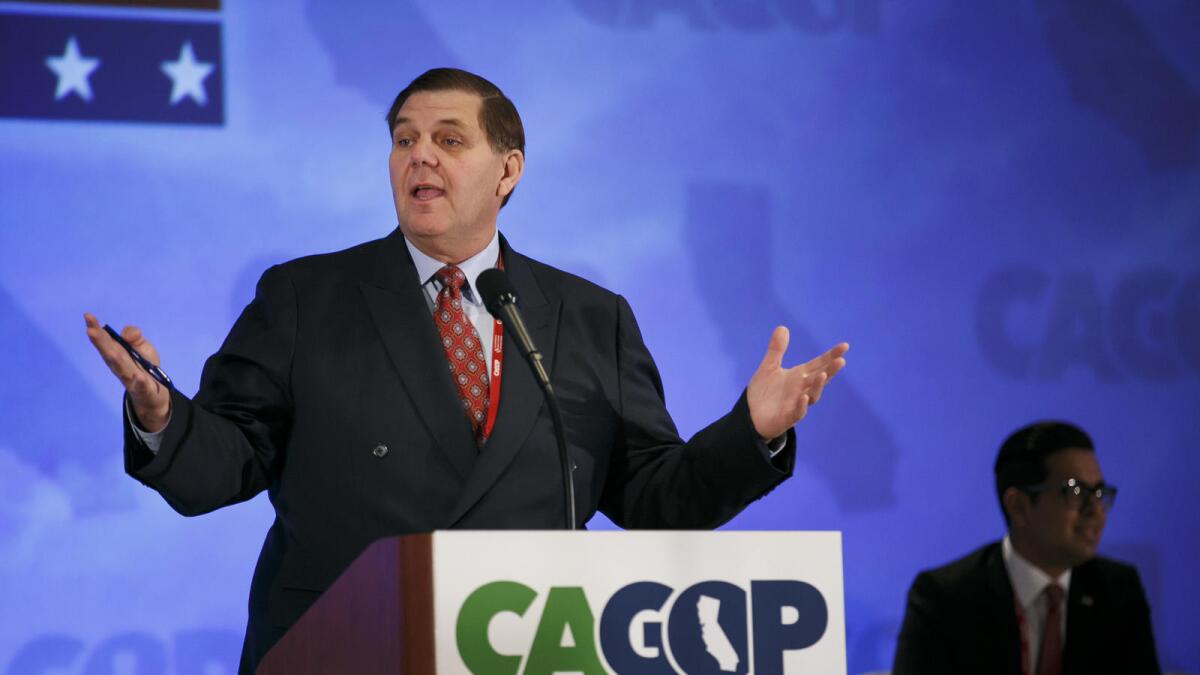
California Republican activists and state party leaders have descended on Sacramento for their annual convention, which runs Friday to Sunday.
While it’s not expected to be quite as eventful as last year’s event in Burlingame, when an appearance by Donald Trump was met with protests, there are a few key things on the state GOP’s agenda as the party looks to rebound in 2018.
Party delegates will decide on their top party leaders, including whether chairman Jim Brulte should be granted a third term. Members will also consider proposed party rules and a slate of resolutions, including one supporting the repeal of the Affordable Care Act and another condemning sanctuary cities.
Conservative radio host Hugh Hewitt will speak at a dinner tonight, while Central Valley Republican Rep. Devin Nunes will headline the Saturday night banquet.
Citing concerns about protests, convention organizers have spent thousands of dollars to beef up security around the convention taking place at the Hyatt Regency and Sacramento Convention Center in downtown.
You can follow all the latest updates from the GOP convention here.
- Share via
Fear of disruptions prompts heavy security at California GOP convention
Bracing for protests, the California Republican Party is spending thousands of dollars to heighten security at its annual convention that begins Friday.
On the opening day of the three-day event, at least a half-dozen Sacramento police officers and four private security guards milled around the Hyatt Regency and the Convention Center, the two venues where most of the convention events are scheduled to take place. Four patrol cars were parked near the two facilities.
“The security at this convention is unprecedented — even tighter than when we have had presidential candidates attend,” said former state party chairman Ron Nehring.
In recent history, the sole time there was a greater show of force was at the party’s 2016 gathering in Burlingame because of large, raucous protests prompted by the appearance of then-presumptive GOP presidential nominee Donald Trump.
In a letter to attendees sent earlier this week, state party officials said this year’s measures were being implemented “in light of the current political climate.”
But in a letter between state party officials, the heavy security was attributed to “strong security concerns” raised by the Sacramento Police Department as well as unrest at recent congressional town halls and rumors of potential protests.
“There is information that a protest is being organized on Friday, and there are rumors of another, more militant, group protesting on Saturday, although that information” is unconfirmed, GOP executive director Cynthia Bryant wrote in an email to state party leaders. “… I do not want to cause a panic or create unnecessary concern, but I also want to make sure that we have taken every appropriate precaution to ensure the safety of our attendees.”
The state party is urging convention-goers not to wear their credentials in public and is not posting information about meeting locations on its website, Bryant wrote.
Signs reminding attendees to take off their credentials when leaving the convention were posted on doors at the Hyatt.
Bryant wrote that the hotel and the center would be locked down, meaning delegates, elected officials and their guests would need to show their credentials or appear on a registration list to enter either facility. But Friday morning, people appeared to be moving freely at both facilities.
- Share via
Atty. Gen. Xavier Becerra tells Democratic leaders in Atlanta that California will continue battling Trump’s policies
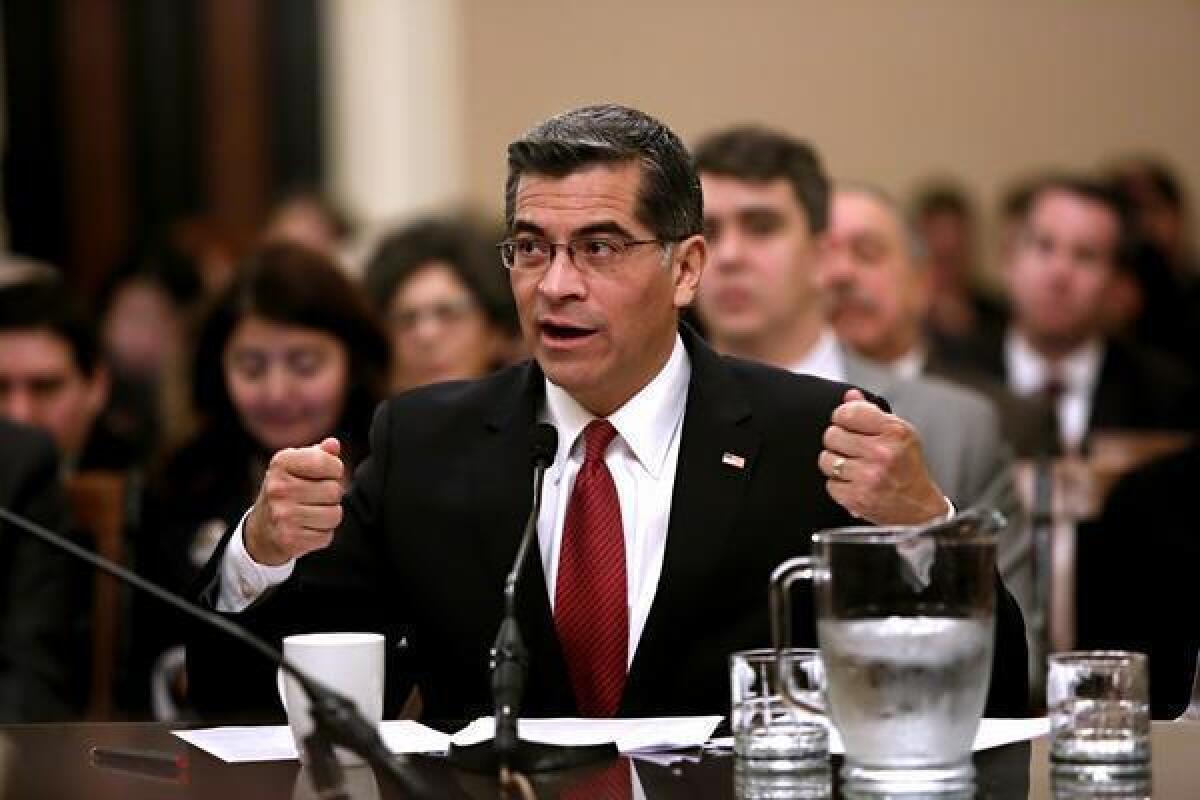
Taking the national stage as a leading foe of President Trump’s policies, California Atty. Gen. Xavier Becerra on Friday told a meeting of the Democratic National Committee in Atlanta that his state is fighting federal efforts to roll back protections for immigrants and the environment.
The large audience at the DNC’s winter meeting cheered as Becerra verbally attacked Trump, using a baseball metaphor to say the Republican president will strike out if he continues to try to undermine important policies of the states.
“Sooner or later the imposters strike out,” Becerra said. “When you play fast and loose with the Constitution and you call for a Muslim ban, the umpire calls you out.”
Becerra also accused Trump of hypocrisy for his own business practices.
“How can a guy who put his name on products manufactured abroad claim to be the one who is going to bring back jobs to America?” Becerra asked. “How do you allow a guy who let Putin into our elections be the safe-keeper of our nuclear codes.”
Becerra was a keynote speaker at the committee’s winter meeting, which includes an election of new leadership on Saturday.
As California’s top attorney, Becerra has joined with attorneys general in other states to file three amicus briefs supporting court cases that challenge Trump’s travel ban, including a lawsuit that led to it being put on hold.
Becerra, who was appointed by Gov. Jerry Brown, has been thrust into the national limelight in part because California is the state with the largest number of immigrants in the country illegally and has been the destination of many refugees from countries targeted by the president’s stalled ban.
The state has policies that provide immigrants with drivers’ licenses, college financial aid and legal assistance to fight deportations. Becerra and others are concerned that Trump will challenge such policies.
The attorney general said California has “seen this movie before” when former Republican Gov. Pete Wilson pushed Proposition 187, which would have denied access to government services to immigrants in the country illegally.
Becerra noted the measure was struck down by the courts and today no Republican holds a statewide office in California.
“In California, Pete Wilson and the Republican Party struck out,” Becerra said. “And California has no intention of being fooled by another imposter. California is not looking back. If there is a state in America that is leaning forward, it’s California.”
Becerra said immigrants should be welcomed as long as they contribute to the country.
“In America its not where you hail from, it’s how hard you work,” Becerra said. “You can be from Indiana or India, Kansas or Kenya, Michigan or Mexico. What counts is, are you a hitter for America.”
The attorney general said he is prepared to fight to keep Obamacare coverage for Californians and to protect other policies.
“In California, we are going to defend every action we have taken to improve the air our children breathe and the water they drink,” he said. “We will fight for everyone in California regardless of their status.”
- Share via
Candlelight vigil outside home protesters believe belongs to Rep. Steve Knight

Darren Parker, California chairman of the Democratic Party’s African American Caucus. (Francine Orr / Los Angeles Times)
Darren Parker, civil rights activist and chair of the California Democratic Party’s African American Caucus
- Share via
Protesters seek out California’s Republican members of Congress at their homes
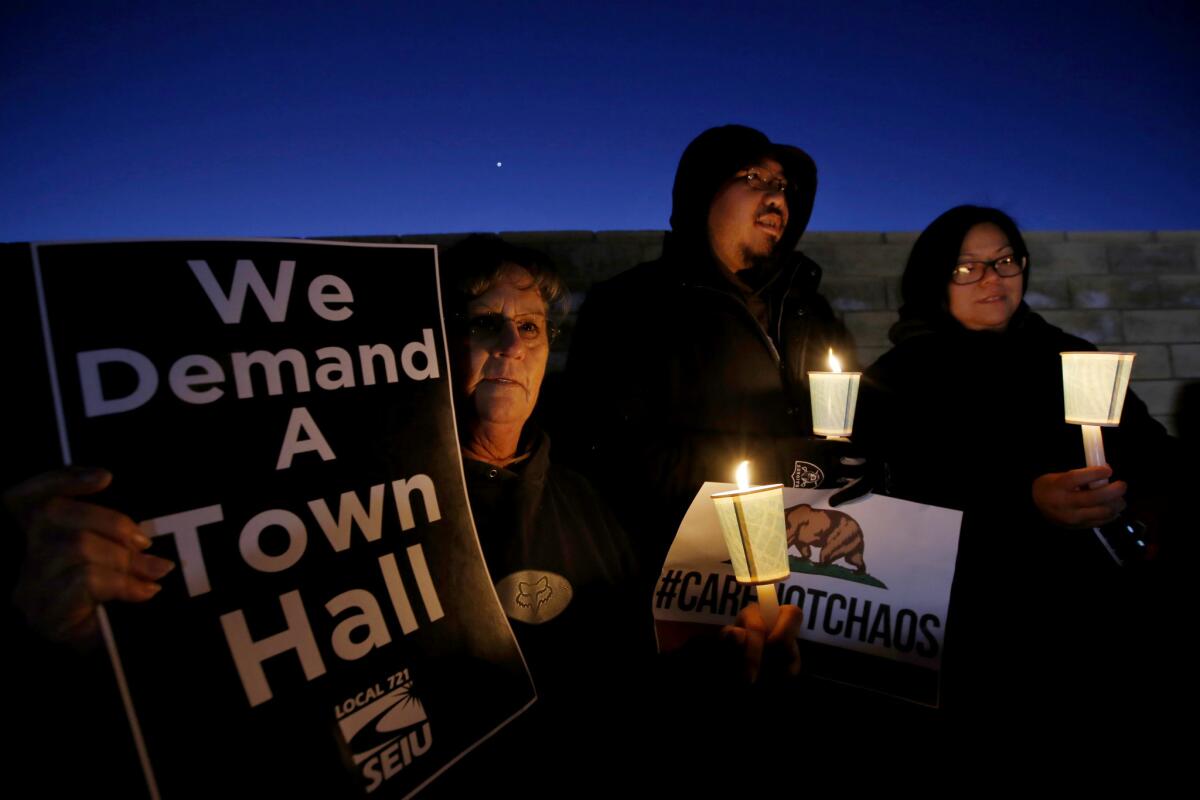
A couple of dozen activists came out to a suburban cul-de-sac in Lancaster on Thursday night, planning to hold a candlelight vigil outside Rep. Steve Knight’s house, part of a statewide effort targeting seven GOP representatives.
The protesters were there in large part to demand a town hall meeting with Knight to discuss the Trump administration’s immigration and healthcare policies.
A problem quickly emerged as protesters neared a home they believed belonged to Knight: Two neighbors said the congressman and his family moved out in the last few months.
Minutes later, a Los Angeles County sheriff’s deputy asked the protesters to get off the home’s driveway, and the activists shuffled back to their cars.
Lilia Galindo, who hosts a bilingual radio show in the Antelope Valley aimed at the region’s growing Latino population, said she was frustrated Knight had not had a town hall since the election.
“He shouldn’t be afraid of us,” she said. “He should meet with us.”
About 200 people held a similar demonstration outside Rep. Darrell Issa’s home in Vista, north of San Diego. He was at another event, but his staff handed out cookies.
Darren Parker, a local civil rights activist and the chair of the state Democratic Party’s African American Caucus, said organizers with the Service Employees International Union believed Knight lived at the Lancaster house.
Despite that, Parker said, there was still merit in the protesters bringing their message to Knight’s former community.
“There is so much uncertainty and fear for what is coming next,” he said.
- Share via
Rep. Duncan Hunter’s office says he will no longer meet with protest groups
Rep. Duncan Hunter (R-Alpine) will no longer meet with constituent activist groups that have peppered his offices in recent weeks, according to a letter Deputy Chief of Staff Mike Harrison sent to a local Indivisible group.
Indivisible San Diego spokeswoman Tahra Ludwig of Alpine said the group has met with Harrison for the last few weeks. She said the meetings have involved six people at a time entering the congressman’s district office to discuss their various concerns. The larger group of up to 150 people have waited outside the building with signs, she said.
“We had been going in and peacefully having a discussion,” Ludwig said. “We’re not shouting at him or anything like that.”
The letter was emailed to Ludwig and two other organizers Wednesday afternoon and began circulating on social media Thursday.
“While protests are obviously allowed on public areas in accordance with local code, it should be noted that visitors who do not leave the congressional office when asked to do so are trespassing,” the letter says.
Harrison says in the letter that Hunter’s El Cajon and Temecula staffs have tried to be accommodating and meet with members of the protest groups.
“We have accommodated every request, regardless of size, and the subject of these discussions has been directly conveyed to Congressman Hunter on a regular basis,” the letter says. “Despite repeated requests to the leaders of these groups for cooperation, our office has consistently experienced protest participants filming in the office against our policy. Constituents visiting the office for assistance, including refugees and immigrants, found their way impeded and were in some cases intimidated to enter. Our neighbors have had their businesses disrupted and we have witnessed local law enforcement being disrespected, which is unacceptable. As a result, Congressman Hunter has made the decision that his office will no longer be accepting meeting requests with these groups or their representatives.”
Harrison said by phone that while the small group would come into the office for a cordial conversation, the large group that remains in the parking lot is blocking traffic and bothering nearby businesses. On Tuesday, Harrison spoke to the larger group outside the office for more than an hour.
“We cannot have six people come into the office and 150 people outside, it’s not working,” Harrison said. “It was just coming to the point where it was becoming unsafe. We just don’t have the space for this kind of dialogue.”
He said constituents were nervous about entering the office with such a large group protesting outside, and that meetings with the Indivisible group often lasted more than an hour.
“We do everything that we can to make sure that people are [heard] but our district office is also there to provide constituent services,” he said. “Obviously there are certain limitations in terms of certain sizes.”
Ludwig said the first time Harrison mentioned the group should refrain from filming in the office was last week.
“I’m really not sure where this is all coming from,” Ludwig said.
The letter isn’t keeping Indivisible San Diego from holding a scheduled protest outside Hunter’s El Cajon office at 4:30 p.m. today, she said.
“We are a law-abiding, all-volunteer citizens movement demanding that our elected officials speak to us and hear our concerns. The more they hide, the louder we will get,” Indivisible organizer Kathy Stadler of Claremont said in a statement.
Harrison said Hunter will hold a town hall meeting in the coming weeks, but could not say when.
Updated at 5:25 p.m.: This post has been updated with response from Harrison and a comment from an Indivisible organizer.
This post was originally published at 3:59 p.m.
- Share via
A state senator is removed from the chamber for her comments about Tom Hayden and Vietnam
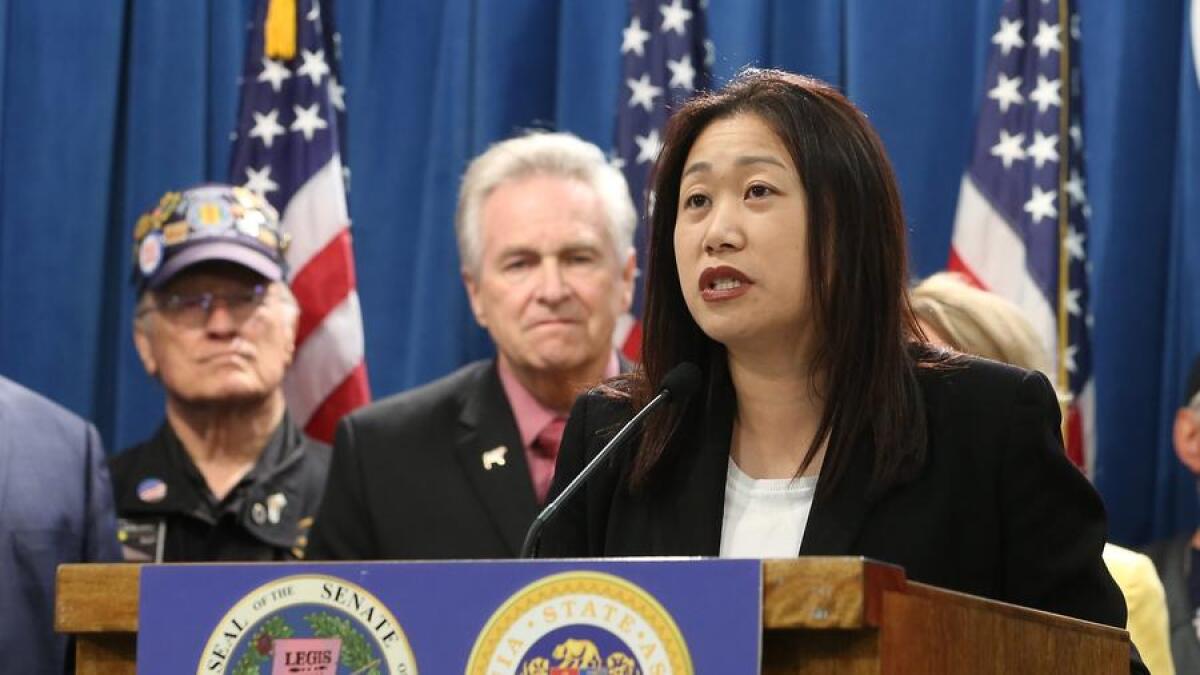
After trying to make a statement about the late Tom Hayden and his opposition to the Vietnam War, Sen. Janet Nguyen (R-Garden Grove) was removed from the floor of the state Senate on Thursday, a tense scene that ended in a slew of angry accusations from both Republicans and Democrats.
Nguyen, who was brought to the United States as a Vietnamese refugee when she was a child, said she wanted to offer “a different historical perspective” on what Hayden and his opposition to the war had meant to her and other refugees.
Hayden, the former state legislator who died last October, was remembered in a Senate ceremony Tuesday.
Nguyen’s comments were interrupted by the Senate’s majority leader, Sen. Bill Monning (D-Carmel), who said she was “out of order.” Nguyen, however, refused to stop talking. The presiding officer for the day, Sen. Ricardo Lara (D-Bell Gardens), then instructed the Senate’s sergeants-at-arms to remove the Republican lawmaker from the floor.
“I’m very sad because the very people who elected me to represent them and be their voice on the Senate floor, I wasn’t allowed to speak on their behalf,” Nguyen said later in an interview with The Times.
Democrats insisted that the incident was caused by Nguyen’s choice to use what’s known as a “point of personal privilege” to close the session — a choice they said was inappropriate. Dan Reeves, chief of staff to Senate President Pro Tem Kevin de León (D-Los Angeles), told reporters that Nguyen had been offered the chance to speak at a different time.
“She got exactly what she wanted, which wasn’t to speak,” Reeves said. “She wanted to cause a scene for her district.”
Nguyen said she was told by Democratic leaders of the Senate to post her statement online, and not offer it during Thursday’s floor session. Later, they suggested she speak after the adjournment motions, but Nguyen said she was told by parliamentary rules officials she could not do so.
“I was told I cannot speak on the issue at all,” she said.
Hayden was an outspoken critic of the Vietnam War and made celebrated trips to North Vietnam and Cambodia, offering to help broker a peaceful end. Nguyen, who did not speak during the remembrance of Hayden earlier in the week, said the late Democratic activist’s efforts were seen differently by refugees and “all those who fought in Vietnam for freedom and democracy.”
In the statement which she later posted on her official Senate website, Nguyen criticized Hayden for siding “with a communist government that enslaved and/or killed millions of Vietnamese, including members of my own family.”
At an unrelated event after the Senate session, De León told reporters he planned to speak with Nguyen and take a closer look at the circumstances surrounding the unusual event.
Update 4:40 p.m. This story has been updated with additional information about the statement the senator was attempting to read when she was removed from the Senate chamber.
- Share via
California’s gay and lesbian lawmakers condemn Trump’s action on transgender students
California’s gay and lesbian state legislators lambasted President Trump’s decision to rescind federal guidelines protecting transgender students as an “egregious attack” on Thursday.
“The Trump administration is the real bully here, and they are putting our LGBTQ community and progress at risk,” Sen. Ricardo Lara (D-Bell Gardens) said.
Lawmakers and advocates made a point to emphasize that the Trump administration’s action does not change existing protections in California. The Obama administration determined that Title IX, which forbids federally funded schools from discriminating on the basis of sex, protected the gender identities of transgender students.
A 2013 California law made clear that transgender students can use bathrooms and other facilities that correspond to their gender identity, even if it does not match their biological sex.
Assemblyman Evan Low (D-Campbell), the chair of the legislative LGBT Caucus, said that when it comes to safeguarding rights for transgender people, “we will leave no stone unturned. We will ensure that we have the types of protections in this state for the most vulnerable in our communities.”
He did not specify any specific legislation that would be introduced in the wake of the Trump administrations action, but said the caucus was “exploring all options.”
- Share via
Assemblyman Jimmy Gomez scores an endorsement from a labor heavyweight in the congressional race to replace Becerra
- Share via
Cities and counties tell legislators they’re struggling to keep up with the legalized marijuana industry

As state officials scramble to begin licensing marijuana sales by the end of the year, cities and counties have already begun issuing their own permits for medical pot and putting local regulations and taxes in place, officials said Wednesday.
City and county officials throughout California testified during a hearing of the Assembly Local Government Committee and said problems are already cropping up. They include skyrocketing property prices in popular growing areas that are keeping out farms that don’t grow pot, large sums of cash handled outside of banks and inadequate staffing that has slowed the process of issuing and enforcing local licenses.
Because marijuana remains illegal under federal law, banks will not handle revenue from sellers, so dispensary operators brought $4.6 million in cash to Sacramento City Hall to pay taxes and fees last year, according to Randi Knott, director of government affairs for the city.
“It is literally folks coming in with duffel bags full of cash,” Knott said.
Humboldt County has issued dozens of growing permits and is processing more than 1,000 applications that have been filed, according to county Supervisor Rex Bohn.
“We’ve made some mistakes,” Bohn told a legislative panel. “We are inundated. We are bringing in people left and right to implement this. We want to get a control on it. We want to get it out of the shadows.”
Humboldt already has a tracking system that allows the county to follow marijuana from farm to sale.
Yolo County has so far licensed 32 growing operations with rules prohibiting the farms from being within 1,000 feet of schools or becoming a nuisance to neighboring residents, according to John Young, a county agricultural commissioner. The skyrocketing land prices are making it hard for new, conventional farmers to move into parts of the county, he said.
Monterey County has adopted a zoning ordinance keeping medical pot operations out of residential areas, requiring growing to be done indoors, and requiring a permit fee and tax, according to Mary Zeeb, the county treasurer-tax collector.
She said the Sheriff’s Department has seen its services strained to keep an eye on marijuana growers, which she said face “high potential for theft and criminal activity.”
Zeeb said taxes are expected to bring the county $22.5 million. But the county has “serious concerns” about the lack of banking to handle the cash, she said.
Arcata City Councilman Mark Wheetley said at one point that 20% of the small college town’s 5,000 residential units had become grow houses for marijuana, so the city had to set limits and step up enforcement.
- Share via
This California gubernatorial candidate wants state-funded ‘universal basic income’ for everyone
Zoltan Istvan, whose long-shot presidential campaign in 2016 included a campaign bus shaped like a coffin, says he’s jumping into California’s 2018 race for governor.
Istvan will run as a Libertarian and said his campaign will focus on the radical economic and lifestyle transformations being brought about by new technology and science, from the impacts of driverless cars to genetic engineering.
“Someone has to step forward with more radical policies than are being put forth so far,” he said during a telephone interview from his home in Mill Valley.
Istvan, whose full name is Zoltan Istvan Gyurko, said he also supports providing a state-funded “universal basic income” for all Californians. The income would help sustain the poor and sick and provide a cushion for those displaced in the high-tech economy, he said, such as truck drivers who may lose their jobs due to the advent of autonomous big-rigs.
Istvan, a writer, said he made a small fortune fixing up and selling homes in California and Oregon. His wife is a doctor, and the couple have two young daughters.
During his run for president, Istvan, 43, campaigned on a platform that advocated for advances in science, health and technology to extend human lifespan and intellect.
To draw attention to his cause, Istvan fashioned his campaign’s “immortality bus” into the shape of a wooden coffin.
It worked. His campaign drew a fair amount of coverage for an independent candidate, and earlier this month he was featured in a New York Times Magazine article.
- Share via
Activists plan vigils and ‘search parties’ Thursday near the homes of California’s Republican members of Congress
After weeks of protests outside the offices of Republican members of Congress failed to persuade them to hold town halls meetings, activists are planning “search parties” and candlelight vigils outside the homes of seven California representatives Thursday evening.
The rallies, largely centered around immigration and healthcare concerns, will focus on the homes of Reps. Jeff Denham (R-Turlock), Devin Nunes (R-Tulare), Kevin McCarthy (R-Bakersfield), Dana Rohrabacher (R-Costa Mesa), Ed Royce (R-Fullerton) and Steve Knight (R-Lancaster). Activists also plan to demonstrate outside the office of Rep. David Valadao (R-Hanford) at noon.
Members of Congress are back in their districts for the week, and more than a dozen Democrats scheduled town halls while they are home. So far, Rep. Tom McClintock (R-Elk Grove) is the only one of California’s 14 Republican members to hold a town hall this week. Rep. Darrell Issa (R-Vista) met with protesters outside his office.
Members of several Service Employees International Union chapters and the California-based Courage Campaign are participating in Thursday’s events along with other activists.
“With Congress poised to take action on issues that literally have life-and-death consequences — including access to affordable healthcare and the protection of undocumented Americans from unjust detention and family destruction — it is frankly pathetic that California Republicans are too afraid to meet with their constituents and discuss their concerns,” Eddie Kurtz, executive director of the Courage Campaign, said in a statement. “If our democratically elected representatives don’t have the guts to stand face to face with their constituents and explain their decisions — then they shouldn’t be voting to destroy our access to affordable healthcare or launch a war against against our immigrant communities.”
- Share via
California’s air regulator welcomes two lawmakers to its board
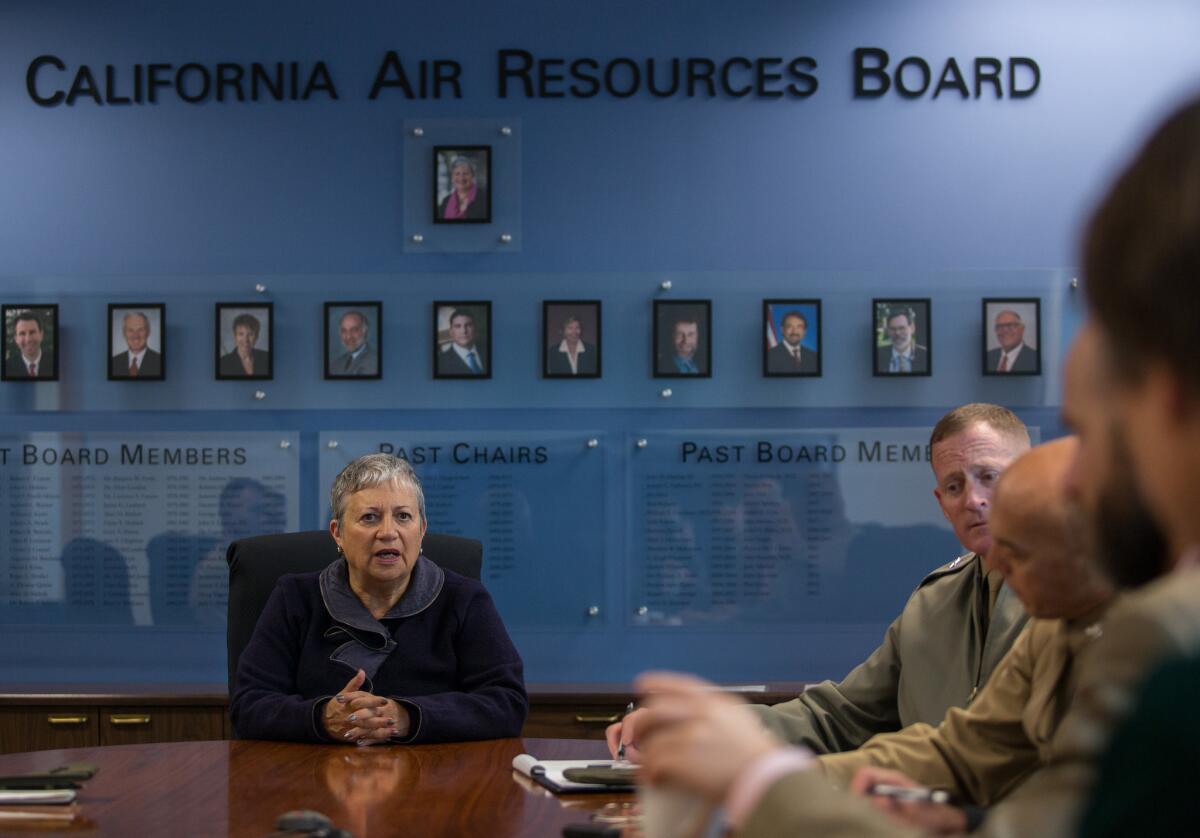
Over the years, lawmakers have repeatedly complained that the California Air Resources Board hasn’t heeded their concerns about the state’s environmental policies.
Now two lawmakers, state Sen. Ricardo Lara (D-Bell Gardens) and Assemblyman Eduardo Garcia (D-Coachella) will have positions on the board, a step authorized under legislation passed last year.
Neither of them will be able to cast votes, but lawmakers hope they’ll have a voice on how regulators pursue programs on climate change and air quality.
They’ve both said state officials should find new ways to apply climate policies to local concerns about public health and job growth.
“The residents of my district who live in the industrial heart of Southeast Los Angeles County and alongside the nation’s busiest port and trade corridors breathe some of the most polluted air in the nation, and too many suffer from poor health and lowered life expectancy,” Lara said in a statement when he joined the board earlier this month.
Garcia was sworn in to his position Wednesday by Air Resources Board Chairwoman Mary Nichols.
“This is an excellent opportunity to increase collaboration between the Legislature and the agency,” he said in a statement.
Adding lawmakers to the board is only one part of the additional oversight that’s supposed to take place under last year’s measure, AB 197, which was authored by Garcia.
Assembly Speaker Anthony Rendon (D-Paramount) named four members to the committee on Friday. It’s unclear if Senate President Pro Tem Kevin de León (D-Los Angeles) has done the same; his spokesman did not immediately respond to a request for comment.
This story has been updated with revised information on committee appointments.
- Share via
Fearing President Trump’s next steps, California lawmakers review their options under Clean Air Act
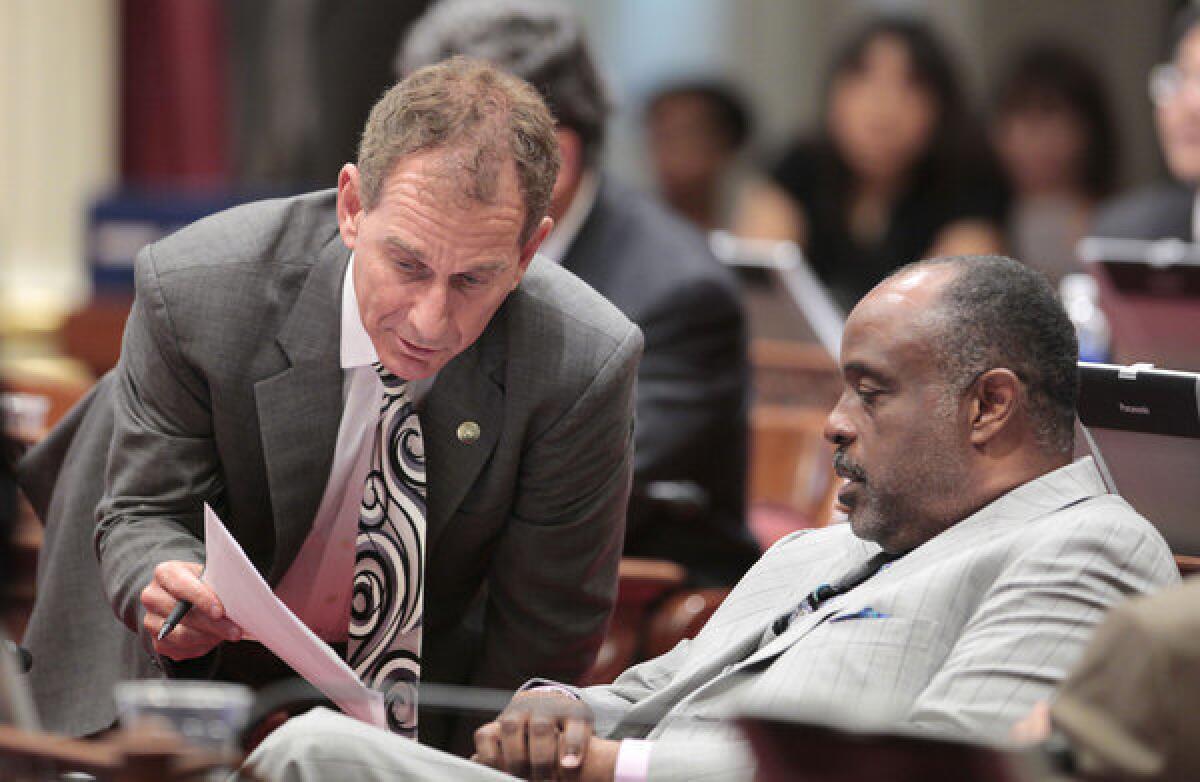
In a sign of uneasiness over President Trump’s environmental agenda, state lawmakers hosted a hearing Wednesday to discuss how California’s air quality policies rely on federal regulations.
Although the state is allowed to pursue stricter rules than federal standards under the nearly five-decade-old Clean Air Act, such steps require a waiver from the federal government. Trump’s choice to lead the U.S. Environmental Protection Agency, former Oklahoma Atty. Gen. Scott Pruitt, has signaled he may be more skeptical of the state’s requests than previous administrators, who granted requests nearly every time they were submitted.
“Nothing in the law has changed to justify the EPA withholding our waiver,” said Senate President Pro Tem Kevin de León (D-Los Angeles), who testified at the hearing. “The only thing that has changed is the balance of political power in Washington, D.C.”
The waivers have been an important tool for California’s efforts to improve air quality in polluted areas and tackle global warming. Other states also can choose to follow California’s lead, meaning waiver requests made from Sacramento can have nationwide implications.
“If Washington doesn’t want to lead on cleaning up our air or fighting climate change, it should stay out of our way,” De León said.
In an interview after the hearing, Sen. Bob Wieckowski (D-Fremont) said it may be more difficult for California to hit its ambitious target for slashing greenhouse gas emissions without new waivers, particularly when it comes to requiring more zero emission vehicles in the state.
“I don’t know if we have any other choice if we’re going to meet these air quality standards,” he said.
But absent a “good healthy relationship” with Washington, he said, “it’s probably better to delay” asking for additional waivers.
Although new requests may be tougher under the Trump administration, state regulators are less worried about legal threats to waivers that already have been granted.
“The state may not receive the same level of cooperation, but we anticipate that our existing waivers ... will not be significantly compromised,” said Kurt Karperos, deputy executive officer at the California Air Resources Board.
However, the state could be in a bind if the federal government loosens rules under the Clean Air Act but refuses to grant California a waiver to keep the previous, higher standards.
“Then we’re stuck,” said Richard Frank, director of the California Environmental Law and Policy Center at the UC Davis.
- Share via
With Obamacare’s future uncertain, hundreds rally at state Capitol for single-payer healthcare in California
The details of their plan are still hazy, but proponents of a single-payer healthcare system in California are already ramping up pressure on lawmakers to back publicly funded universal coverage.
Hundreds rallied at the state Capitol on Wednesday to back SB 562, a measure introduced last week that would establish a single-payer system in California.
The rally was organized by the California Nurses Assn., a union that has long backed universal healthcare and was an ardent supporter of Democratic presidential candidate Sen. Bernie Sanders in his 2016 run. Sanders (I-Vt.) ran on a “Medicare for all” platform, a cause that the nurses have continued to back now that Republicans in Washington are seeking to repeal or overhaul the Affordable Care Act.
Among those in attendance were the bill’s authors, state Sens. Ricardo Lara (D-Bell Gardens) and Toni Atkins (D-San Diego). Lara, addressing the crowd, said the “core values” behind the proposal include coverage for everyone in California, regardless of immigration status, and a clamp-down on prescription drug prices.
The bill itself is, for the moment, short on specifics, including how the new system would be paid for.
Single-payer proposals have surfaced in the Legislature before. In 2006, one such bill made it to then-Gov. Arnold Schwarzenegger’s desk but was vetoed.
RoseAnn DeMoro, executive director of National Nurses United and its California affiliate, said lawmakers would need to grasp “the sea change in the politics of our country.”
DeMoro trained most of her focus on Democratic legislators, whom she said were being pressured by insurers and other industry players to shy away from single-payer.
As for Gov. Jerry Brown, who often preaches fiscal caution, DeMoro said the governor “is not ideologically opposed to single-payer. He’s a pragmatist.” But, she added, supporters must prove such a plan would be viable.
Rally attendees walked a fine line in defending the existing healthcare law — the Affordable Care Act, now under threat — while also arguing it did not go far enough.
“We’re not attacking the Affordable Care Act. It brought some good things. But even if it works perfectly, there’s still 28 million people uninsured,” said Don Behcler, chairman of the San Francisco-based group Single Payer Now.
“Instead of having a second-class healthcare system, we could have a first-class healthcare system in state or national single-payer. If you leave 28 million people out of healthcare, you can’t call it first class,” he said.
Lara, the bill’s coauthor, said the uncertainty over Obamacare’s future offered an opportunity to think about alternatives.
“The important thing is for us to have that discussion now,” he said. “If not now, when?”
- Share via
Republican lawmaker wants California voters to deport felons released from prison who are in the U.S. illegally
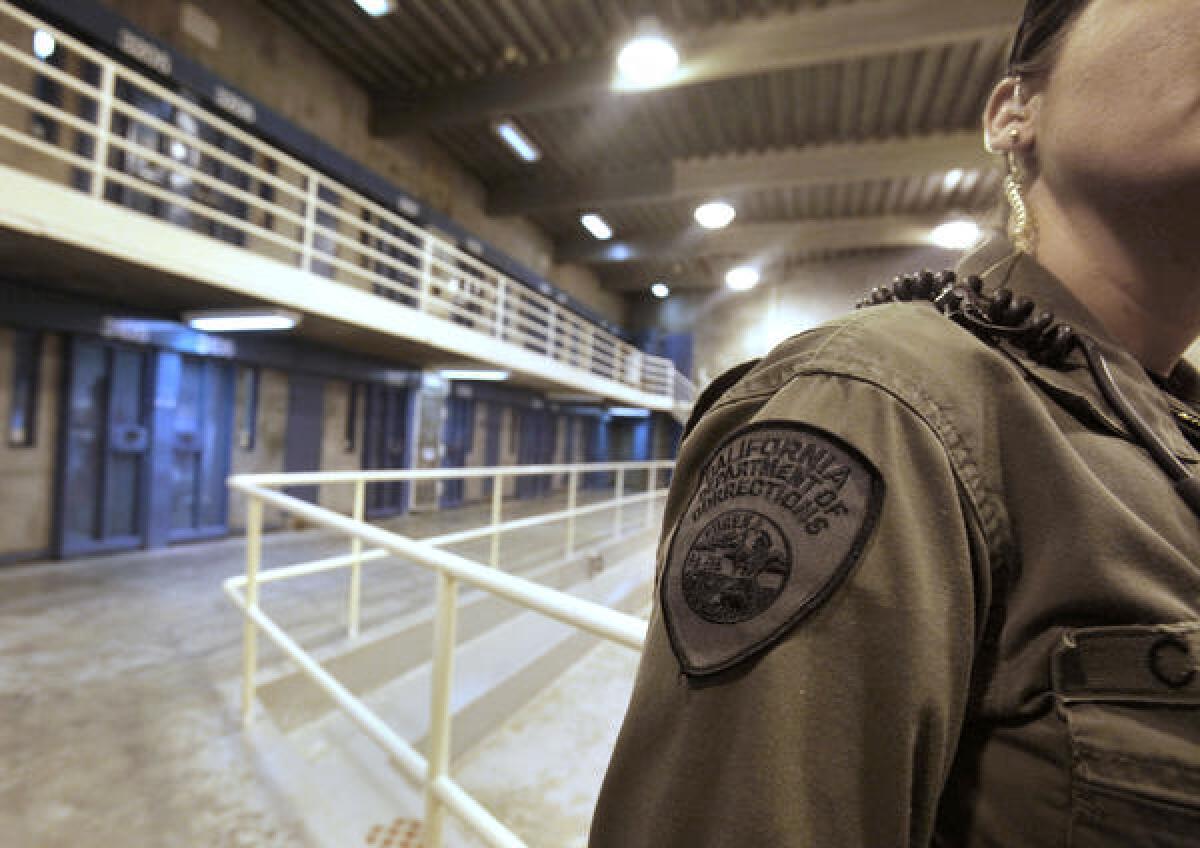
New legislation in the state Senate would ask voters whether violent felons who are in the country illegally should be deported once they are released from prison.
The bill by state Sen. Tom Berryhill (R-Modesto) would place the issue on the ballot in 2018 and would enshrine the mandate in the California Constitution.
”We’re concerned about the public’s safety in California,” Berryhill said Wednesday.
The proposal would apply only to those felons serving time for one of the state’s 23 violent crimes. While current procedures generally include an effort at deportation for those without legal status once they’re released from prison, the new bill goes further. It would deny any public assistance for any ex-felon immigrant who came back to California.
“We take away any privileges if they ever come back,” Berryhill said.
The veteran Republican lawmaker said he doesn’t have data on how many prisoners to which the proposal might apply, though he admitted it was likely a small number. Berryhill also rejected any notion that the effort is politically motivated, though he said the issue is timely given national events.
“With the Trump administration doing what they’re doing, the timing seems to be good,” he said. “It’s on the forefront of everybody’s mind.”
The proposal, a constitutional amendment, would need strong bipartisan support in both houses of the Legislature. Democrats have been largely critical of Trump’s efforts on immigration.
Berryhill, who said he supports immigration reform efforts that would create a path toward citizenship, said he thinks there has been “a little bit of overreaching” by the president.
- Share via
California voters could make it easier to raise taxes to build transit and low-income housing under new legislation
A Sacramento-area assemblywoman wants Californians to decide if it should be easier to raise taxes or issue bonds to finance transit, water, parks and low-income housing projects.
Assemblywoman Cecilia Aguiar-Curry (D-Winters) has proposed a constitutional amendment that would lower the margin needed for local governments to pass a tax hike or bond measure to pay for such efforts from a two-thirds supermajority to 55%.
“Local communities know their priorities best,” Aguiar-Curry said in a release. “This constitutional amendment will offer an important tool for local leaders to support projects and determine how to pay for them.”
Because the measure is a constitutional amendment, it will require a two-thirds supermajority vote of the Legislature to pass. If that happens, state voters will decide whether to lower the threshold to pass these tax hikes in 2018.
Nearly 80% of two-thirds supermajority measures put before local voters since 2001 garnered more than 55% “yes” votes, but ultimately failed because they fell short of the two-thirds threshold, according to Aguilar-Curry’s office.
Sen. Scott Wiener (D-San Francisco) has proposed a similar constitutional amendment to lower the threshold for passage, but only for transportation projects.
- Share via
Killing with kindness, GOP’s McClintock faces down hostile questioners as town hall goes into overtime
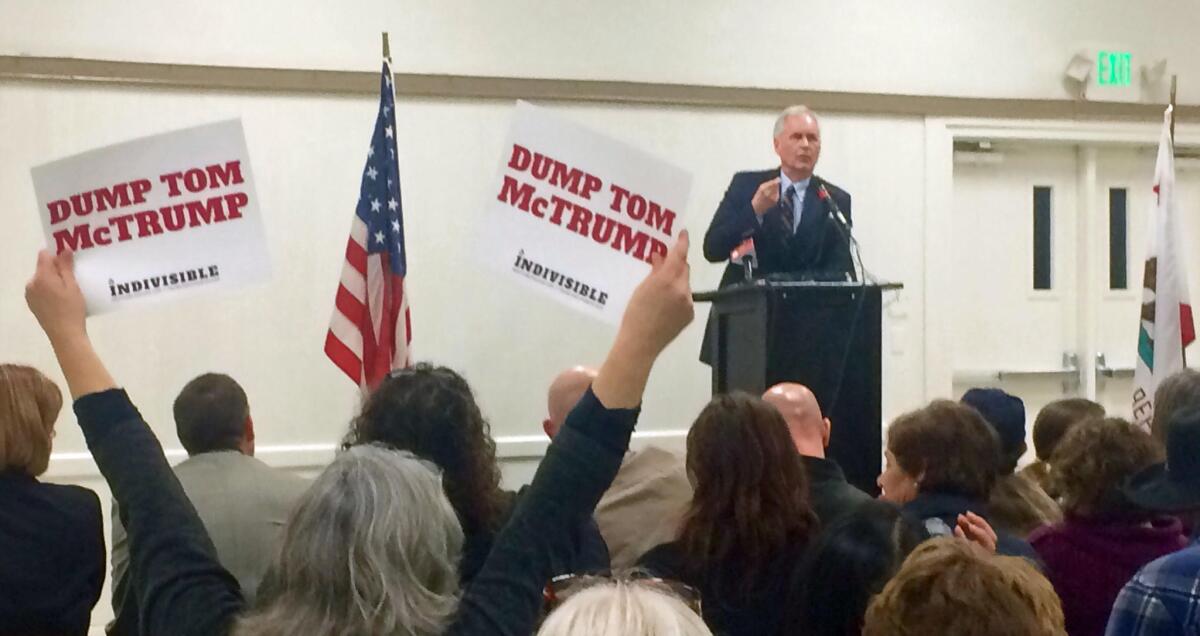
The last time Rep. Tom McClintock (R-Elk Grove) held a town hall meeting, earlier this month in the Sacramento suburbs, he left under police escort.
His session Tuesday night in Mariposa, a small tourist way station on the road to Yosemite, drew plenty of barbed questions, criticizing the five-term GOP congressman and attacking President Trump.
But the more than half-dozen California Highway Patrol officers arrayed around the auditorium at the fairground hardly seemed necessary.
McClintock ceded no ground on his deeply conservative beliefs and staunchly and repeatedly defended the president — often to jeers and catcalls.
But even some of the harshest questions McClintock faced were prefaced with thanks for his willingness to show up early and stay late. Many of his GOP colleagues have ducked such confrontations, refusing their constituents’ requests to meet with them.
“God bless all of you for being here,” he said at one point, after a woman in the audience said the huge turnout — about 900 people — was a show of resistance to Trump. (In fact, about a third or so of the crowd appeared strongly supportive of the president.)
It is highly doubtful if any minds were changed during the session, which went more than an hour over schedule.
But in the end, McClintock managed to outlast many of his inquisitors. By the time he took his last question, after more than two hours and 20 minutes, the hall was close to half empty.
- Share via
At Rep. Tony Cárdenas’ town hall, Democrats worry about what President Trump may do
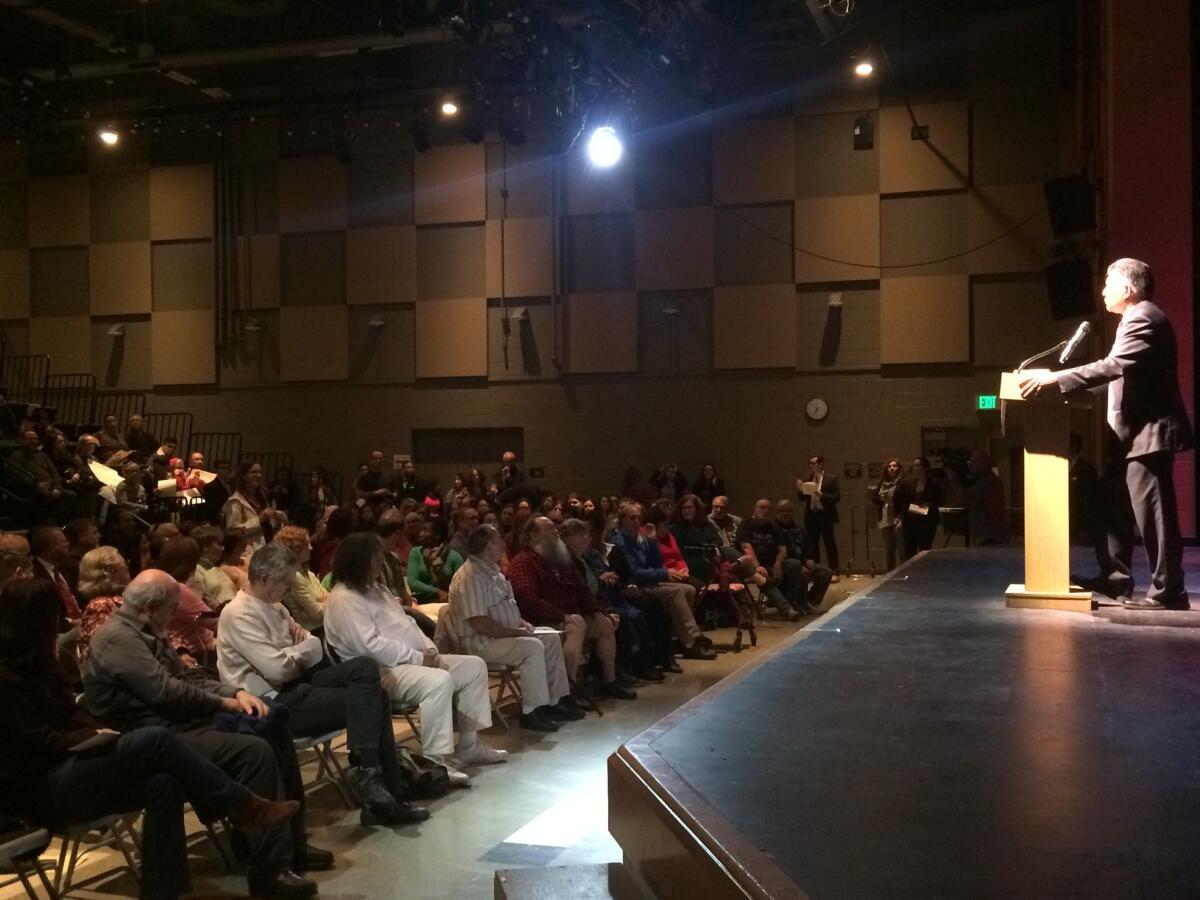
They arrived with soggy jackets, hats and umbrellas.
The topic was supposed to be the Affordable Care Act. But many who attended Democratic Rep. Tony Cárdenas’ town hall meeting Tuesday night in a crammed auditorium at the Cesar E. Chavez Learning Academies came with a question: What can we — as Democrats — do to help you?
“Show up and vote,” said Cárdenas, who represents a slice of the staunchly liberal San Fernando Valley. (Hillary Clinton defeated Donald Trump in this district by nearly 60 percentage points in the fall election.)
“Sign people up, get people involved,” he said.
At times the meeting had the feel of a therapy session for Democrats, wondering aloud how to function under a Trump administration.
“Where is the anger among Democrats?” asked one man. “I want to see more anger.”
Cárdenas, standing at a lectern on an elevated stage, offered a stern look and nodded in agreement as rain could be heard splattering on the roof above.
The complaints included Republicans’ efforts to repeal Obamacare and Trump’s new immigration mandates.
“Trust me, I’m pissed. I’m upset,” Cárdenas said. “But we have to act constructively. We have to be responsible.”
Last month, Trump signed executive orders directing the Department of Homeland Security to prioritize the removal of people in the U.S. illegally who have criminal convictions.
In addition to speeding up the deportation of convicts, Trump’s orders also call for quick removal of people in the country illegally who are charged with crimes and waiting for adjudication.
And in recent days, a handful of people who have received protection under the Deferred Action for Childhood Arrivals policy have been arrested by Immigration and Customs Enforcement agents nationwide.
Cárdenas said that for him, the issue is personal. His parents were immigrants from Mexico who lived in the San Fernando Valley for decades, raising 11 children, he said. Today, his district is nearly 70% Latino.
“I’m going to fight for you,” he said. “I’m going to fight for the people who are my immigrant father.”
When a young man, a DACA recipient, asked him, via Twitter, if he’ll be safe in the weeks ahead, Cárdenas seemed at a loss.
“I pray that [Trump] doesn’t go after you,” he said.
- Share via
Retailers and law enforcement officials want lawmakers to increase penalties for repeated theft on businesses
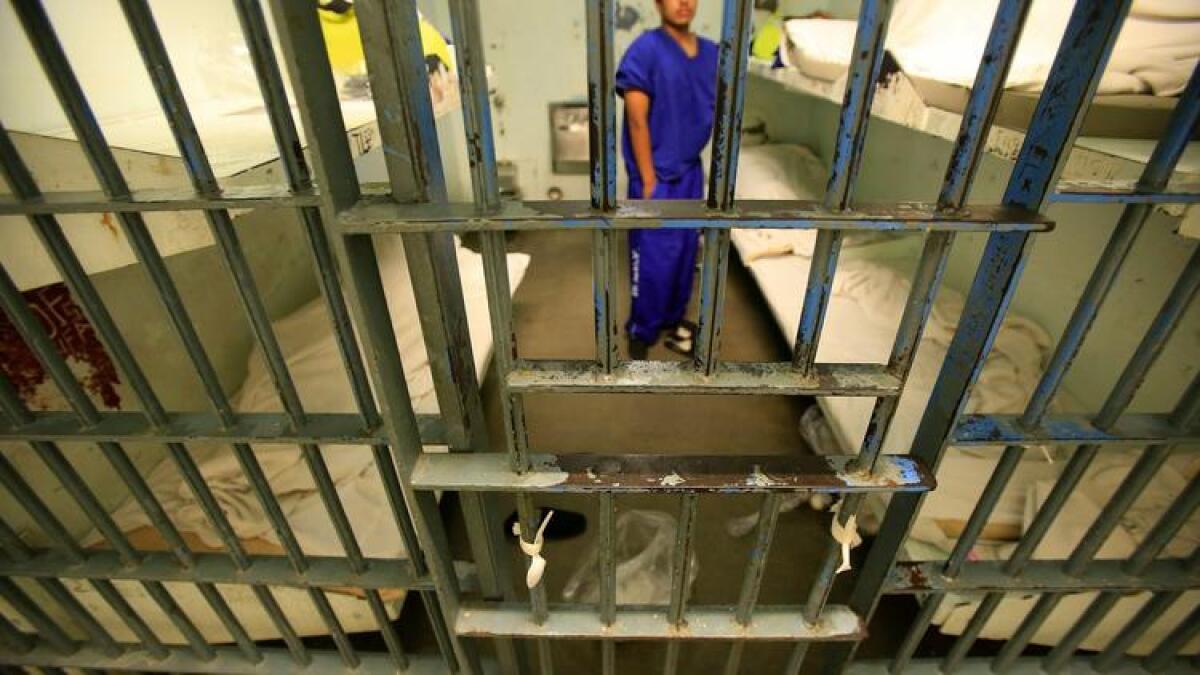
Retailers and law enforcement officials want lawmakers to amend parts of a 2014 voter initiative that reduced drug possession and some theft crimes to misdemeanors in order to increase penalties for repeated theft on businesses.
Assemblyman Jim Cooper (D-Elk Grove) says the measure, Proposition 47, has spurred organized crime rings to target retailers and hurt consumers.
His legislation would make it a felony to steal $950 worth of property in a year. Currently, under Proposition 47, a theft crime would have to involve $950 worth of property in a single incident to rise to the level of a felony.
The bill is sponsored by the California Grocers Assn., the California Police Chiefs Assn. and Crime Victims United California. If approved by the Legislature, it would have to head to the ballot for approval by voters as it seeks to amend the state Constitution.
The reduction in theft crimes “has emboldened and encouraged a culture among career criminals to participate in coordinated and deliberate acts of repeated theft,” Cooper said in a news conference Tuesday. “To put it another way, a repeated offender could steal $950 [worth of] property in one day and come back the next day, and do it again, again and again.”
- Share via
Sen. Kamala Harris meets with people affected by the travel ban, calls Trump’s approach ‘extreme’ and ‘outrageous’

U.S. Sen. Kamala Harris sat down to lunch Tuesday with two men who weren’t sure a few weeks ago whether they’d be able to step foot into the U.S.
Harris, flanked by immigration attorneys and aides, broke bread with Nael Zaino, a Syrian national, and Abdullah Attaee, an Afghani citizen, both of whom were barred from entering the country shortly after Trump signed an executive order barring travel from seven predominantly Muslim countries.
As they dined on tabouleh and hummus, Zaino told Harris that he was stopped from boarding a flight from Istanbul to Los Angeles “without explanation” on Jan. 29, two days after the order came down.
“To have everyone be separated, it’s not a life,” Zaino said, adding that he had been waiting to join his wife and 18-month-old son for more than two years.
Harris’ office said Attaee, who is not from one of the seven countries impacted by the ban, was detained with his wife and four children at Los Angeles International Airport for more than seven hours, despite having a valid visa.
In remarks to reporters after the meeting, Harris said the Trump administration’s policies were “inciting fear where none needs to exist.”
“We should be cautious...but when we are talking about people who have gone through a two-year vetting process and have been found to be qualified for refuge, is that where we’re going to put our resources?”
An updated version of the travel ban, which was put on hold by the courts after its rollout, is expected to be released as soon as this week.
Harris also reacted to two new memos released by the Trump administration, which signal a major expansion in the federal government’s deportation priorities.
“Let’s be clear, they’re lowering the bar and suggesting that anything, even that someone may have committed a crime, might qualify them for deportation. That’s just extreme.” Harris said, adding that she believes immigration officials will have too much discretion in applying the laws.
“There is a tone and a language that is being used that is vilifying them because they are immigrants...It’s outrageous.”
- Share via
California Senate leader says federal officials are ‘speaking out of two sides of their mouth’ on immigration
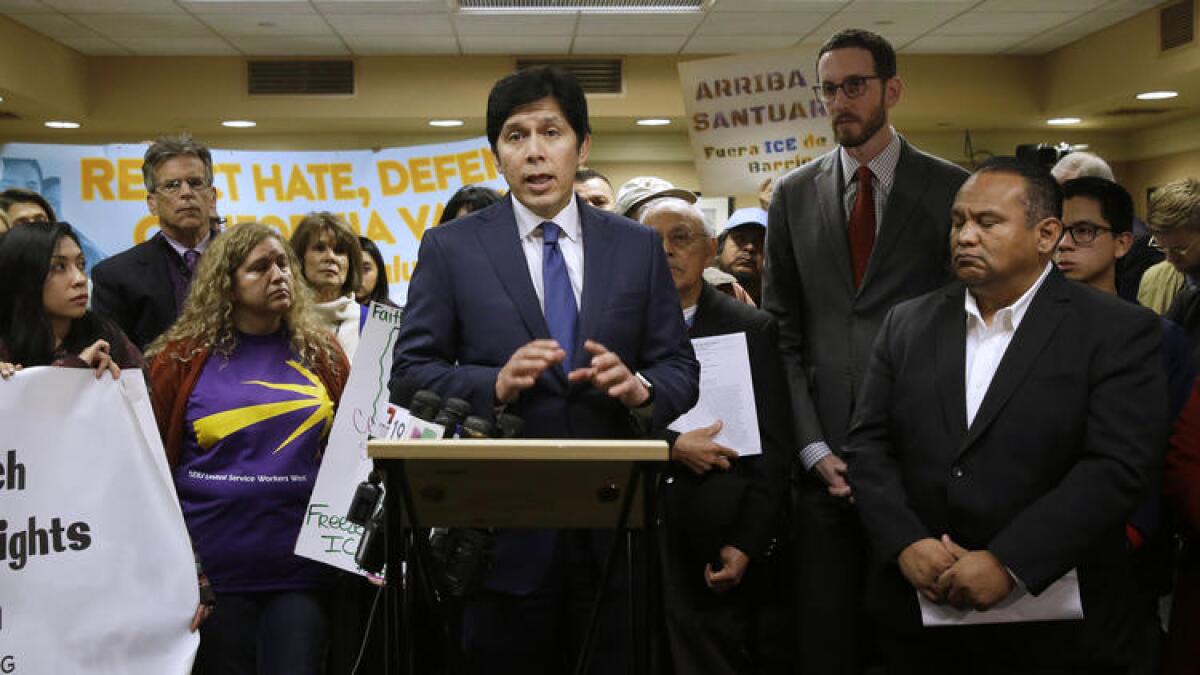
California Senate leader Kevin de León on Tuesday said the Trump administration was downplaying its directive on immigrants targeted for removal from the country, which he said signaled the beginning of mass deportations.
“They are right: the law is the law,” he told CNN anchor Erin Burnett Tuesday. “But the reality is this — that it has never been the custom and practice to go after mothers and fathers, hardworking, law-abiding, tax-paying residents.”
He said new enforcement policies were an “extraordinary departure” from those of the previous administration, when the main focus was on criminal felons.
“I think they are speaking out of two sides of their mouth,” he said of the federal government. “On one end they are really pushing the narrative of the criminal felon, the murderer, but at the same time they have really broadened the criteria to include, without a doubt, nannies, housekeepers, busboys.”
- Share via
Rep. Darrell Issa appears at morning rally and addresses supporters and critics
Telling supporters and protesters gathered outside his Vista office that calm and civil discourse is what America needs now more than ever, Rep. Darrell Issa spent nearly 90 minutes Tuesday morning answering a wide range of questions about the controversial policies of President Trump.
The San Diego Union-Tribune reported that Issa’s impromptu appearance came after weeks of public criticism from many constituents who have held protests outside his office each Tuesday. They accused him of failing to hear their concerns about Trump’s immigration policies and the repeal of Obamacare, among other things, and demanded a face-to-face meeting.
Issa said this was his first Tuesday in town since the weekly protests began.
- Share via
California Senate memorializes one of its own, former state Sen. Tom Hayden

The California Senate on Tuesday remembered one of its own, late former state Sen. Tom Hayden, who spent nearly two decades in the state Legislature after serving as a leading voice in the campaign to end the Vietnam War.
Hayden, who died Oct. 23 in Santa Monica at age 76, is perhaps best known as a counterculture figure who led civil rights and antiwar protests in the 1960s.
But he later served 10 years in the state Assembly and eight years in the Senate, representing a district that included much of West Los Angeles County.
More than a dozen of Hayden’s legislative colleagues, including former Senate President Pro Tem John Burton, attended the ceremony in the packed Senate chambers, which included a lone Irish bagpiper.
“He was one of the great visionaries. He was a guy with a lot of courage,” Burton, the California Democratic Party Chairman, said Tuesday.
Burton recalled one bill of Hayden’s that he said originally seemed “wacky,” but that turned out to help young juvenile offenders get out of a life of crime by providing them with tattoo removal.
Burton has previously described Hayden as a “saint of long shots and hard cases” for taking on legislation that was difficult politically. Hayden said in a self-chronicle of his legislative career that he “tried to push important but controversial issues from the margin into the mainstream.”
Colleagues recalled that Hayden’s approach, which included disdain for trading favors, alienated some Democrats, including former Assembly Speaker Willie Brown, who removed Hayden from a committee chairmanship and transferred him to a smaller office.
“He was a maverick. He was an independent thinker. He was an intellectual. He was a true progressive,” said current Senate President Pro Tem Kevin de León (D-Los Angeles). “He dedicated his life to the betterment of our state and our great country through the pursuit of peace, justice and equity.”
Legislation introduced by Hayden toughened the laws against child labor, domestic violence and the use of date-rape drugs. He also took on major institutions, requiring a new ethics code at the Metropolitan Water District, expanding conflict-of-interest laws at the Los Angeles County Metropolitan Transportation Authority and giving subpoena power to the inspector general of the Los Angeles Unified School District.
Those in attendance at Tuesday’s remembrance ceremony included Hayden’s widow, Barbara Williams, and Troy Garity, Hayden’s son from his previous marriage to actress Jane Fonda, who was also an activist against the Vietnam War. Fonda was not present Tuesday, but attended another memorial Sunday in Los Angeles.
Former colleagues present included former state Sens. Patrick Johnston (D-Stockton) and Liz Figueroa (D-Fremont) and former Assemblyman Charles Calderon (D-Whittier).
Sen. Hannah-Beth Jackson (D-Santa Barbara) said Hayden consulted with her on some of her bills long after she admired him for his street activism against the war.
“He was a rabble-rouser,” she said. “He was raising hell about this war.”
- Share via
California lawmakers say new state agency rules do little to guarantee family visits for jail inmates
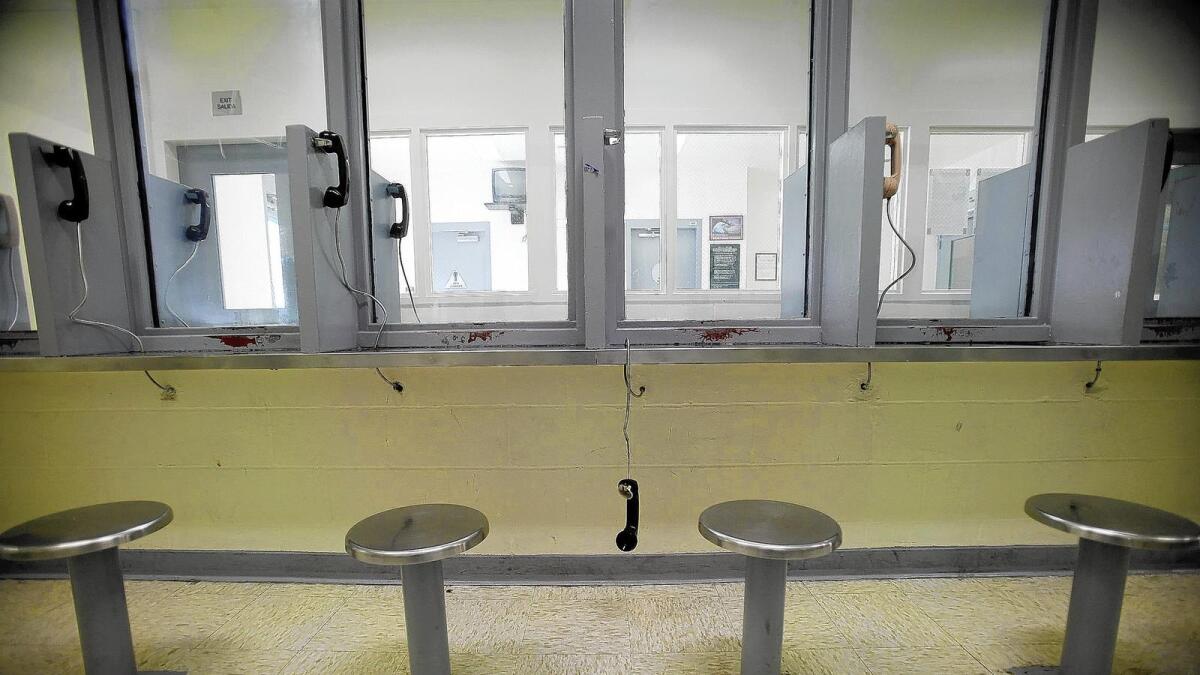
California lawmakers on Tuesday scrutinized new state agency regulations that will allow more county jails across the state to prevent inmates from visiting with their families in person.
The new rules come come almost five months after Gov. Jerry Brown vetoed a bipartisan bill that would have required all county jails in California to provide inmates with the option.
At a joint legislative oversight hearing, public safety subcommittee members suggested the agency regulations went against the governor’s directive and the state’s rehabilitation goals. Allowing more jails to maintain their ban on personal visits, lawmakers said, places a financial burden on inmates and can tear families apart.
“A quarter of our counties will have no in-person visitation is basically what we are saying,” Assemblywoman Shirley Weber (D-San Diego) said. “It is difficult to digest the fact that we would have facilities that have space, and yet refuse to have in-person visitation.”
Over the last five years, an increasing number of jails and prisons across California and nationwide have moved to offer Skype-like video visits through phone and computer screens. But some jails have used the video systems to replace on-site meetings that have traditionally occurred face to face through a glass window.
Sheriffs say the move reduces costs, cuts back on contraband trafficking and increases public safety. Prison advocates and lawyers counter there is no evidence that attests to those benefits.
In rejecting last year’s legislation, Brown said the bill imposed a strict mandate on counties to provide in-person visitation that he could not support. But he directed the Board of State and Community Corrections to develop regulations that local agencies would have to follow to ensure personal visits would not be banned.
It released the rules last week, saying they balanced the need to provide access for families with the need to control costs for local law enforcement agencies.
“The board simply landed at the best compromise landing spot that it could,” Kathleen Howard, the board’s executive director, said at Tuesday’s hearing.
But subcommittee members said the number of counties with at least one institution that provides video-only visitation has increased from 11 to 14 under the new rules. Another nine jails under construction don’t have any space for face-to-face visits.
Some lawmakers considered the possibility of withholding state funding from the building projects that had not broken ground — six facilities — until local officials could guarantee they would have places where inmates would be able to see their families.
Holly Mitchell (D-Los Angeles) said Howard’s statement that the regulations were in keeping with the focus of the vetoed legislation were “curious at best.”
- Share via
California Senate leader puts 100% renewable energy on the table in new legislation
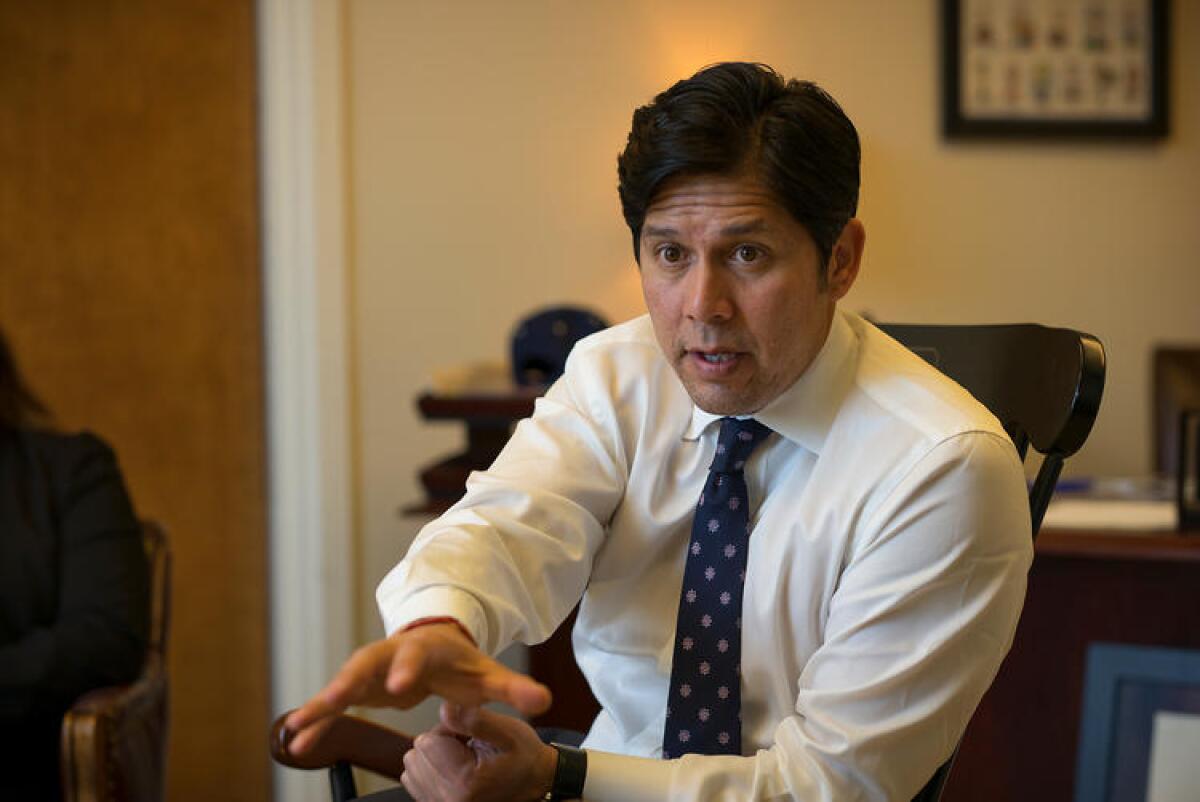
It wasn’t just talk — Senate leader Kevin de León (D-Los Angeles) is proposing legislation that would require California to generate all of its electricity from renewable sources.
The measure, SB 584, was introduced without fanfare before last week’s deadline for new proposals in the Capitol.
If approved, 100% of the state’s electricity would need to come from clean sources such as solar and wind by 2045. De León first suggested the idea in a conversation with The Times last month.
The measure would also accelerate the state’s goal of reaching 50% renewable energy. Legislation approved two years ago set a deadline of 2030, but the new proposal would move that up to 2025.
Hitting those targets would keep California a few steps ahead of New York, which wants 50% renewable energy by 2030, and on par with Hawaii, which is seeking 100% renewable energy by 2045.
- Share via
It’s time for an independent commission on Russian election interference, California Rep. Eric Swalwell says
The United States needs an independent investigation of Russian attempts to influence the 2016 election before voters return to the polls for a national election in 2018, Rep. Eric Swalwell (D-Dublin) said Tuesday.
“We’re getting too close to sweeping this under the rug and losing the opportunity to do something about it,” Swalwell told The Times. “We’re rolling into a midterm election season that’s going to get kicked off pretty soon, and it would be very unfortunate if we started to see more Russian-style influence campaigns start to take place. We owe the American people a report of what happened and recommendations to make sure that it never happens again.”
A report from the U.S. intelligence community in early January found that Russian President Vladimir Putin personally ordered an intelligence operation against the U.S. presidential race and ultimately sought to help Donald Trump win the White House. The Trump administration vehemently denies there was any collusion between the campaign and Russia.
Trump’s national security advisor, Michael Flynn, resigned last week amid revelations he misled Vice President Pence and others in the Trump administration about potentially illegal conversations he had with the Russian ambassador to the U.S. ahead of the president’s inauguration.
Swalwell and Rep. Elijah E. Cummings (D-Md.) have filed legislation to create a 12-person panel evenly divided between Republicans and Democrats to investigate any attempts by the Russian government or by people in Russia to influence the election.
The bill is supported by every member of the House Democratic Caucus. Over the weekend, North Carolina Rep. Walter B. Jones became the first Republican to sign on to the effort.
Swalwell said every House Republican has been asked to join the effort.
“It would be very shortsighted for Republicans to think Russia wouldn’t try to do this again, or that other countries wouldn’t look at this as a opportunity and that our elections are now open season for the most aggressive meddlers,” he said.
The House and Senate intelligence committees are both reviewing Russian interference in the election and what role the campaigns may have played, but Swalwell, who serves on the House committee, said all or some of the results will likely remain classified.
House Intelligence Committee Chairman Devin Nunes (R-Tulare) and other Republicans have said they think the committee’s review will be sufficient.
But Swalwell said a commission could dedicate itself full time to a broad and nonpartisan investigation similar to the one done by the 9/11 commission after the 2001 attack.
“Until we take it out of Congress and look at it in an independent way that can also make recommendations on securing election systems across the country, we are shirking our duty to make sure our democracy functions the next time an election comes around,” he said.
Swalwell said he met with Lee Hamilton, co-chairman of the 9/11 commission, when drafting the legislation. He said Hamilton urged him to keep the wording broad and nonpartisan so that the commission could follow the evidence, not a preconceived expectation.
“We wrote it in a way to give Republicans every opportunity to come on board and not make it a relitigation of the results of the 2016 election,” Swalwell said. “Donald Trump is our president, but if we are concerned about the future we have to say, [as] Republicans and Democrats, we are not going to tolerate this.”
- Share via
California’s voice on campaign money in Washington is packing her bags and heading home
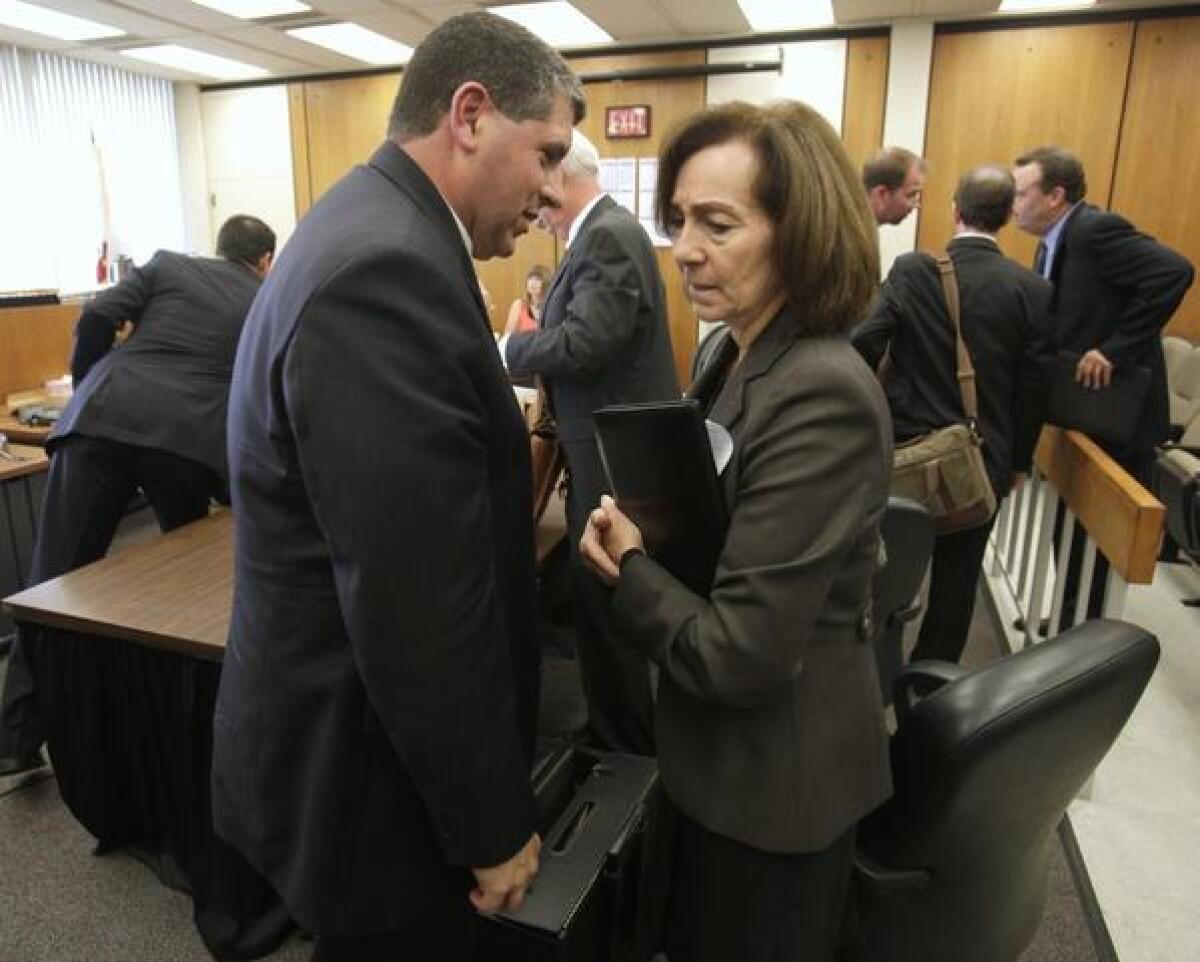
Ann Ravel is headed back home to California, tired of fighting Republicans at the nation’s campaign finance agency and conceding control of the Federal Election Commission to President Trump.
“I compromised, but the other side never would,” the FEC commissioner said in an interview on Tuesday.
Ravel announced her resignation from the FEC over the holiday weekend, posting online a copy of the letter she sent to Trump. She said she has not received any response from the White House, and will leave her post on March 1.
Ravel is the only one of the six FEC commissioners still in an active appointment, with the rest of the bipartisan group still serving until replaced by the president. By law, the commission can’t have more than three members from the same party.
After serving almost three years as chair of the state’s Fair Political Practices Commission, Ravel was tapped by President Obama for the FEC post in the fall of 2013. She said she had hoped to use the national post to apply the lessons learned in Sacramento, including the FPPC’s high-profile case against donations secretly funneled into 2012 statewide ballot measure campaigns.
But the federal commission refused to fairly or consistently enforce the law, she said.
“There are things that are so stark, and so improper, that I was just kind of stunned,” Ravel said.
Ravel plans to teach at the UC Berkeley School of Law in the fall, and said she will be looking for ways to remain engaged on campaign finance issues in California.
- Share via
Will Bernie Sanders endorse his former campaign aide in the race to replace Xavier Becerra in Congress?
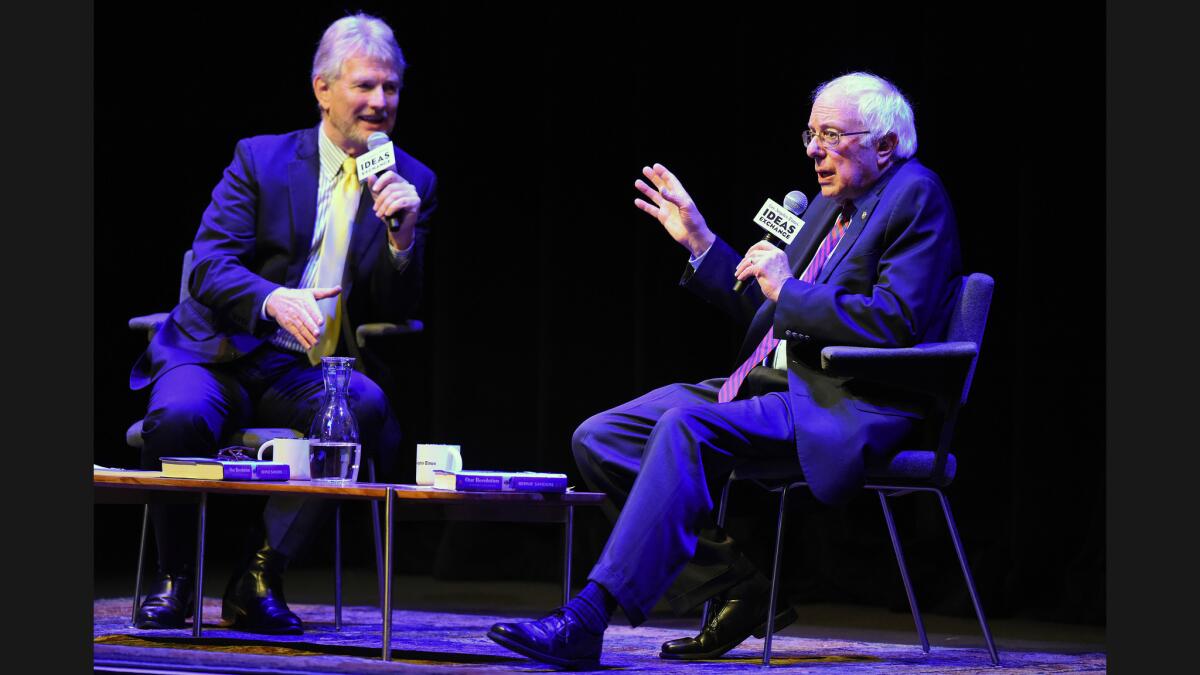
In an appearance at the Theatre at Ace Hotel over the weekend, Vermont Sen. Bernie Sanders spoke about the “totally new political world” as chants of “Bernie 2020” rang out in the soldout event.
But at least one audience member was interested to know Sanders’ thoughts on the 34th Congressional District, where former Sanders campaign aide Arturo Carmona is running to replace former Rep. Xavier Becerra, who is California’s new attorney general.
“What about 34?” came the shout from the audience as Sanders was being interviewed by Los Angeles Times political cartoonist David Horsey as part of the Times’ Ideas Exchange series.
Horsey picked up the question, asking if Sanders was getting involved in the crowded race, in which 23 candidates are vying. Neither Sanders nor Our Revolution, the political group he helped start, has indicated whether it will endorse.
“Arturo is a good friend of ours,” Sanders said. “He helped me during the campaign, and he and I just chatted tonight, so we’lll see where we go with that.”
Carmona has often talked about his connection with Sanders on the campaign trail, and often posts photos and quotes from the senator on social media.
Carmona is not the only candidate claiming to represent the progressive movement started by Sanders.
Wendy Carrillo, an activist and former journalist who spent weeks at the Standing Rock pipeline protest, and Kenneth Mejia, an accountant who said he was inspired to register to vote for the first time last year by Sanders, have also invoked his name in their campaigns.
- Share via
If Republicans in Washington scrap the estate tax, one California state lawmaker wants to bring it back

New legislation at the state Capitol seeks to ensure that the heirs of California’s wealthiest residents pay taxes on estates they inherit, even if the federal law is scrapped by President Trump and Congress.
The bill, introduced by state Sen. Scott Wiener (D-San Francisco), would ask California voters to keep in place an estate tax that generated $4.5 billion in 2015. The proposal would have to go to voters because a state-level estate tax was prohibited in a pair of 1982 ballot measures.
But Wiener insists that his tax would take effect only if GOP leaders in Washington repeal the federal law.
“If Donald Trump and congressional Republicans are hell-bent on cutting taxes for our wealthiest residents, we should counter-balance those tax cuts by recapturing the lost funds and investing them here at home in our schools, our healthcare system, and our roads and public transportation systems,” Wiener said in a written statement.
The tax applies only to estates valued at $5.5 million or above. The money currently goes to the U.S. treasury — part of the federal-state relationship that’s been the focus of discussion and criticism since Trump assumed office last month. If the money went to California instead, it could provide substantial new dollars to state programs.
Two separate bills to repeal the federal tax are pending on Capitol Hill.
- Share via
After picking up California support, Rep. Keith Ellison gets more Western Democrats to back him for party chair
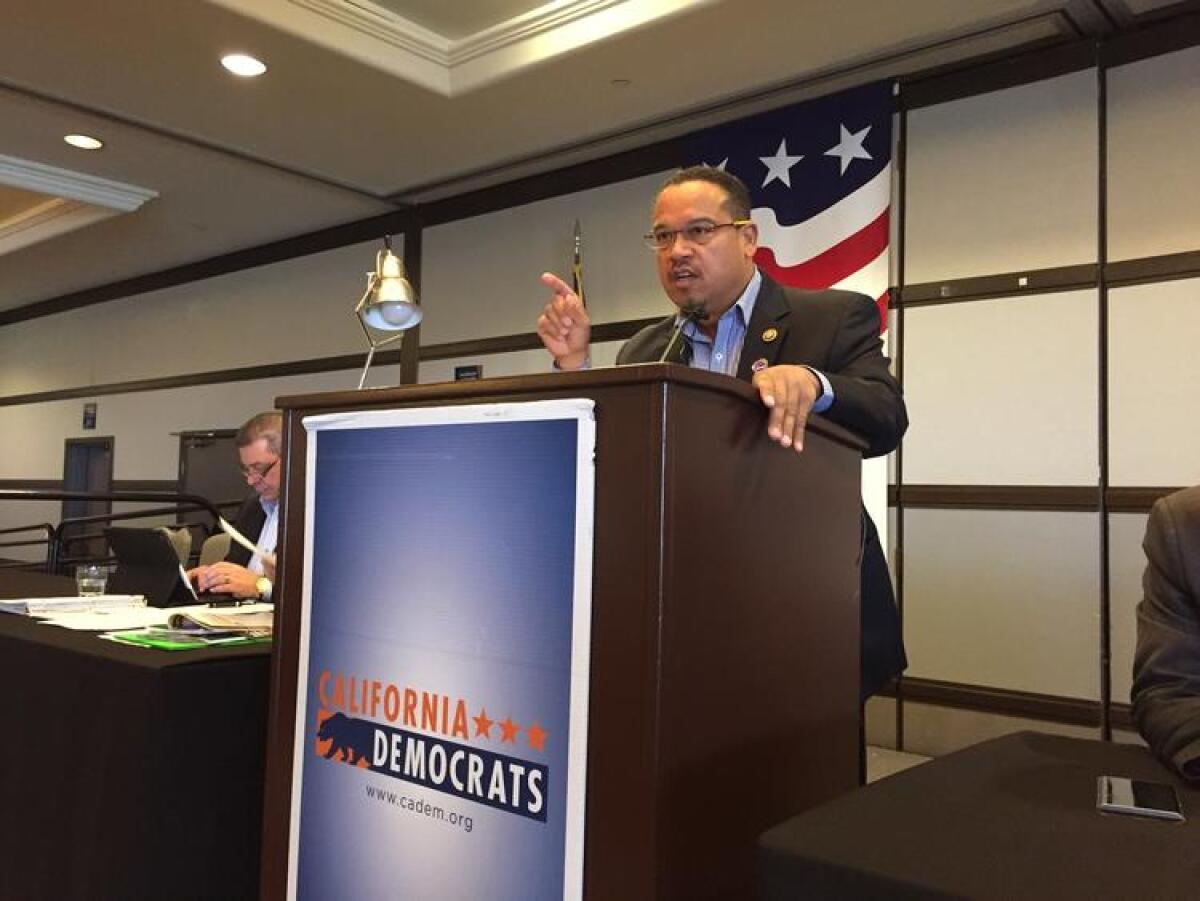
Democratic National Committee chair candidate Rep. Keith Ellison is trying to build on his support in California by rallying other Democrats in Western states.
Tina Podlodowski, chair of the Washington State Democratic Party, will formally announce on Monday she’s backing Elllison, who is from Minnesota.
“Not only is he committed to competing in every county, providing the resources we need, and focusing on turning out the vote, he has a proven track record of doing each of those things in Minnesota,” she said.
With less than a week until Democrats gather in Atlanta to choose their next national party chairman, leading candidates are angling for an edge in the campaign.
Also on board is Alexis Tameron, the Democratic chair in Arizona, a traditionally Republican state that has long been on the party’s wish list as demographics there change.
The race will be decided by only 447 members of the Democratic National Committee, but it could have long-term consequences. Whoever wins will be in charge of rebuilding the party while President Trump is in the White House.
Ellison is backed by Sen. Bernie Sanders and is viewed as the more progressive candidate in the race, while Tom Perez has garnered some significant establishment support. The former Labor secretary under President Obama is backed by former Vice President Joe Biden.
Although the AFL-CIO endorsed Ellison, several affiliates of the union are backing Perez. The latest is the the International Brotherhood of Boilermakers, Iron Ship Builders, Blacksmiths, Forgers and Helpers.
Perez has also been endorsed by Los Angeles Mayor Eric Garcetti.
- Share via
Bernie Sanders in Los Angeles: ‘We can defeat Trump and Trumpism’
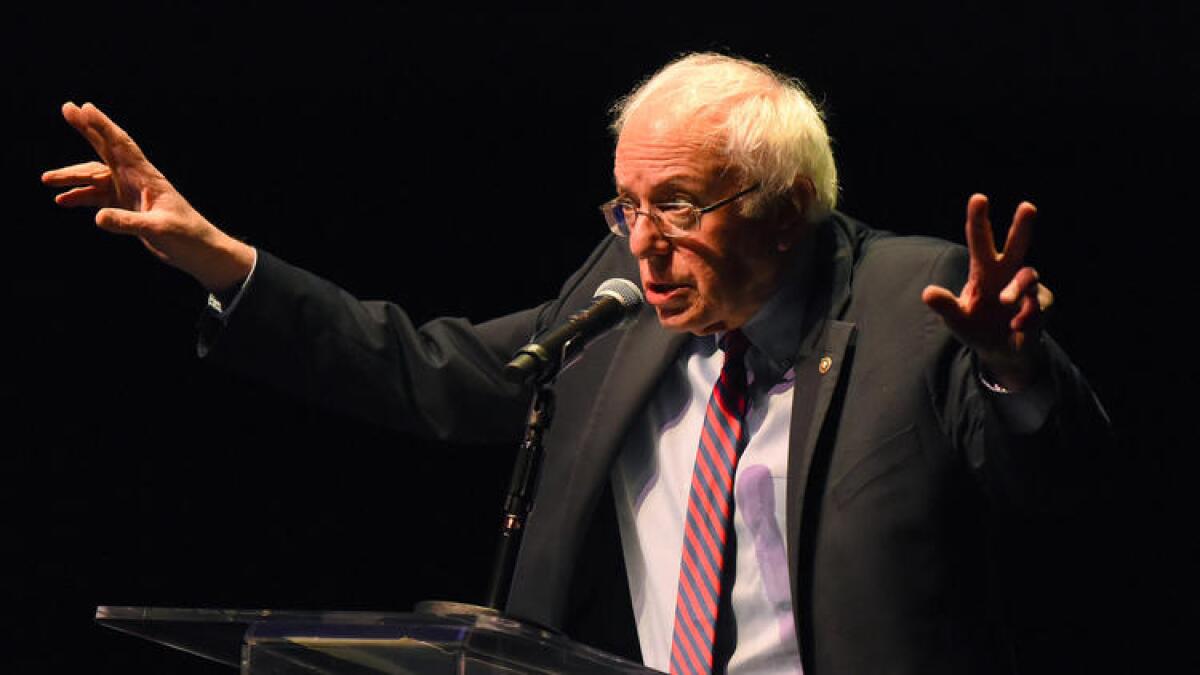
Vermont Sen. Bernie Sanders got a rock star’s welcome when he spoke in downtown Los Angeles on Sunday in what was theoretically a book tour stop but amounted to more of a political rally, urging progressives to play by new rules as they resist President Trump’s administration.
“We are looking at a totally new political world,” he said. “If we play by the old rules, we will lose and they will win. Our job is not to play by the old rules.”
- Share via
Bernie Sanders thanks his California supporters and says Donald Trump has a ‘mandate for nothing’
Vermont Sen. Bernie Sanders spoke Sunday at the Theatre at the Ace Hotel as part of Los Angeles Times Ideas Exchange in what quickly became a political rally reminiscent of his primary campaign through California last year.
Sanders was met with applause from the audience as well as occasional chants of “Bernie 2020.”
There was even a fake Bernie Sanders in the audience.
- Share via
Uber would have to allow drivers to collect tips from credit cards under a new California bill
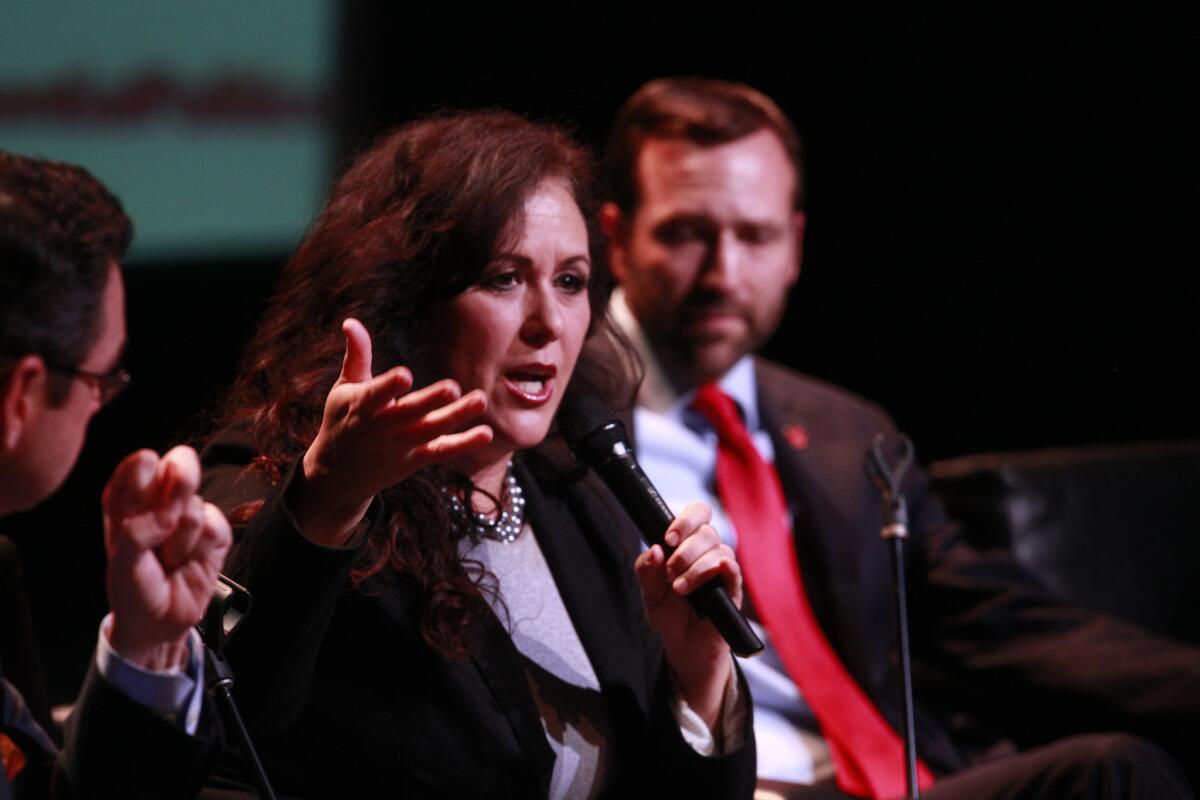
Uber drivers will be allowed to receive tips from passengers through the company’s credit-card-based app through new state legislation introduced Friday.
Assembly Bill 1099 from Assemblywoman Lorena Gonzalez Fletcher (D-San Diego) would force companies, such as Uber, that accept payments with credit cards to allow users of the service to tip workers with credit cards as well. Currently, Uber only allows its drivers to receive tips in cash.
“To only accept tips by cash is tough on the driver,” Gonzalez Fletcher said in an interview.
The legislation wouldn’t only apply to the ride-hailing industry — Uber’s rival Lyft already allows drivers to receive tips through its app — but also nail salons, spas and all other businesses accepting credit card payments.
Gonzalez Fletcher said her measure was the first step in what could ultimately be a broader bill that would allow workers in the so-called gig economy to organize. Negotiations between the ride-hailing industry and labor unions were ongoing, she said, and she hoped an agreement could be reached on issues such as workers compensation, unemployment and Social Security benefits.
Last year, Gonzalez Fletcher pulled a bill that would have allowed gig economy workers to collectively bargain, saying the matter needed more study. She still plans to advance collective bargaining rules to Gov. Jerry Brown prior to his leaving office in 2018.
“It’s one hurdle at a time,” she said.
- Share via
California’s top elections officer finds his critique of Trump’s voter fraud accusations blocked at national meeting
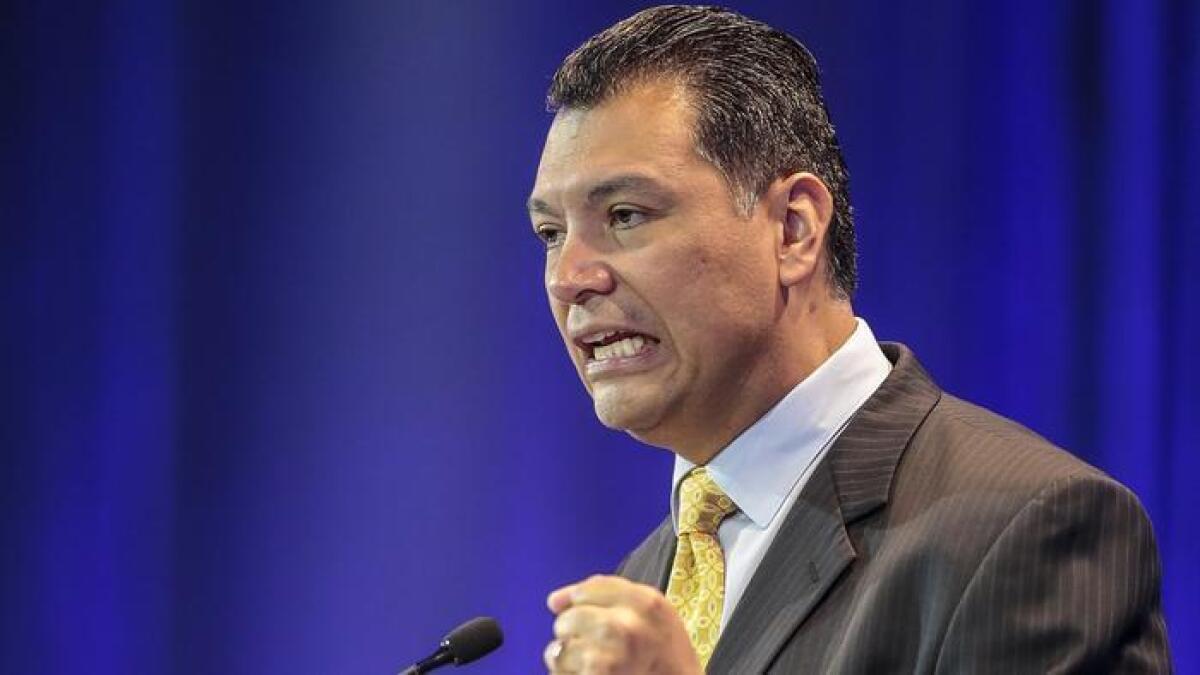
Secretary of State Alex Padilla, one of the most vocal critics of President Trump’s unproved accusations of voter fraud, lost in an effort Friday to convince other elections officials to take a stand on the issue.
Padilla, attending a conference of the National Assn. of Secretaries of State, had drafted a resolution calling Trump’s repeated allegations of widespread illegal voting “without merit” and urging the president to “cease his baseless allegations about voter fraud.”
But he was blocked at the last minute from introducing the resolution at the Washington gathering, even though the bipartisan organization issued a statement last month disputing Trump’s comments. The president’s assertions, never backed up with any specific information, have included the election results certified in California.
”It’s shocking that secretaries of state from both sides of the aisle don’t want to stand up and defend our credibility,” Padilla said in a phone interview Friday.
A majority of the members of the association are Republicans, and Padilla’s resolution sparked the circulation of an alternative and unsigned proposal that claimed “overwhelming” evidence of illegal voting. It urged Trump to “establish a voter fraud task force to root out fraud where it exists in some states.” The president said earlier this month that Vice President Mike Pence will lead such an effort.
Neither resolution was ultimately heard or endorsed.
Padilla said he had been willing to modify his resolution if Republicans didn’t want to directly criticize the president, but he was rebuffed.
”Clearly they didn’t want to go on record by casting a vote on our resolution,” he said.
- Share via
New legislation will call for more inspections at Oroville Dam
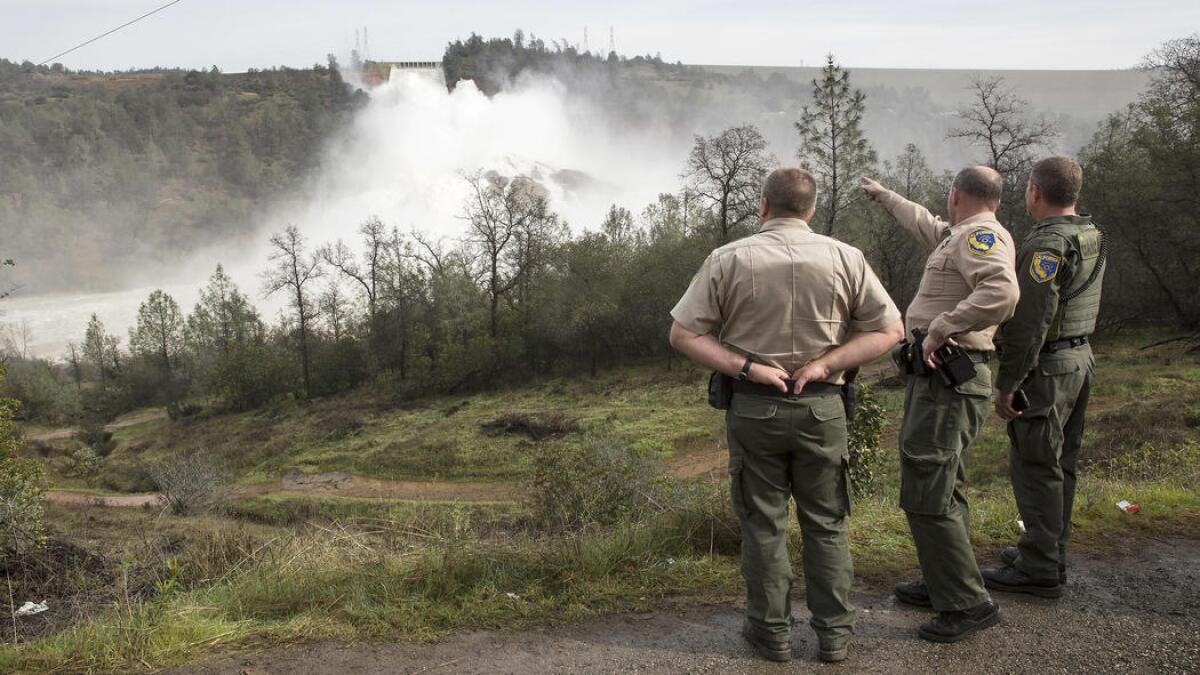
A Bay Area lawmaker said Friday he plans to introduce new legislation to require more detailed inspections of all state-run dams in California in the wake of a crisis at the Oroville Dam that caused last week’s evacuations over flood concerns.
Assembly Bill 884 from Assemblyman Marc Levine (D-San Rafael) will mandate annual inspections of all spillways at dams, and require the California Department of Water Resources to update all its operations manuals and procedures.The Oroville Dam has been using manuals that haven’t been revised since 1970, two years after the dam’s construction, and do not take into account climate change and other new information, according to Levine’s office.
“Visual inspections and outdated manuals are not good enough when the potential failure put people’s lives in danger, causes the evacuation of 200,000 people and places California’s water supply at risk,” Levine said in a statement. “As California’s water infrastructure ages, the Department of Water Resources must take annual inspections of vital infrastructure seriously because people’s lives are at risk.”
Last weekend, the Oroville reservoir exceeded its capacity, sending water down an emergency spillway for the first time in the dam’s history. Erosion fears at the spillway prompted regulators to order evacuations for Oroville and surrounding cities and prompt emergency repairs.
- Share via
State Senate leader calls new EPA chief ‘profoundly unfit’ for office
- Share via
California lawmaker proposes bill that would create a single-payer healthcare system in the state
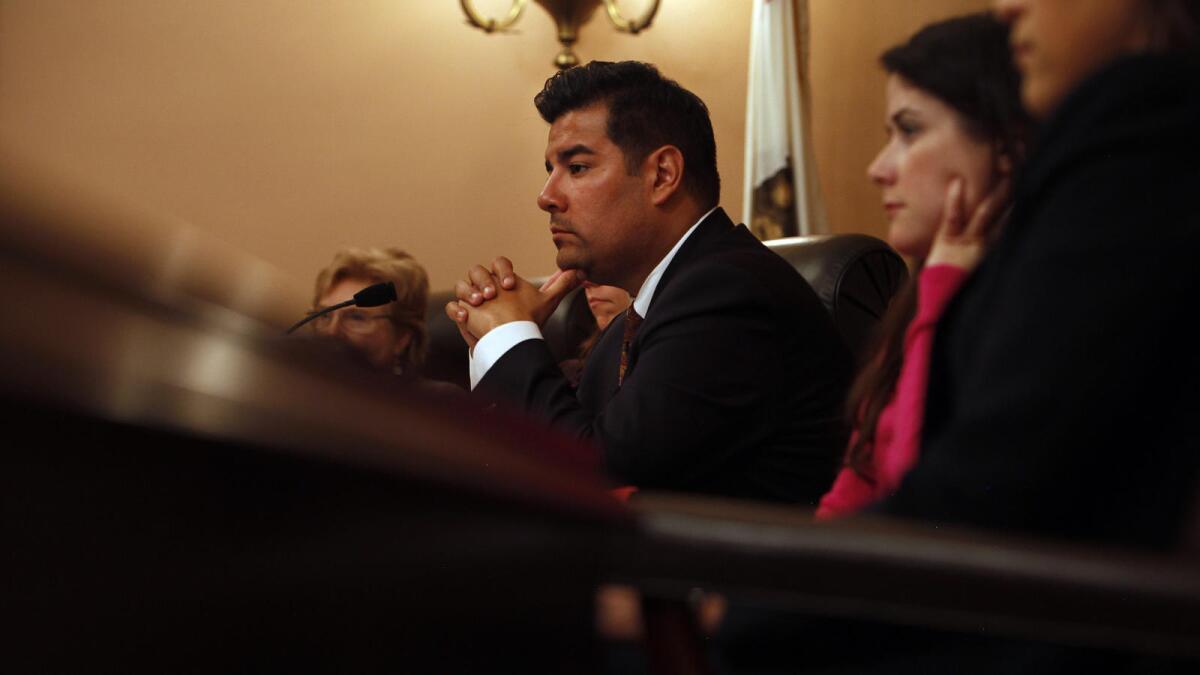
State Sen. Ricardo Lara (D-Bell Gardens) on Friday introduced a bill that would create a single-payer healthcare system in California.
Lara said that although the federal Affordable Care Act expanded health coverage, medical care is still too expensive, even for those with insurance, and the law excludes immigrants in the country illegally.
“We have reached a pivotal moment where there’s a threat to healthcare,” Lara said. “I felt it was important that we create a different narrative here in California.”
A single-payer system would be a complete overhaul of the healthcare system. In such a system, one state agency would manage the financing of everyone’s healthcare. Most likely, employees and employers would be taxed and the state agency would combine that money with the funds California currently has for Medicaid, Medicare and other health programs. When people would seek medical care, the state would cover the bill.
Single-payer legislation has been introduced many times in the state. The Legislature became the first in the country to pass a single-payer bill in 2006, but it was vetoed by then-Gov. Arnold Schwarzenegger.
RoseAnn DeMoro, head of the California Nurses Assn. and a longtime supporter of a single-payer system, said she thinks the disarray in Washington around the proposed repeal of the Affordable Care Act makes now the perfect time to switch to a single-payer system.
“We’re hoping it sails through and we can introduce the same healthcare system to America,” she said.
- Share via
Republicans in the California Assembly propose bills they say will limit voter fraud — including showing a photo ID
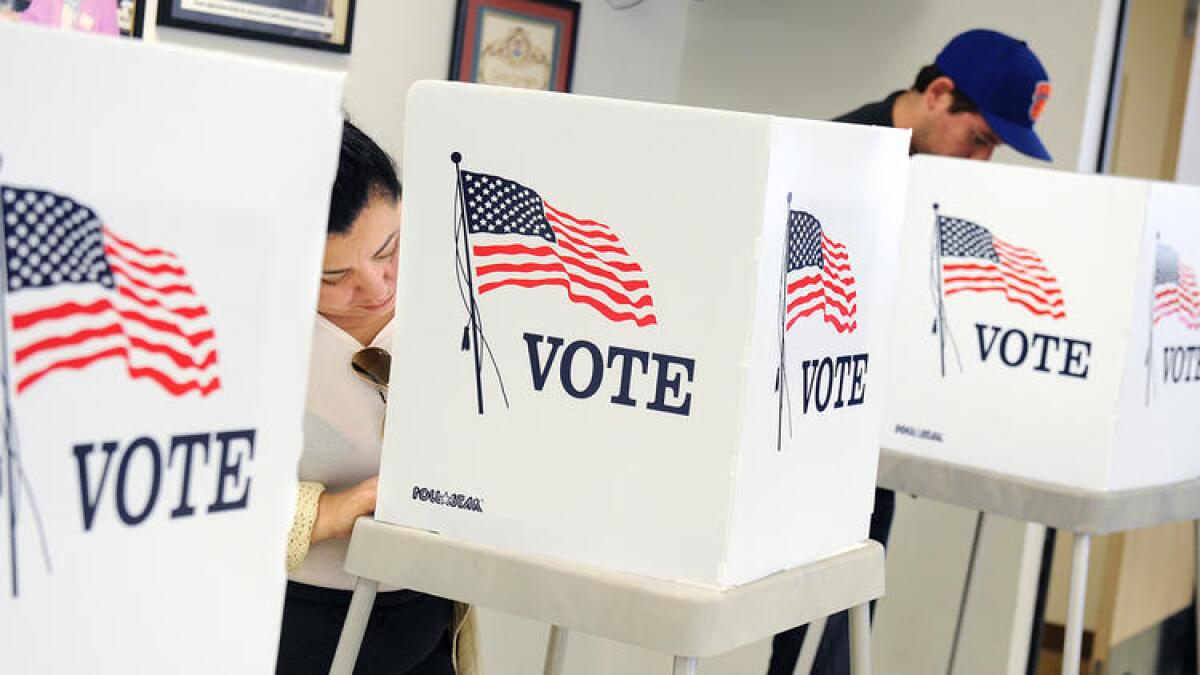
Republicans in the state Assembly introduced a variety of bills on Thursday that they said would limit instances of voter fraud in California, weeks after President Trump’s unproven accusations of widespread problems in the state and elsewhere.
The most high-profile effort is a bill to require that Californians show a photo ID card before casting a ballot at the polls.
“Any time a vote is fraudulently cast, it negates a legitimate vote by an honest citizen,” said Assemblyman Travis Allen (R-Huntington Beach), the author of the bill. “This legislation is a common-sense measure to ensure that every citizen’s vote is protected.”
A survey by the National Conference of State Legislatures found that 32 states had voter ID laws in place for last year’s election. California’s current law hinges on providing a signature to check voter identification at the polls.
Another bill introduced this week seeks to increase the penalties against people who illegally vote by mail. The proposal by Assemblyman Matthew Harper (R-Huntington Beach) would raise the fine for a fraudulent signature to $10,000, a tenfold increase.
The legislative efforts come on the heels of Trump’s continued assertions of widespread voter fraud in California and other states. Elections officials have rejected the president’s accusations.
- Share via
Sen. Dianne Feinstein to raise money in Los Angeles for her reelection bid
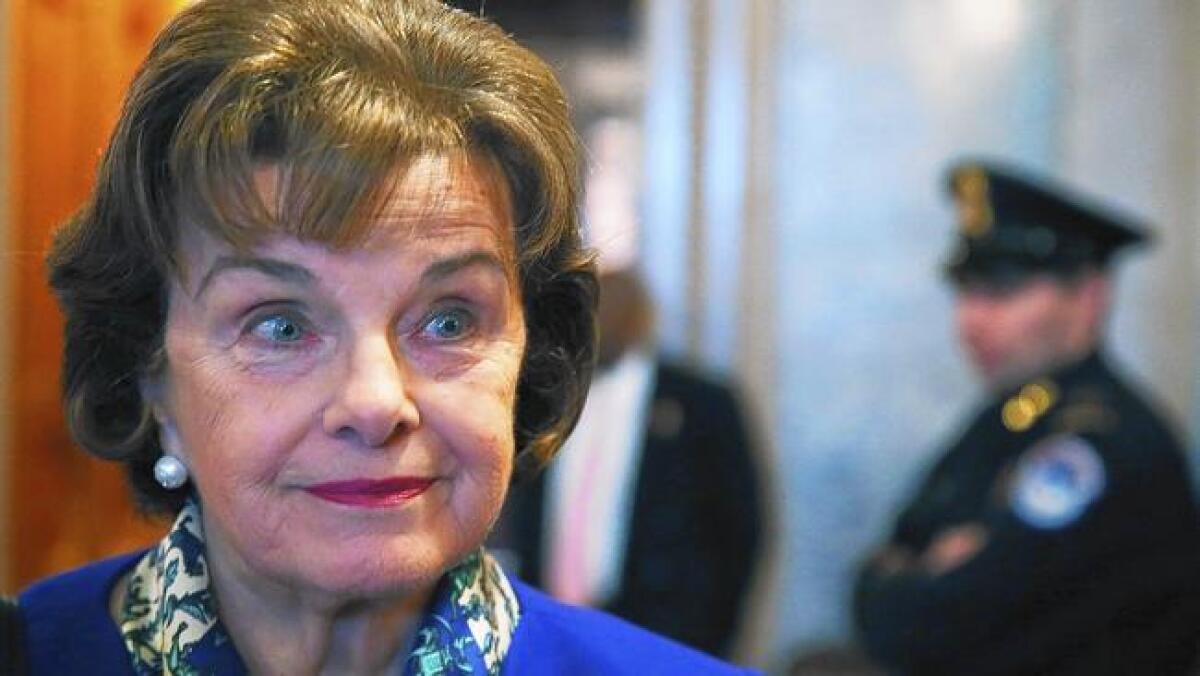
Sen. Dianne Feinstein will raise money on March 17 in Los Angeles for her 2018 reelection campaign.
Donors are being asked to contribute or raise up to $10,000 to attend the luncheon at the Hancock Park home of Jon Vein, the co-founder of a software company and a former Hollywood executive who was a member of Hillary Clinton’s national finance committee during her unsuccessful 2016 presidential campaign.
Among the hosts of the fundraiser are former U.S. Commerce Secretary Mickey Kantor; former Reps. Mel Levine and Howard Berman; former U.S. ambassadors John Emerson and Nancy Rubin; former Los Angeles County Supervisor Zev Yaroslavsky and former Los Angeles City Councilwoman Roz Wyman.
Feinstein, 83, has not officially announced that she will seek a fifth term. She recently had a pacemaker installed, leading to speculation among California Democrats eyeing her seat. But she hinted that she does plan to seek reelection in a recent radio interview.
- Share via
California joins brief challenging travel ban to support Iraqi pair who worked for the U.S. government
California has joined a third amicus brief in support of a lawsuit challenging President Trump’s travel ban, this time backing two Iraqi visa holders who were detained by officers at New York’s John F. Kennedy International Airport despite having done work for the U.S. government.
State Atty. Gen. Xavier Becerra joined the friend-of-the-court brief filed in federal court in New York supporting the lawsuit by Hameed Khalid Darweesh and Haider Sameer Abdulkhaleq Alshawi.
The two men had been threatened with violence in Iraq due to work they and their families did for the U.S. government, Becerra said. Darweesh was denied entry while holding an Iraqi Special Immigrant Visa for which he was eligible due to his work as an interpreter and engineer for the U.S. in Iraq from 2003 to 2011.
Alshawi was denied entry despite holding a “Follow to Join” visa in order to join his spouse and child, who are lawful permanent U.S. residents living in Houston.
“People who risked their lives by helping us in Iraq — and have undergone extensive vetting to come to the United States — deserve better,” Becerra said in a statement after joining 14 other states in filing supportive briefs in the case.
“When individuals stick their neck out for the United States, we should reward them by showing them that we have their back,” he added. “No patriotic American would expect anything less.”
- Share via
After clamoring for answers from immigration officials, Democrats say they were told arrests will be broad
Democrats in Congress say Immigration and Customs Enforcement officials told them Thursday the agency plans to employ a broader brush in making immigration arrests, armed with a new executive order from President Trump.
“They said that we can and should expect many more arrests and removals this year,” House Democratic Caucus vice chairwoman Linda Sanchez (D-Whittier) said Thursday. “I wish I had better news for our communities in this country, but unfortunately the administration has taken a turn from where our past commitment to immigrant communities has been.”
The Times reported last week that up to 8 million people could be deported under Trump’s immigration orders.
Democrats and Republicans in House leadership met in a closed-door meeting with Acting ICE Director Thomas Homan to talk about last week’s immigration raids in Los Angeles and other cities, which netted nearly 700 people across the country last week.
Democrats have complained about getting little or conflicting information about who was targeted in the raids that have panicked many in the immigrant community. Still unclear, they say, is exactly how the Department of Homeland Security will enforce Trump’s executive order, which allows almost any immigrant living in the U.S. illegally to be targeted for deportation. Though deportations rose under President Obama, previous administrations have focused on removing people who had committed violent crimes.
Sanchez said she left the meeting believing “they are only constrained by the resources that they have in terms of who the priority is.”
The agency characterized last week’s raids as routine, but immigrant advocacy groups say they went beyond the norm by arresting people without a violent criminal history.
According to a description of the meeting provided by an ICE spokeswoman, Homan told members the agency is targeting people based on law enforcement tips. But they’ll also sweep up immigrants in the country illegally if they encounter them while making the targeted arrests.
Rep. Zoe Lofgren (D-San Jose) said some of the crimes arrested immigrants had committed included trespassing and traffic violations, along with serious felonies. ICE also provided a list of 112 people who were arrested but had no criminal history.
House Speaker Paul Ryan’s office hosted the meeting. His spokeswoman said it was “limited to members with jurisdictional interests in immigration enforcement” at the Homeland Security Department’s request.
Rep. Michelle Lujan Grisham (D-N.M.) was allowed to attend to represent the Congressional Hispanic Caucus, which she chairs, but was told other members weren’t invited. The caucus had a meeting scheduled with Homan on Tuesday that was abruptly canceled.
Several California members who could not get into Thursday’s closed meeting said it was unacceptable and waited outside. California’s Rep. Norma Torres (D-Pomona), who emigrated from Guatemala as a child, said she knew she wasn’t invited but came anyway. She was asked to leave by Judiciary Committee Chairman Bob Goodlatte (D-Va.).
Homan said he would have an additional meeting with the entire caucus, Lujan Grisham said, but it hasn’t been scheduled.
- Share via
California lawmaker raises possibility of delaying licensing of recreational marijuana sales
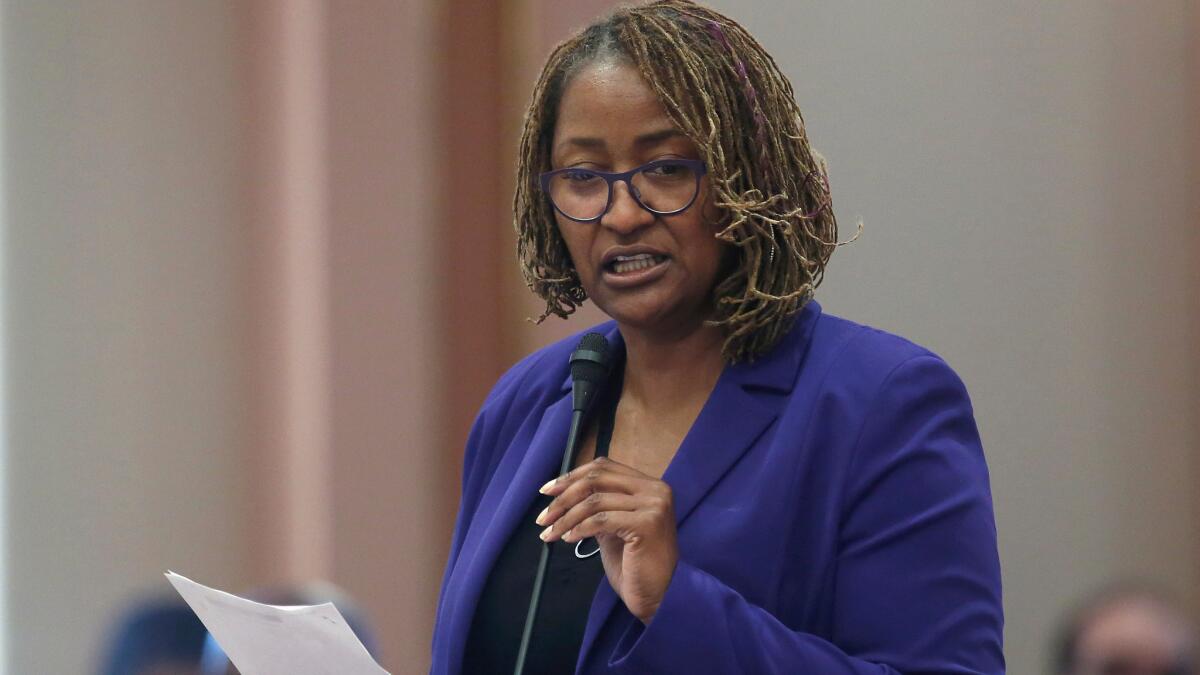
Amid concerns that California may not be ready to issue licenses for the sale of marijuana by next year, one state lawmaker raised the possibility Thursday of the Legislature stepping in to delay taxes and permits.
At a hearing Thursday, the Senate Budget and Fiscal Review Committee heard testimony from Legislative Analyst’s Office representatives who said it is unclear whether the Trump administration will enforce federal laws that designate pot as an illegal drug, complicating California’s rollout of Proposition 64, which legalized the sale of marijuana for recreational use.
State Sen. Holly Mitchell (D-Los Angeles), chairwoman of the committee, said she was concerned about banks being unwilling to handle marijuana sales revenue because the drug is still illegal under federal law, which could require license holders to transport large amounts of cash to pay state taxes and fees.
“Does the Legislature have the authority to delay implementation of either the tax collection or the Jan. 1 due date with regard to licensing?” Mitchell asked attorneys at the hearing. “Do we have the authority to pause this process given its complexity, given the lack of clear sense of direction from the federal government at this point?”
Proposition 64 sets an excise tax at 15% for the sale of marijuana, but the state can delay collection of the tax while it puts in place a secure system for handling large amounts of revenue, according to Richard Miadich, an attorney who helped write the initiative.
The initiative requires the state to issue licenses for the sale of marijuana for recreational use by Jan. 1, 2018. But the state could decide to issue provisional licenses until it is ready to implement the detailed process for background checks and issuing more permanent licenses, Miadich said.
The panel took no action Thursday.
State finance officials estimate 4.8 million Californians will buy pot at the start of the new legalization system, with taxes to the state growing from $600 million in two years to nearly $1 billion by fiscal year 2021-22.